GRAMMAR HELPER 1
Batia Elazar, Ronit Broder
University Publishing Projects.
ISRAIL, 2005
בשלושה כרכים
כרך ראשון
עמודים xi
עמודי דפוס 5-70
עמודי בראיל 1-101
העתיקה: מרים הרמן
הספריה המרכזית לעיוורים
נתניה ישראל 2008
GRAMMAR HELPER 1
is the first in a series of grammar books for the Foundation and Intermediate Levels and is intended for pupils at the Grade 5 level.
GRAMMAR HELPER 1
covers all the grammar points needed at Grade 5 level:
- the present tense of to be and to have
- there is and there are
- singular and plural forms of nouns
- prepositions of time and place
- all the forms of the present simple and present progressive
- the use of a and the
- the possessive
emphasizes sentence structure
- practice in ordering words in sentences
- practice in using correct punctuation (capital letters; periods, question marks)
contains two review units packed full of practice
- in the middle and at the end of the book
speaks directly to pupils
- Welcome Letter in Hebrew describes differences between English and Hebrew
- rules and explanations in Hebrew
- clear-examples in English
- vocabulary kept simple with lots of cognates
- friendly approach and lively illustrations
has a wide variety of carefully graded practice!
Answer key available
WELCOME TO THE WORLD OF ENGLISH
ברוכים הבאים לעולם האנגלית
האם אתם יודעים איזו שפה היא השימושית ביותר בעולם? נכון, צדקתם - אנגלית!
אנגלית היא שפה בינלאומית. היא מדוברת בכל העולם. אפשר לתקשר באנגלית כמעט בכל מדינה בעולם. אתם כבר מבינים, אם כן, עד כמה יעזור לכם לשלוט באנגלית. אבל חשוב לדעת שמבנה השפה האנגלית שונה ממבנה השפה העברית. הבה ונראה מהם ההבדלים הבולטים ביותר בין אנגלית לעברית.
האלף-בית האנגלי
באלף-בית האנגלי ישנן 26 אותיות, מהן 21 אותיות עיצוריות - consonants (כאשר מבטאים עיצור, האוויר נעמד בחלל הפה או בשפתיים). ישנן גם חמש אותיות תנועה - vowels (a,e,i,o,u) הן דומות לאותיות ניקוד בעברית. השימוש ב-vowels דומה לשימוש באותיות ניקוד בעברית. ההבדל הוא שבאנגלית בכל מילה חייבת להופיע אות ניקוד אחת לפחות.
אותיות גדולות ואותיות קטנות
באנגלית שלא כמו בעברית, לכל אות יש שתי צורות, אחת גדולה ואחת קטנה. בפרק 1 תלמדו מתי משתמשים באותיות גדולות.
the / a / an
בפרק 2 תלמדו שבאנגלית שם עצם ביחיד לא יכול להופיע לבד. בדרך כלל יופיע לפניו אחת מהמילים הבאות: the / a / an.
שמות עצם ברבים
באנגלית הופכים את רוב שמות העצם לרבים על ידי הוספת האות s (a boy - boys). על הכלל הזה ועל היוצאים מן הכלל תלמדו בפרק 7.
שם התואר
באנגלית שם התואר בא לפני שם העצם שאותו הוא מתאר. לדוגמה: ילד טוב - a good boy. והנה משהו שהוא קל יותר באנגלית - שם התואר מתאים גם לזכר וגם לנקבה, גם ליחיד וגם לרבים. אין צורך לשנות אותו. ראו דוגמאות בפרק 6.
שמות גוף
בעברית קיימים 10 שמות גוף (אני, אתה וכו') ובאנגלית קיימים רק 7. שם הגוף you פירושו אתה, את, אתם, אתן. ישנו שם גוף באנגלית שאינו קיים בעברית - it המתיחס לדומם ולבעלי חיים ביחיד. It דומה למילה "זה" בעברית. בפרק 3 תלמדו על זה בהרחבה.
זהו - הגיע הזמן לגשת לעבודה!!!
תלמידים יקרים, אנו מאחלים לכם שימוש מועיל ומהנה בספר!
בהצלחה!!!
תוכן כרך ראשון
(התוכן ערוך כך: שם הפרק עמוד דפוס עמוד בראיל)
Unit 1: Capital Letters 5 1
Unit 2: A / An and The 9 8
Unit 3: Pronouns 15 19
Unit 4: To Be - am, is, are 24 31
Unit 5: Prepositions of Place 45 66
Unit 6: Adjectives 55 76
Unit 7: Singular - Plural 62 86
תוכן הספר
(התוכן ערוך כך: שם הפרק עמוד דפוס)
Unit 1: Capital Letters 5
Unit 2: A / An and The 9
Unit 3: Pronouns 15
Unit 4: To Be - am, is, are 24
Unit 5: Prepositions of Place 45
Unit 6: Adjectives 55
Unit 7: Singular - Plural 62
Unit 8: There is / There are 71
Unit 9: Review 81
Unit 10: Have / Has 87
Unit 11: Possessive 98
Unit 12: Present Simple 104
Unit 13: Prepositions of Time 129
Unit 14: Present Progressive 138
Unit 15: Wh Questions 158
Unit 16: Final Review 168
Final Test 180
*5*
באנגלית, שלא כמו בעברית, משתמשים בשני סוגים של אותיות: אותיות קטנות (small letters) ואותיות גדולות .(capital letters)
Aa Bb Cc Dd Ee Ff Gg Hh Ii Jj Kk Ll Mm Nn Oo Pp Qq Rr Ss Tt Uu Vv Ww Xx Yy Zz
מתי משתמשים באותיות גדולות?
- בתחילת משפט האות הראשונה של המילה הראשונה היא תמיד אות גדולה.
There are tigers in the zoo.
- שם הגוף I (אני) מופיע תמיד באות גדולה, בכל מקום במשפט. (אתם חשובים ומגיע לכם שיכתבו את המילה I באות גדולה, נכון?)
Dan and I are good friends,
- בתחילת שמות פרטיים ושמות משפחהBen Cohen :
- בתחילת שמות של מקומות (רחובות, ערים, ארצות וכו')
New York, Jaffa Street, Tel Aviv, Israel
- בתחילת שם לאום: Israeli, American
- בתחילת שמות של שפות: Arabic, English, Hebrew:
- בתחילת שמות הימים והחודשים: Sunday, September
- בתחילת תואר לפני שם משפחה: Mr. (Mister), Dr. (Doctor), Miss
- בתחילת שמות של בתי ספר, ארגונים, חברות, מותגים ואתרים:
MacDonald’s, Coca Cola, Google
- בתחילת כל מילה בשמות של סרטים, הצגות, שירים, ספרים וסיפורים:
Little Red Riding Hood, Harry Potter
*6*
1 Circle the words that begin with a capital letter. Write why they have capital letters.
הקיפו בעיגול את המילים המתחילות באות גדולה. כתבו מדוע יש צורך באות גדולה.
1. Shiri Gal is my friend.
שם פרטי ושם משפחה
2. I live at 15 Yarden Street, Holon.
--
3. My birthday is in January.
--
4. Israel is a small country.
--
5. Mr. Green is a tall man.
--
6. Dr. Sivan is a good doctor.
--
7. This is Tavor School.
--
8. The teacher is here.
--
9. Everybody knows, “Happy Birthday”:
--
10. Volvos are good cars.
--
2 Rewrite these sentences. Put in the capital letters.
כתבו מחדש את המשפטים הבאים. השתמשו באותיות גדולות היכן שנדרש.
1. this is my pen.
This is my pen.
2. my dog’s name is rex.
--
3. i have a cat.
--
4. gila is a good friend.
--
5. london is a big city.
--
6. do you speak english?
--
7. my sister’s birthday is in april.
--
8. i go to revivim school.
--
*7*
3 Rewrite this paragraph. Put in the capital letters.
כתבו מחדש את הפיסקה הבאה. השתמשו באותיות גדולות היכן שנדרש.
galit is my best friend. she lives in tel aviv. we meet every week. we usually meet on thursdays. next week is galit’s birthday. she was born in october. we are going to have a big birthday party for her at a restaurant called azuri.
Galit is my best friend.
--
--
--
4 Find the mistakes and correct them. One sentence is correct.
מצאו ותקנו את השגיאות במשפטים הבאים. משפט אחד נכון לחלוטין.
1. my father works in tel aviv.
My father works in Tel Aviv.
2- the sharon hotel is very big.
--
3. the name of my book is the blue sky.
--
4. Israel is our country.
--
5. washington is the capital of the united states.
--
6. mr. and mrs. cohen are nice people.
--
*8*
7. my sister and i go to navon school.
--
8. dr. lang is a good doctor.
--
9. the test is on monday.
--
10. july and august are very hot months.
--
11 . in, israel people speak hebrew, english and arabic.
--
12. the atlantic ocean is very big.
--
13. we like to go to the kinneret.
--
14. italians eat spaghetti
--
15. madonna is an american singer.
--
16. the jordan river is in israel.
--
17, the hebrew university is in jerusalem.
--
18. the people in lebanon speak arabic.
--
*9*
A
- באנגלית שמים a לפני שם עצם אם אפשר לספור אותו ואם הוא ביחיד (singular count noun) .
דוגמה: a boy
- להזכירכם - שם עצם הוא שם של משהו או מישהו.
- לא שמים a לפני שם עצם ברבים.
דוגמה: ten boys
- ישנם שמות עצם שאי אפשר לספור אותם, למשל אוויר (air). אי אפשר לומר “ten air”. לפניהם לא שמים a.
דוגמה:
We need air. I want sugar.
- אפשר לשים מילים בין a לבין שם עצם שאליו הוא שייך.
דוגמה:
a good boy, a very big house
1 Fill in a if needed, or leave blank.
הוסיפו a במידת הצורך או השאירו ריק.
1. This is a horse.
2. I like
--
cats.
3. I am
--
pupil.
4. We need
--
love.
5. I want
--
new book.
6. The apple is
--
green.
7. Limor is
--
girl.
8. The door is
--
open.
9. This is
--
very good computer.
10. Give me
--
two pens, please.
*10*
AN
אם המילה שבאה אחרי a מתחילה באות ניקוד (vowel) כלומר ב-u,o,i,e,a - a הופך ל- an.
דוגמה:
an apple, an ear, an idea, an orange, an umbrella,
וגם:
an old man, an exciting movie, an interesting program
2 Where do these words belong? Put them into the correct columns.
שבצו את המילים הבאות בטורים המתאימים.
airplane, ball, computer, egg, hat, orange, umbrella, star
a, an
--
, airplane
--
,
--
--
,
--
3 Fill in a or an.
השלימו a או an.
1. a flower
2.
--
horse
3.
--
elephant
4.
--
house
5.
--
wall
6.
--
arm
7.
--
ear
8.
--
yard
9.
--
cloud
10.
--
window
11.
--
avocado
12.
--
orange shirt
13.
--
carrot
14.
--
banana
*11*
15.
--
octopus
16.
--
open door
17.
--
eye
18.
--
empty classroom
19.
--
nose
20.
--
big apple
21.
--
hospital
22.
--
igloo
23.
--
evening
24.
--
onion
THE ה' הידיעה
כאשר מדברים על משהו או מישהו מסוים (שהוא מוכר או שכבר הזכרנו אותו קודם, ולכן הוא כבר לא סתם מישהו או משהו) משתמשים ב-the (ה' הידיעה).
דוגמה: אני רואה איש (כלשהו) עומד בתחנת האוטובוס.
I see a man at the bus stop.
האיש (שהוזכר קודם לכן) מחכה לאוטובוס.
The man is waiting for the bus.
המילה the מתאימה גם לשם עצם ביחיד וגם לשם עצם ברבים.
דוגמה: הכלב the dog, הכלבים the dogs
4 Fill in a or the. Pay attention to capital letters,
הוביפו a או the. שימו לב לאותיות גדולות.
1. I see a girl at the door. The girl is small.
2. I see
--
cat on my car.
--
cat is black.
3. I eat
--
banana every day.
4. This dress is red.
--
other dress is blue.
5.
--
woman with the red hat is my mother.
6. I have
--
tall tree in my garden. There is a bird on
--
tree.
--
bird is black and yellow.
*12*
כאשר בונים משפט, מסדרים את המילים בסדר זה:
Subject נושא, Verb פועל, המשך המשפט
I, have, a ball,
This, is, an old book.
You, are, a big girl.
5 Word Order
Put the words in the correct order.
(Tip: The first word has a capital letter.)
כתבו את המילים בסדר הנכון. (רמז: המילה הראשונה מופיעה באות גדולה.)
1. is / This / a dog
This is a dog.
2. This / a horse / is
--
3. a door / is / This
--
4. an orange / This / is
--
5. a tall boy / are / You
--
6. The book / on the table / is
--
7. is / my friend / Orit
--
8. This / an ugly chair / is
--
9. on the floor / is / The orange
--
10. The key / on the table / is
--
11 .green / The apples / are
--
12. an actor / Guy / is
--
*13*
6 Find the mistakes and correct them. One sentence is correct.
מצאו ותקנו את השגיאות. משפט אחד נכון לחלוטין.
1. Sharon is an happy girl.
Sharon is a happy girl.
2. I have a easy book.
--
3. I see a man and a woman. A man is tall and a woman is short.
--
4. Give me an orange, please.
--
5. An elephant is the big animal.
--
6. This is sweet apple.
--
7. I want a water, please.
--
8. I want new computer, please.
--
9. I like a dogs.
--
*14*
7 Test Yourself
Circle the correct answer. Use your teacher’s Answer Key to check your answers and give yourself 5 points for each correct one.
הקיפו את התשובה הנכונה. השתמשו בדף התשובות של המורה כדי לבדוק את תשובותיכם. תנו לעצמכם 5 נקודות על כל תשובה נכונה.
a. Circle the correct answer.
1. I want a / an ice-cream cone, please.
2. I have a cat. The / A cat is black.
3. There is a / an elephant in the zoo.
5. Noa is a / an dancer.
7. I want a / an green apple, please.
b. Fill in the blanks with a, an or the.
השלימו את המשפטים. השתמשו ב- a, an או the.
1. There is
--
man at the door.
--
man is tall.
2. I hear
--
bird.
--
bird is singing.
5. He is
--
happy baby.
6. This is
--
comfortable bed.
7.
--
pupils in this class are nice.
8. I have
--
idea ((רעיון. Let's play in
--
yard ((חצר.
9. We have
--
new computer at home.
--
computer at school is not new.
My score :
--
/ 100
*15*
שמות גוף הם מילים היכולות לבוא במקום שם של מישהו או משהו או במקום כל שם עצם כללי.
דוגמה:
Dana - she , the table - it
כאשר אנו מספרים על מישהו נזכיר את שמו במשפט הראשון, אבל במשפט הבא שיספר עליו, נוכל להשתמש בשם הגוף שלו, כי כבר יודעים במי מדובר.
דוגמה:
Nir is a boy. He is 10 years old. He is tall and thin.
במקום Nir אנו משתמשים בשם הגוף He (כלומר - הוא).
לפניכם רשימה של שמות הגוף באנגלית ובעברית:
אני - I
שימו לב! I כותבים תמיד באות גדולה.
אתה, את, אתם, אתן - you
שימו לב! you תמאים גם לזכר וגם לנקבה, גם ביחיד וגם ברבים.
זה - it, הוא - he, היא - she
הם, הן - they, אנחנו - we
שימו לב! כינוי הגוף it לא קיים בעברית. באנגלית משתמשים בו במקום שם עצם ביחיד שאינו אדם - כלומר במקום בעל חיים או דומם.
דוגמה:
I have a bicycle. It is new.
Look at the lion. It is big.
אבל כאשר בעל חיים מוכר לנו מכנים אותו או אותה ב-she או he.
דוגמה:
I have a dog. He is big.
*16*
שימו לב! שם הגוף they הוא צורת הרבים של he, she, it.
הוא מתאים גם לזכר וגם לנקבה, גם לאנשים וגם לדומם ולבעלי חיים.
דוגמה:
The boys are here. They are in the room.
The girls are here. They are in the room.
The books are here. They are on the table.
The cats are here. They are hungry.
לסיכום: נחלק את שמות הגוף באופן הבא:
Singular יחיד, Plural רבים
I, we
you, you
he, she, it, they
1 Match the pronoun to its Hebrew meaning.
התאימו את שם הגוף לעברית.
g 1. I
--
2. You
--
3. He
--
4. She
--
5. It
--
6. We
--
7. They
a. הם
b. הוא
c. אנחנו
d. זה
e. היא
f. אתם
g. אני
*17*
2 Circle the correct answer.
הקיפו בעיגול את התשובה הנכונה.
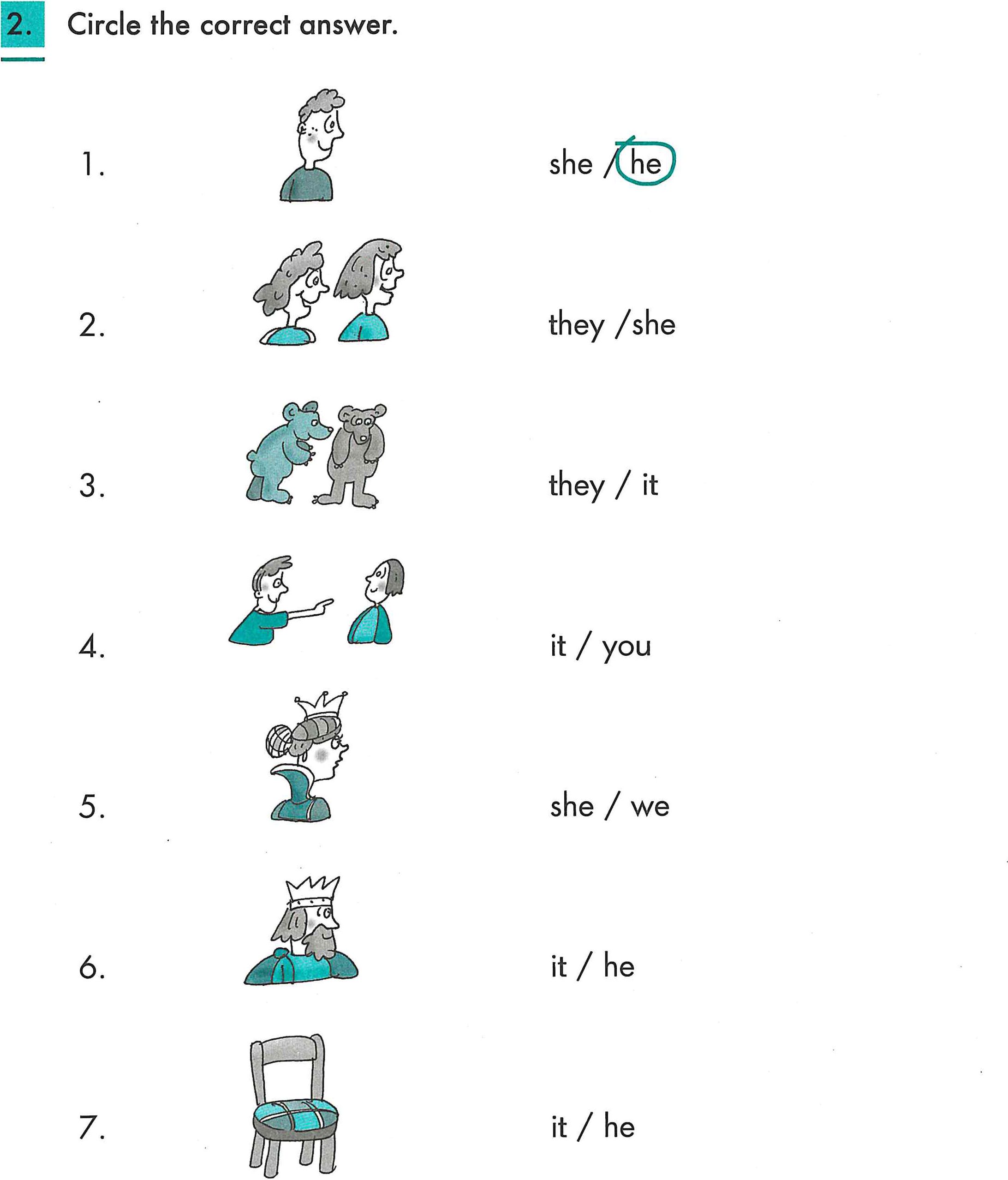
בספר 7 תמונות: 1. ילד 2. שתי ילדות 3. שני דובים 4. ילד מצביע על ילדה. 5. מלכה 6. מלך 7. כיסא
1. she / he
2. they / she
3. they / it
4. it / you
5. she / we
6. it / he
7. it / he
*18*
3. Write the correct pronoun beside each noun.
כתבו שם גוף מתאים ליד כל שם עצם.
1. the house it
2. Natalie
--
3. you and I
--
4. you and the teacher
--
5. this table
--
6. my brothers and I
--
7. my mother
--
8. Dan’s father
--
9. our car
--
10. Guy’s sister
--
11. the boy
--
12. my sister
--
13. a pencil
--
14. an orange
--
15. books
--
16. Dan and I
--
17. you and Sima
--
18. Gadi and Sharon
--
19. the tiger
--
20. my father
--
21. my son
--
22. my mother and I
--
23. the windows
--
24. my grandmother
--
25. the policeman
--
26. the door
--
27. my friends
--
28. Ms. Sharon
--
29. Mrs. Cohen
--
30. Mr. Dean
--
*19*
4 Which pronoun can you use for the words in each group?
איזה שם גוף מתאים למילים בכל קבוצה?
1. he: the man, Dror, Mr. Peleg, father
2.
--
: the woman, mother, the girl, grandmother
3.
--
: the books, the children, Billy and Tom, the girls
4.
--
: a pen, a cow, a day, a room
*20*
5.
--
: Gal and I, mother and I, Helen and I
6.
--
: Bob and you, You and Dan, Dean and you
5 Put the words in the correct columns.
שבצו את המילים בטורים המתאימים.
a. my bed, Jane, the apple, Ted, grandmother, grandfather, the tiger, Mrs. Hadar, Jim
He, She, It
--
,
--
, my
--
bed
--
,
--
,
--
--
,
--
,
--
*21*
b. my-pets, you and I, you and your friend, my-teachers, these houses, you and your family, David and I, my friends and I, you and Tomer
We, You, They
--
,
--
, my
--
pets
--
,
--
,
--
--
,
--
,
--
6 Circle the correct words.
הקיפו בעיגול את המילים הנכונות.
1. Elephants are gray They are / It is very big.
2. Today is Sunday. They are / It is a nice day.
3. The computer is new. They are / It is very small.
4. Here are Gil and Ron. They are / He is my cousins.
5. The books are in the bag. It is / They are not on the shelf.
6. The horse is brown. It is / They are beautiful.
7. The pizza is great. They are / It is hot.
8. My brothers and I are tall. We are / They are, not short.
*22*
7 Complete the sentences with the correct pronouns.
השלימו את המשפטים בעזרת שמות הגוף מתאימים.
1. Sarah is my friend. She lives in Tel Aviv.
2. This car is beautiful.
--
is new.
3. My schoolbag is big.
--
is very heavy.
4. Look at the monkeys (קופים).
--
are funny.
5. You are my neighbor.
--
live next door.
6. My parents like coffee.
--
drink coffee every morning.
7. Sam and I have a new game.
--
is great.
8. My mother is not at home now.
--
is at work.
9. There is a new zebra in the zoo.
--
is still a baby.
10. My cat Maya has three new babies.
--
is very happy now.
11. The kids are in the garden.
--
are playing.
12. Dana is angry.
--
is not smiling.
13. Look at Mark.
--
is so tall.
14. Here are Meital and Ronen.
--
are ten years old.
*23*
8 Find the mistakes in the pairs of sentences and correct them.
One pair is correct.
מצאו ותקנו את השגיאות בכל זוג משפטים. זוג אחד נכון לחלוטין.
1. David is a teacher. She is an English teacher.
David is a teacher. He is an English teacher.
2. I need some money. He is for the books.
--
3. Mother is at home. It is in the kitchen.
--
4. Look at the chair over there. He is black and green.
--
5. Dan is late. It is always late.
--
6. Shiran is a good girl. He is a good friend, too.
--
7. Shirley is a singer. She is very popular.
--
8. My computer is old. He is not good for me.
--
9. Dan and Ron are not at school today. We are at home.
--
10. Here are my cats. We are so fat.
--
11. This is Mr. Brown. She is my boss.
--
12. You and I are neighbors. They are also good friends.
--
*24*
הפועל to be פירושו בעברית להיות. יש לו שלוש צורות בזמן הווה. שימו לב אילו שמות גוף מתאימים לכל צורה.
I am
you, we, they are
he, she, it is
בעברית אנו בעצם "מדלגים" על "להיות" בזמן הווה ומסתדרים בלי הפועל. באנגלית am, is, are חייבים להופיע במשפט שאין בו פועל אחר.
אין באנגלית משפטים בלי פועל.
דוגמה:
I am tall., אני גבוה
You are tall., אתה גבוה, את גבוהה, אתם גבוהים, אתן גבוהות
He is young., הוא צעיר
She is young., היא צעירה
It is new., זה (השולחן) חדש הוא (המעיל) חדש, היא(השמלה) חדשה,
We are young., אנחנו צעירים
They are young., הם צעירים, הן צעירות
אנו משתמשים בפועל to be כדי:
1. לתאר אדם, מקום, חפץ או מצב.
דוגמה:
I am tall, This place is dirty., I am hungry., It is cold
2. לספר על עיסוק.
דוגמה:
They are pupils., He is a teacher.
3. לספר היכן מישהו נמצא.
דוגמה:
Dan is at school now., They are here
4. לספר על גיל.
דוגמה:
I am eleven years old.
*25*
1 Circle the correct answer.
הקיפו בעיגול את התשובה הנכונה.
1. My mother am / is / are in the kitchen.
2 The girl am / is / are pretty.
3. The CDs am / is / are on the desk.
4. Yossi am / is / are a very nice boy.
5. The teacher am / is / are in the classroom.
6. I am / is / are eleven years old.
7. My mother am / is / are a doctor.
8. They am / is / are best friends.
9. The cat am / is / are black.
10. Books am / is / are good friends.
11. The Internet am / is / are fun.
12. You am / is / are a good football player.
13. My car am / is / are white.
14. I am / is / are in the park.
15. Mr. and Mrs. Levi am / is / are in France now.
2 Complete the sentences with am, is or are.
השלימו את המשפטים בעזרת is, am או are.
1. I have a cat, Milul. She is gray and white.
2. Dan
--
the name of the boy over there.
3. The wall
--
white.
4. I
--
busy today.
5. The baby
--
in bed.
6. Dolphins
--
clever animals.
*26*
7. My book
--
on the shelf.
8. I
--
tall.
9. My parents
--
in London this week.
10. It
--
very hot today.
11. The coffee
--
really good.
12. We
--
at home.
13. Someone
--
at the door.
14. The children
--
in the schoolyard.
15. Mr. and Mrs. Shore
--
our neighbors.
TO BE - POSITIVE - חיוב
איפה שמים את am/is/are במשפט?
הנה סדר המילים במשפט חיוב Positive sentence.
Subject נושא, Verb to be פועל, המשך המשפט
I, am, tall. שם תואר
Sharon, is, a nurse. שם עצם
We, are, in the classroom. תיאור מקום
צורות מקוצרות
אפשר להשתמש בקיצורים (בעיקר בדיבור) על ידי השמטת האות הראשונה של am, is, are. כדי לדבר מהר יותר פשוט "בולעים" את האות הראשונה של הפועל. כדי להראות שהאות "נבלעת", שמים פסיק למעלה במקום שהייתה האות החסרה. (זו "מצבה" לזכר האות שנפלה.)
ניתן לחבר בין שם הגוף לפועל to be באופן הבא.
I am - I’m
We are - We’re
He is - He’s
You are - You’re
She is - She’s
They are - They’re
It is - It’s
*27*
3 Write the sentences with full forms.
כתבו את המשפטים עם צורות מלאות.
1. She’s my friend. She is my friend.
2. We’re in the same class.
--
3. You’re a good friend.
--
4. I’m sorry.
--
5. He’s my brother.
--
6. It’s late.
--
4 Write the sentences with short forms.
כתבו את המשפטים עם צורות מקוצרות.
1. It is a nice dress. It’s a nice dress.
2. She is my friend.
--
3 They are late.
--
4. We are at home.
--
5. He is my teacher.
--
6. You are right.
--
7. I am young.
--
8. It is hot in the summer.
--
9. We are on time.
--
10. I am here.
--
*28*
Use the table to help you.
כתבו משפט מתחת לכל תמונה. היעזרו בטבלה.
I, Anat, The policeman, My cat, Dana and Gal, Frogs, am, is, are, green., happy today., under the bed., in the kitchen., twelve years old., in the police car.
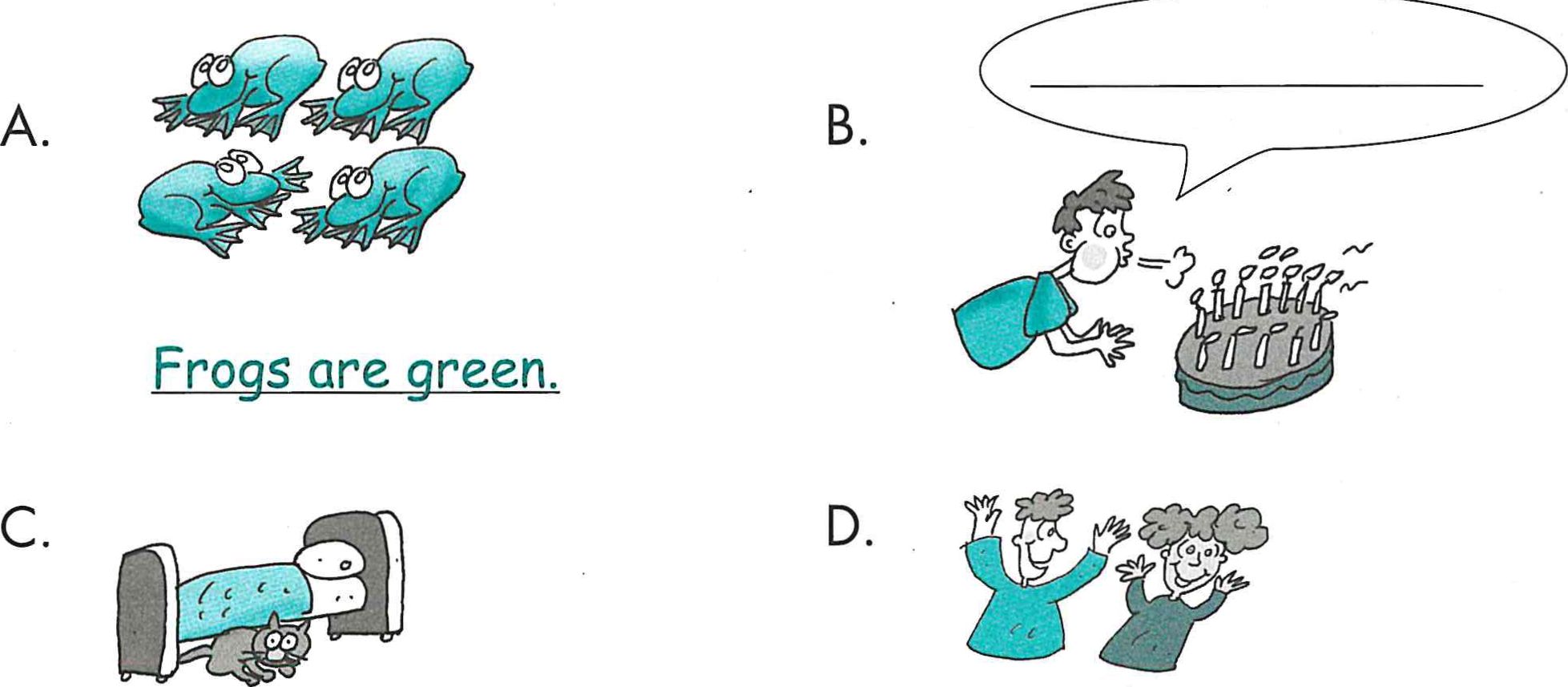
בספר 4 תמונות: ארבעה צפרדעים, ילד מכבה את הנרות של העוגה, חתול מתחת למיטה, ילד וילדה מרימים ידיים
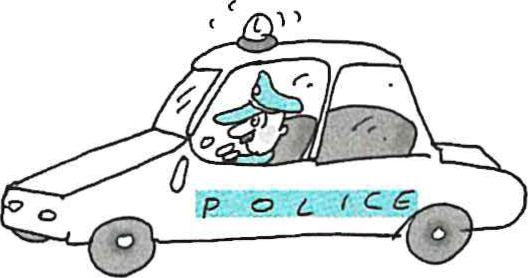
שוטר בתוך מכונית משטרה
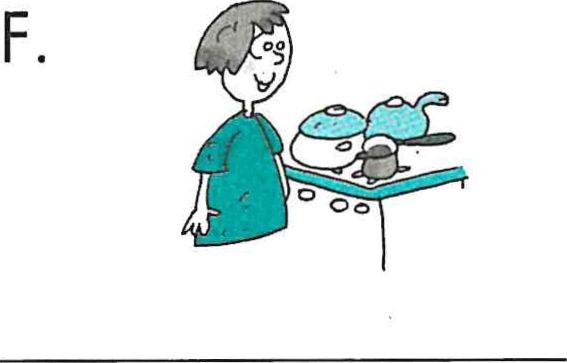
אישה מכינה אוכל
A. Frogs are green.
B.
--
C.
--
D.
--
E.
--
F.
--
*29*
6 Translate these sentences into English. Use the table to help you.
תרגמו את המשפטים לאנגלית בעזרת הטבלה.
I, Ronen, Varda, The parrot, You, Our neighbors, am, is, are, in the cage., tired., doctors., very nice people., a student., a football player., late, happy today., at home now
1. אני מאושרת היום. I am happy today
2. השכנים שלנו רופאים.
--
3. ורדה היא תלמידה.
--
4. אתה מאחר.
--
5. רונן הוא שחקן כדורגל.
--
6. התוכי בכלוב.
--
7. אני בבית עכשיו.
--
8. אתה עייף.
--
9. השכנים שלנו אנשים נחמדים מאוד.
--
*30*
7 Fill in the blanks with is or are.
השלימו את המשפטים עם is או are.
The Browns live on a big farm. There are many animals on the farm. The dog (1)
--
white. His name (2)
--
Whitey. There (3)
--
also cows on the farm. The cows (4)
--
black and brown. They (5)
--
very thin. The turtle (6)
--
very funny. It (7)
--
afraid of people. The Browns also have two kittens on the farm. One kitten (8)
--
in the closet. Another kitten (9)
--
on the television set. The kittens (10)
--
black.
TO BE - NEGATIVE שלילה
איך מסדרים משפט שלילה עם am/is/are?
בשלילה אנו מוסיפים המילה not אחרי am, is, are.
הנה סדר המילים המשפט שלילה Negative sentence.
Subject נושא, Verb to be פועל, not, המשך המשפט
I, am, not, short.
Sharon, is, not, a doctor.
We, are, not, at home.
דוגמה:
חיוב שלילה
I am tall., I am not short.
He is in Tel Aviv., He is not in Haifa.
The men are drivers., They are not sailors.
קיצורים Short Forms
בשלילה ניתן לקצר בשני אופנים.
1. לחבר את שם הגוף והפועל למילה אחת.
דוגמה:
He is not tall. - He’s not tall.
They are not tall. - They’re not tall.
2. לחבר את הפועל והמילה not למילה אחת.
דוגמה:
He is not tall. - He isn’t tall.
They are not tall. - They aren’t tall.
שימו לב! את הפועל am אפשר לחבר רק עם שם הגוף.
I am not tall. - I’m not tall.
*31*
8 Write the sentences with short forms. Write two short forms where possible.
כתבו את המשפטים עם צורות מקוצרות. כתבו את שתי האפשרויות היכן שמתאפשר.
1. He is not fat.
He isn’t fat.
He’s not fat.
2. She is not hungry now.
--
--
3. It is not my book.
--
--
4. We are not free today.
--
--
5. You are not short.
--
--
6. I am not at school now.
--
--
7. They are not good people.
--
--
*32*
8. He is not your friend.
--
--
9. We are not singers.
--
--
10. She is not happy today.
--
--
9 Complete the sentences with the negative form of am, is or are. Use short forms.
השלימו את המשפטים עם צורת השלילה של am, is, או are.
השתמשו בצורות מקוצרות.
1. My dog is big. It isn’t small.
2. I am happy today. I
--
sad.
3. This pen is blue. It
--
green.
4. Guy is fourteen years old. He
--
a little boy anymore.
5. The door is open. It
--
closed.
6. You are thin. You
--
fat.
7. Dana is at work. She
--
at school.
8. Sam is a teacher. He
--
a singer.
9. Dan and I are friends. We
--
brother and sister.
10. You
--
late. You are just on time.
*33*
10 Match the sentences that go together.
התאימו את המשפטים ההולכים יחד.
1. My cat is big c
2. I am at home.
--
3. You are my friend.
--
4. The table is green.
--
a. You aren’t my mother.
b. It isn’t orange.
c. It isn’t small.
d. I’m not in the park.
Now match these sentences.
עכשיו התאימו את המשפטים האלה.
1. Dan is a pupil.
--
2. The blue dress is too long.
--
3. They’re in the kitchen now.
--
4. Sam is sick today.
--
5. The pizza is cold.
--
a. The red dress isn’t.
b. It isn’t tasty.
c. He isn’t a teacher.
d. They aren’t in the garden.
e. He isn’t at school.
11 Complete the sentences with the verb to be (am, is, are).
Use the positive or the negative form.
השלימו את המשפטים בעזרת am, is, are בחיוב או בשלילה.
1. I am (be) at home. I am not (not be) at school today because I am (be) sick.
2. This
--
(be) your pen. It
--
(not be) my pen.
3. The car
--
(be) outside. The keys
--
(be) inside.
4. I
--
(be) sorry. I
--
(not be) free today. I
--
(be) busy.
5. Sharon
--
(be) my friend. We
--
(be) good friends.
*34*
6. The tea
--
(not be) ready yet.
7. Dana
--
(not be) in the house. She
--
(be) in the garden.
8. Oh, I
--
(be) late. Bye!
9. Jerusalem
--
(be) the capital of Israel.
TO BE - YES NO QUESTIONS שאלות כן / לא
כדי לשאול שאלות כן / לא (שאלות שהתשובה עליהן היא "כן" או "לא") שמים את הפועל to be (am’ is’ are) בתחילת המשפט (באות גדולה).
הנה סדר המילים בשאלות כן / לא Yes / No Questions.
Verb פועל, Subject נושא, המשך המשפט,
--
Is, the boy, happy, ?
Are, you, a doctor, ?
Am, I, late, ?
הנושא והפועל מחליפים מקום כדי ליצור שאלה.
הכלב הזה ידידותי (משפט חיוב).
This dog is friendly.
האם הכלב הזה ידידותי (משפט שאלה)?
Is this dog friendly?
שימו לב! אין מילה מיוחדת באנגלית שפרושה "האם".
אם נושא המשפט אינו שם של מישהו, האות הגדולה הופכת לאות קטנה מכיוון שהיא כבר לא בתחילת המשפט אלא באמצעו.
דוגמה:
The boy is tall.
Is the boy tall?
בדרך כלל התשובה לשאלת Yes / No היא קצרה.
דוגמה:
Is it cold today?
Yes, it is. or No, it isn’t.
זיכרו! תמיד לכתוב סימן שאלה (?) בסוף שאלה.
*35*
התבוננו בתמונה. ענו על השאלות. כתבו תשובות קצרות.
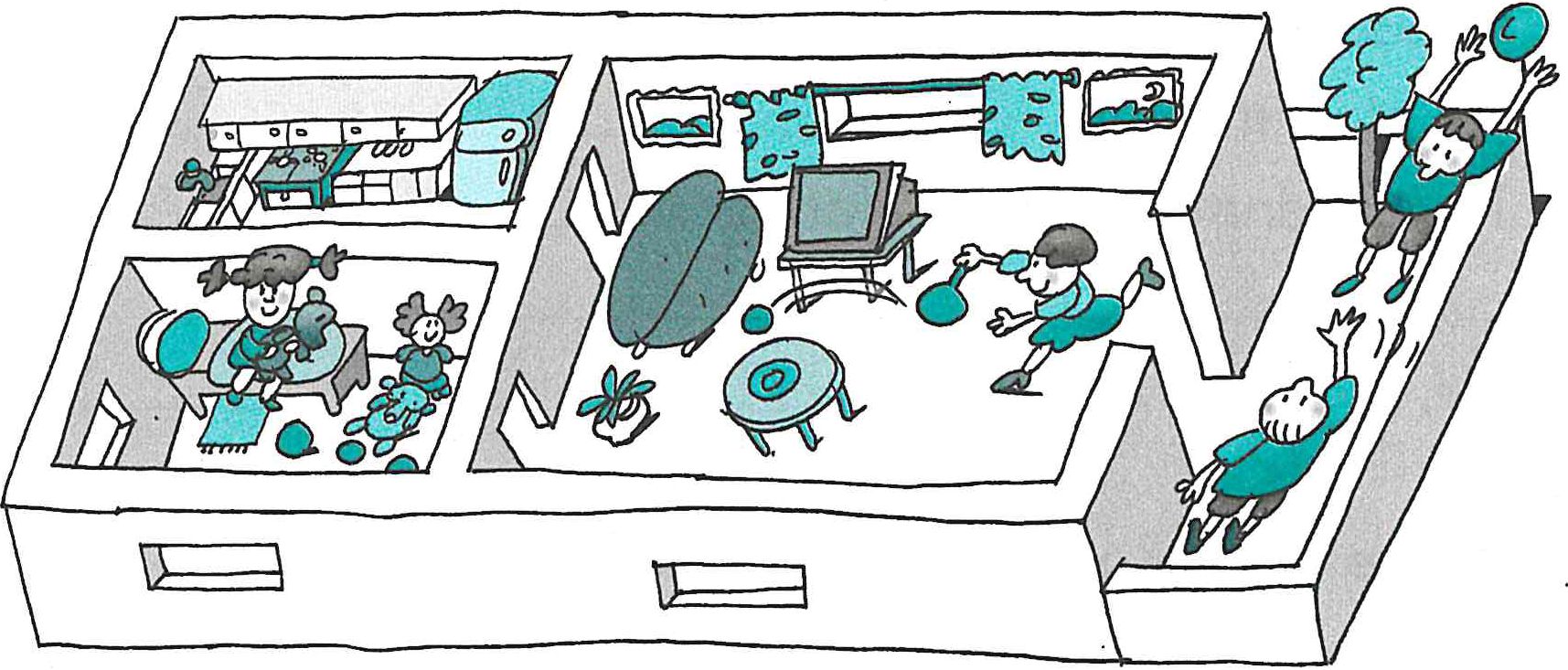
ילדים משחקים בתוך בית: שני ילדיםמשחקים בכדור בחצר, ילדה אחת משחקת בכדור עם מטקה בסלון וילדה אחת משחקת עם דובי בחדר
1. Is the dog in the kitchen? Yes, It is.
2. Are the girls in the yard?
--
3. Are the boys in the yard?
--
4. Is the door open?
--
5. Is the TV in the bedroom?
--
6. Are the toys in the kitchen?
--
13 Ask Yes/No questions. Change only the word order.
הפכו את המשפטים לשאלות כן / לא ע"י שינוי סדר המילים בלבד.
1. The table is brown. Is the table brown?
2. These books are interesting.
--
3. My shirt is dirty.
--
4. It is cold tonight.
--
5. He is forty years old.
--
6. The pens are in the drawer.
--
7. Rina is a clever girl.
--
*36*
8. Your bag is new.
--
9. Dan’s eyes are blue.
--
10. This song is new.
--
11. Egypt is in Africa.
--
12. The children are in the classroom.
--
13. Mr. Nagar is a carpenter.
--
14 Write the correct questions for the following answers.
חברו שאלות לתשובות הבאות.
1. Are you busy now?
No, I am not busy now.
2.
--
Yes, I am hungry.
3.
--
No, the story is not long.
4.
--
Yes, mother is at home.
5.
--
No, the keys are not in the drawer (מגירה).
6.
--
No, this movie is not for children.
7.
--
No, I am not angry with you.
8.
--
Yes, you are my best friend.
*37*
15 Translate the questions into English. Use the table.
תרגמו את השאלות לאנגלית בעזרת הטבלה.
Am, I, in the right place, busy now, late, right, a nice movie, happy now, tall, your keys, a good idea, next in line, your telephone number
Is, this, he, she, it,
--
Are, you, we, they, these,
--
1. האם אתה עסוק עכשיו? Are you busy now
2. האם אלה המפתחות שלך?
--
3. האם זה סרט נחמד?
--
4. האם זה רעיון טוב?
--
5. האם הם גבוהים?
--
6. האם אתה שמח עכשיו?
--
7. האם אנחנו במקום הנכון?
--
8. האם היא מאחרת?
--
9. האם אני צודק?
--
10. האם הוא הבא בתור?
--
11. האם זה מספר הטלפון שלך?
--
*38*
16 Translate the questions into English. Use the table below.
תרגמו את השאלות לאנגלית בעזרת הטבלה.
Am, Is, Are, this shirt, Iris, you, I, the boys, at home today?, outside?, thin-or fat?, yours?, your sister?
1. האם אתה בבית היום?
Are you at home today
2. האם הבנים בחוץ?
--
3. האם אני רזה או שמן?
--
4. האם החולצה הזאת שלך?
--
5. האם איריס אחותך?
--
*39*
TO BE - WH QUESTIONS Wh שאלות
סוג נוסף של שאלות הוא שאלות Wh (שאלות מידע). הן נקראות כך מכיוון שכולן פרט ל-How מתחילות באותיות Wh. שאלות אלו מבקשות מידע ולכן גם נקראות Information Questions.
Wh Words מילות שאלה
Why למה, What מה
Who מי, When מתי
How איך, Where איפה
הנה סדר המילים בשאלות Wh.
Wh מילה, BE am / is / are, Subject נושא, המשך המשפט
Why, is, the teacher, angry?
Where, are, you?,
--
דוגמה:
השאלה: Where is Sam?
התשובה: Sam is at work.
17 Circle the correct Wh word. The answer will help you.
הקיפו בעיגול את מילת ה-Wh הנכונה. היעזר בתשובה.
1. What / When / Where is my umbrella? On the chair.
2. Where / How / Who is your teacher? Miss Browning.
3. Why / What / Who are you here? I want to see the doctor.
4. What / When / Where is he at home? In the afternoon.
5. How / Who / Why is the new teacher? She is great.
6. Why / When / Where is the show? At the Habima Theater.
7. Who / How / Why are you so happy? Because it’s my birthday.
8. When / Where / What is your name? Helen.
9. When / Where / What is the new supermarket? On Main Street
10. When / Where / What does the game start? At 9:00.
*40*
18 Match the questions and answers.
התאימו שאלה לתשובה.
1. Is your brother tall? d
2. Where is my pen?
--
3. How’s the weather?
--
4. Who is the boss?
--
5. Why are you here?
--
a. It’s on the table.
b. That tall man over there.
c. Because I need your help.
d. Yes, he is.
e. It’s a beautiful, sunny day.
19 Match the questions and answers.
התאימו שאלה לתשובה.
1. Where is Ran? c
2. What’s the name of the movie?
--
3. How old are you?
--
4. Who is the new doctor?
--
5. When are you going away?
--
a. On Sunday.
b. Dr. Williams.
c. He’s in the bookshop.
d. I’m twenty years old.
e. It’s “Harry Potter”.
20 Fill in the correct Wh word. The answer will help you.
השלימו את מילת השאלה המתאימה. היעזרו בתשובה.
1. Where is Miri? She’s at home.
2.
--
are you sad? Because my dog is missing.
3.
--
time is it? It’s 7:00.
4.
--
are the glasses? On the shelf.
5.
--
is the test? On Monday.
6.
--
is your English? It’s not so good.
7.
--
are they? They are in the park.
8.
--
is it so cold in here? Because the windows are open.
*41*
9.
--
is that in your hand? It’s a mouse.
10.
--
is my watch? I can’t find it.
11.
--
are you sad? Is it because of the movie?
12.
--
is the cake? Is it good?
13.
--
is the test? Is it next week?
14.
--
is that? Is it the new teacher?
21 Fill in the questions in the following dialogue.
Use the question bank.
השלימו את השאלות בדו-שיח הבא. השתמשו במחסן השאלות.
How are you?, Where is it playing?, Are you busy now?, Is it a good movie?, How much is a ticket?
Gal: Hello, Nir. (1) How are you?
Nir: I’m fine, thank you. How are you, Gal?
Gal: I’m O. K. (2)
--
Nir: No, I’m not. Why?
Gal: I want to see the movie “Tomb Raider II”. How about you?
Nir: (3)
--
Gal: Yes, I think it is.
Nir: (4)
--
Gal: At the Sharon Cinema.
Nir: (5)
--
Gal: 33 shekels.
Nir: O.K., let’s go.
*42*
WORD ORDER
זיכרו את סדר המילים!
Positive חיוב
Subject נושא, to be הפועל, המשך המשפט
I, am, here
Negative שלילה
Subject נושא, to be הפועל, not, המשך המשפט
I, am, not, there
Question שאלה
to be הפועל, Subject נושא, המשך המשפט, ?
Are, you, here, ?
22 Word Order
Put the words in the correct order. Write positive sentences and questions, according to the punctuation. Remember to begin the sentence with a capital letter.
סדרו את המילים למשפט חיוב או לשאלה, כנדרש. זכרו להתחיל את המשפט באות גדולה.
1. are / sister / we / brother / and
We are brother and sister.
2. today / is / the library /open
--
3. today / is / Tammy / here
--
?
4. my / is / this / pen
--
5. is / where / car / the
--
?
*43*
6. what / address / is / your
--
?
7. the / Mr. Green / is / English teacher
--
?
8. today / you / how / are
--
?
9. you / late / why / are
--
?
10. at home / when / he / is
--
?
23 Find the mistakes and correct them. One sentence is correct.
מצאו את השגיאות ותקנו אותן. משפט אחד נכון לחלוטין.
1. This a nice song.
This is a nice song.
2. Mr. and Mrs. Brown is from England.
--
3. The donkey are in the yard.
--
or
--
4. I not at home now.
--
5. I so happy to see you!
--
6. What your name is?
--
*44*
7. Where you are now?
--
8. My aunt and uncle is from Australia.
--
9. “Who are you today?” “I’m fine, thank you.”
--
10. They are not in Tel Aviv today.
--
11. The movie is sad?
--
or
--
12. What time it is?
--
*45*
מילות יחס שקשורות למקום
מילות יחס שקשורות למקום מספרים לנו היכן נמצאים אנשים, חפצים או חיות.
הן עונות על השאלה “איפה?” Where
בואו תכירו כמה מילות יחס ומתי משתמשים בהן.
ב- in
בתוך משהו: בארון, בקופסה, בעיר, במדינה.
The coat is in the closet.
The pen is in the box.
I live in Israel.
I live in Holon.
על, על שטח - on
The pen is on the table.
מתחת - under
The pen is under the book.
קרוב, ליד - near
I live near the school.
שימו לב! לגבי רחובות, הבריטים משתמשים ב- in.
I live in Sokolov Street.
והאמריקאים משתמשים ב- on.
I live on Sokolov Street
(בספר איורים)
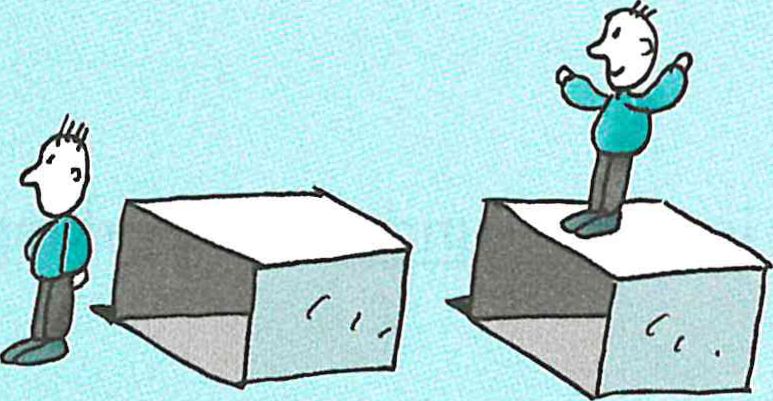
ילד עומד על קופסא, ילד עומד ליד הקופסא
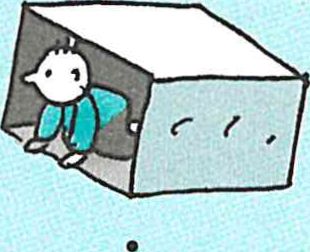
ילד בתוך קופסא
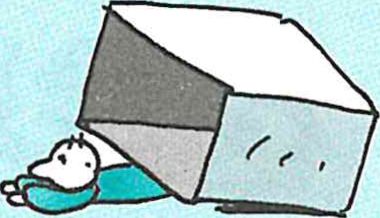
ילד מתחת לקופסא
near, on, in, under
*46*
הקיפו את מילת היחס הנכונה לפי התמונה.
1. The pen is in / on / near the box.
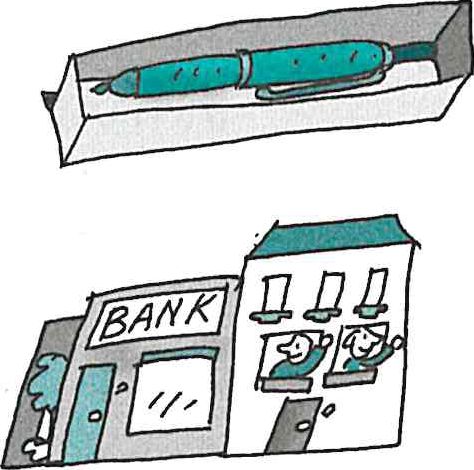
עט בתוך קופסא. בית מגורים ליד הבנק
2. We live under / on / near a bank.
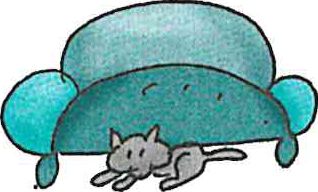
חתול מתחת לספה
3. The cat is under / on / in the sofa.
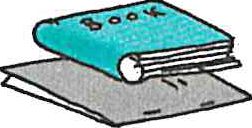
הספר מעל המחברת
4. The book is on / in / under the notebook.
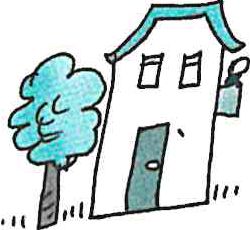
עץ ליד בית
5. There is a tree under / on / near our house.
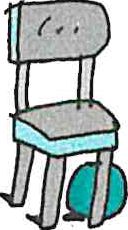
כדור מתחת לכיסא
6. The ball is in / on / under the chair.
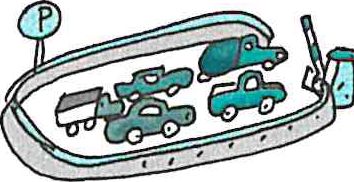
מגרש חניה מתחת לשלט של החניה
7. The cars are in / on / under the parking lot ((מגרש חניה.
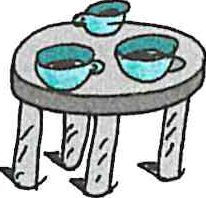
שלוש כוסות על שולחן
8. The cups are in / on / under the table.
*47*
2 Complete the sentences. Use in, on, under or near.
השלימו את המשפטים השתמשו ב - in, on, under, או near.
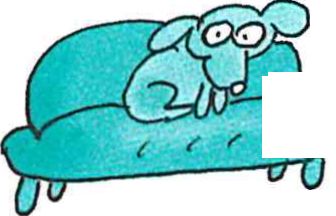
כלב על ספה
1. The dog is on the sofa.
2. The flowers are
--
the vase.
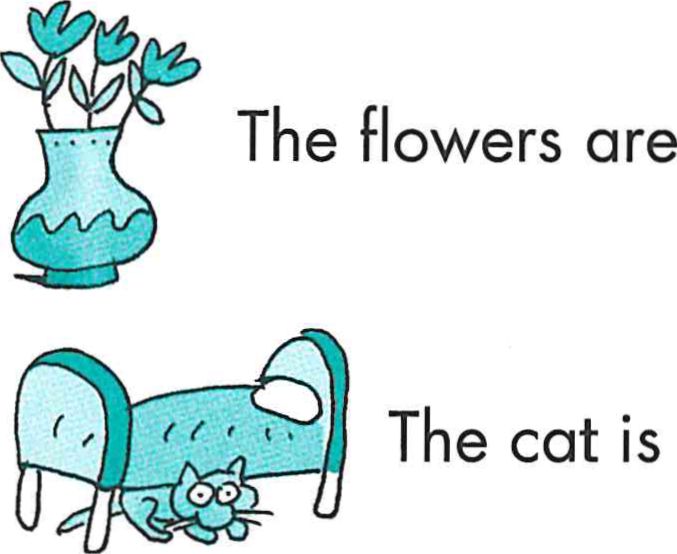
פרחים בתוך אגרטל. חתול מתחת למיטה.
3. The cat is
--
the bed.
4. The tree is
--
the house.
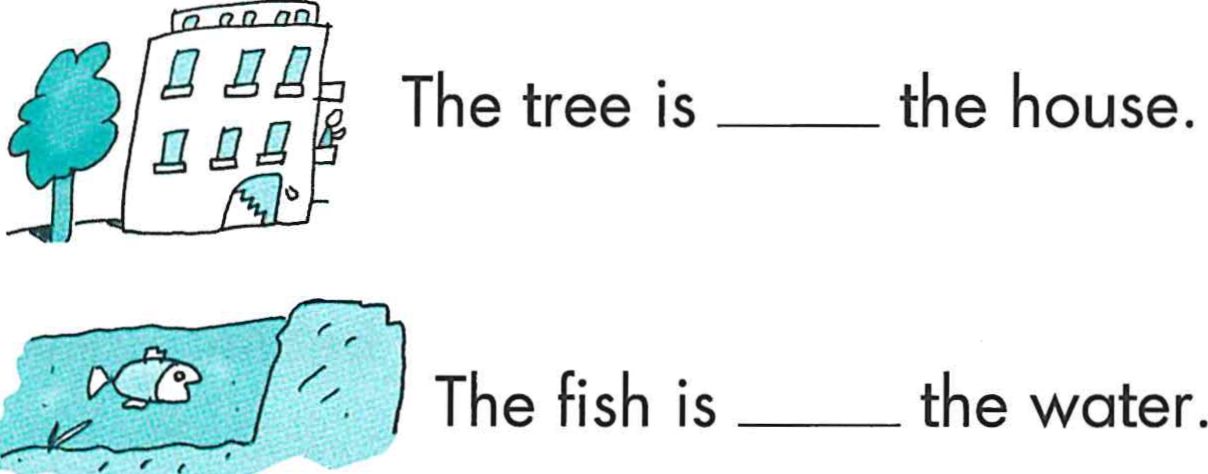
עץ ליד הבית. דג בתוך המים.
5. The fish is
--
the water.
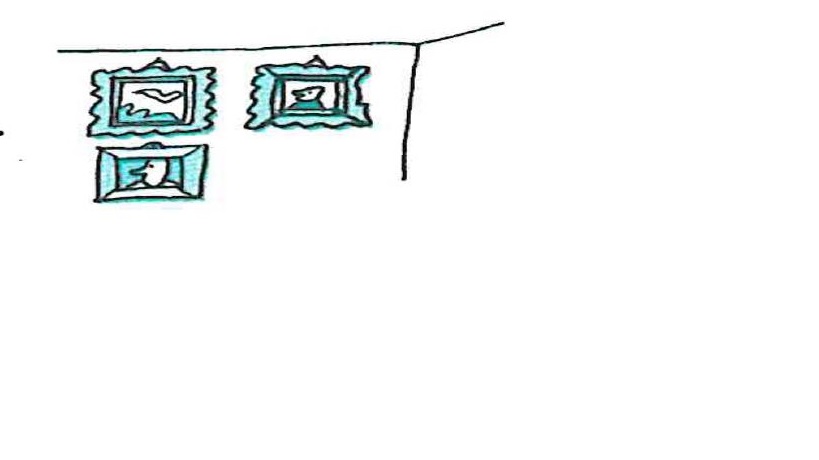
שלוש תמונות על הקיר
6. the pictures are
--
the wall.
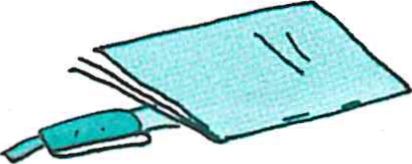
עט מתחת למחברת
7. The pen is
--
the notebook.
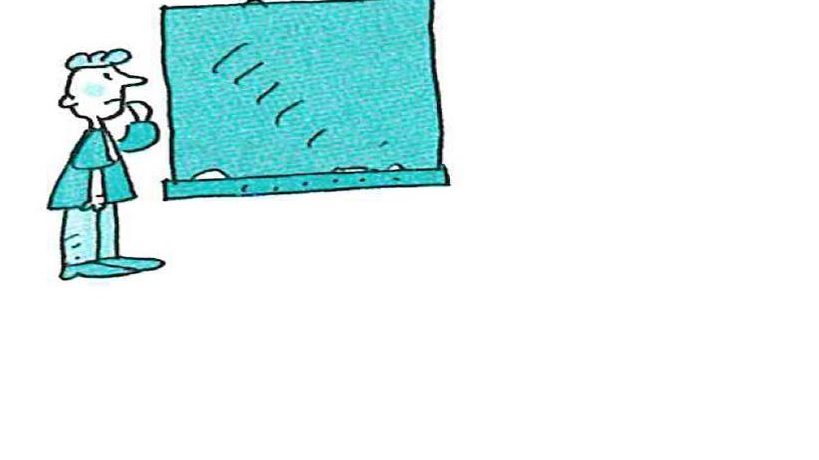
איש ליד הלוח
8. The pupil is
--
the blackboard.
*48*

ספרים על המדף
9. The books are
--
the shelf.
10. The car is
--
the house.
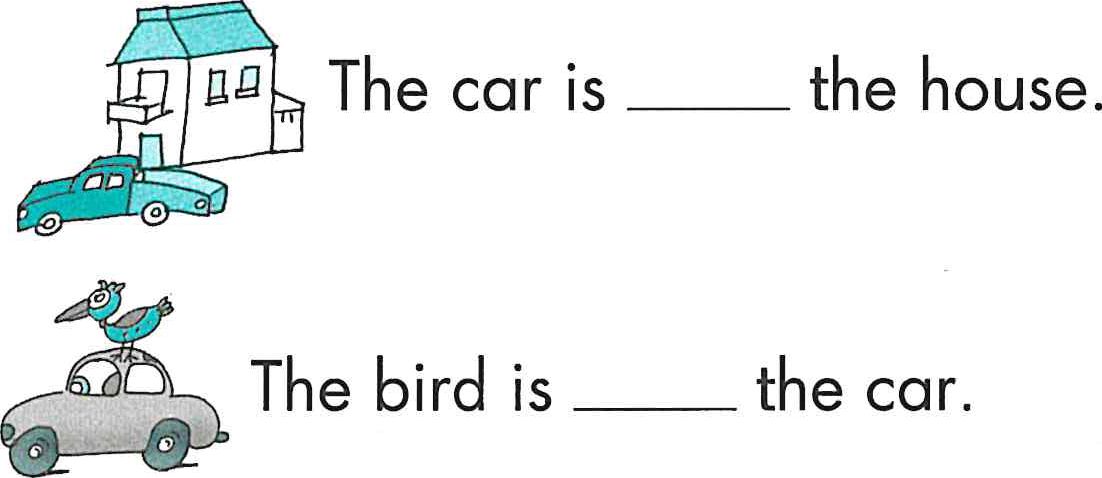
מכונית ליד הבית. ציפור על מכונית.
11. The bird is
--
the car.
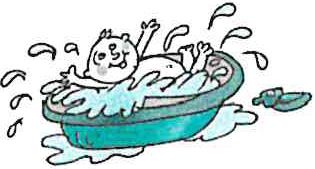
תינוק בתוך אמבטיה
12. The baby is
--
the bath.
הנה מילות יחס נוספות.
מאחורי - behind
The boy is behind the door.
בין - between
Put this chair between you and me.
לפני - in front of
You are in front of me. I can’t see the TV.

מימין לשמאל- ילדה בין ריבועים, ילדה לפני ריבוע, ילדה מאחורי ריבוע
behind, in front of, between
.
*49*
3 Complete the sentences. Use behind, between, in front of.
השלימו את המשפטים. השתמשו ב-behind, between, in front of..
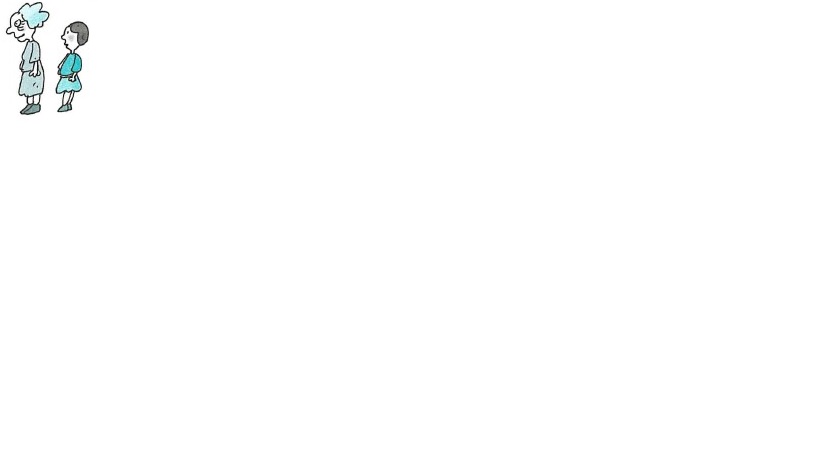
ילדה מאחורי אישה מבוגרת
1. The old woman is in front of the girl.
2. The old man is
--
the boy.

איש מבוגר מאחורי ילד. אופניים בין מכוניות.
3. The bicycle is
--
two cars.
4. “Where are you?” “I’m
--
the door."
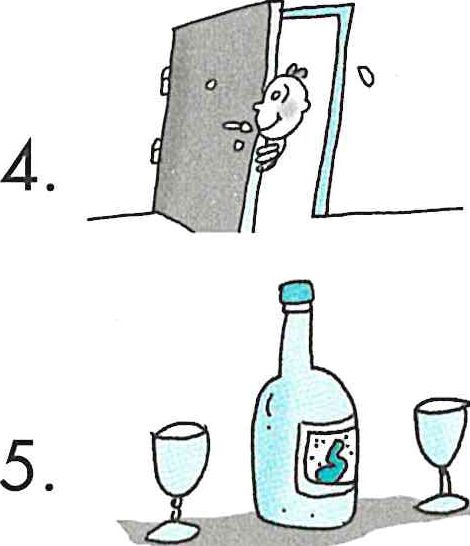
ילד מאחורי הדלת. בקבוק בין כוסות.
5. The bottle is
--
the two glasses.
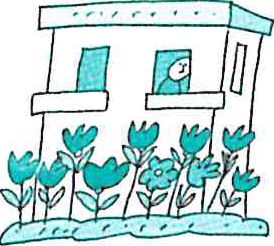
פרחים ליד הבית.
6. The flowers are
--
the house.
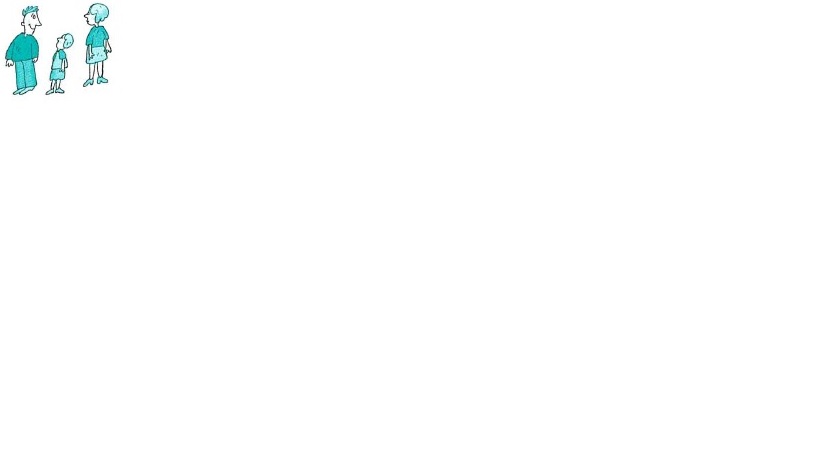
ילדה בין ההורים.
7. The girl is
--
her parents.
*50*
4 Complete the sentences. Use in, on, under, near, behind, between, or in front of.
השלימו את המשפטים. השתמשו ב- in front of, between, behind, near, under, on, in
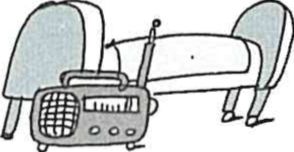
רדיו ליד המיטה
1. The radio is near the bed.
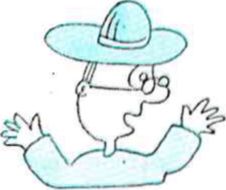
כובע על הראש
2. “Where is my hat?” “It’s
--
your head.”
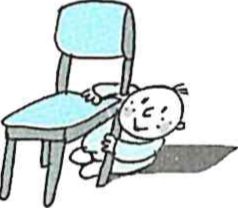
ילד מאחורי הכיסא
3. The baby is
--
the chair.

ילדה יושבת לפני ילד
4. Miri is
--
Rami.
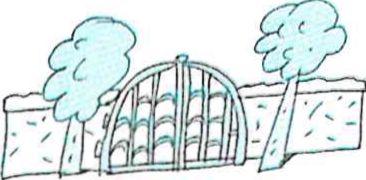
השער בין העצים
5. The gate is
--
the two trees.
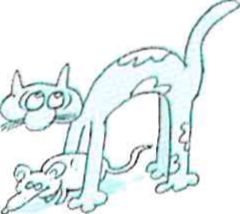
העכבר מתחת לחתול
6. The mouse is
--
the cat.
7. “Are your books
--
your bag?” “Yes, they are.”
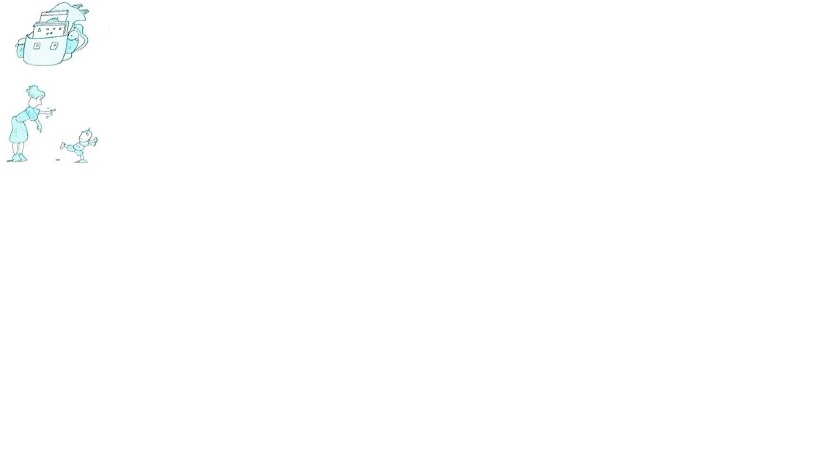
ספרים בתוך התיק. ילד ליד אמא.
8. Mother: “Jackie, please stay
--
me!”
*51*
הכניסו את החפצים הבאים לחדר של בן. ציירו אותם בתמונה.
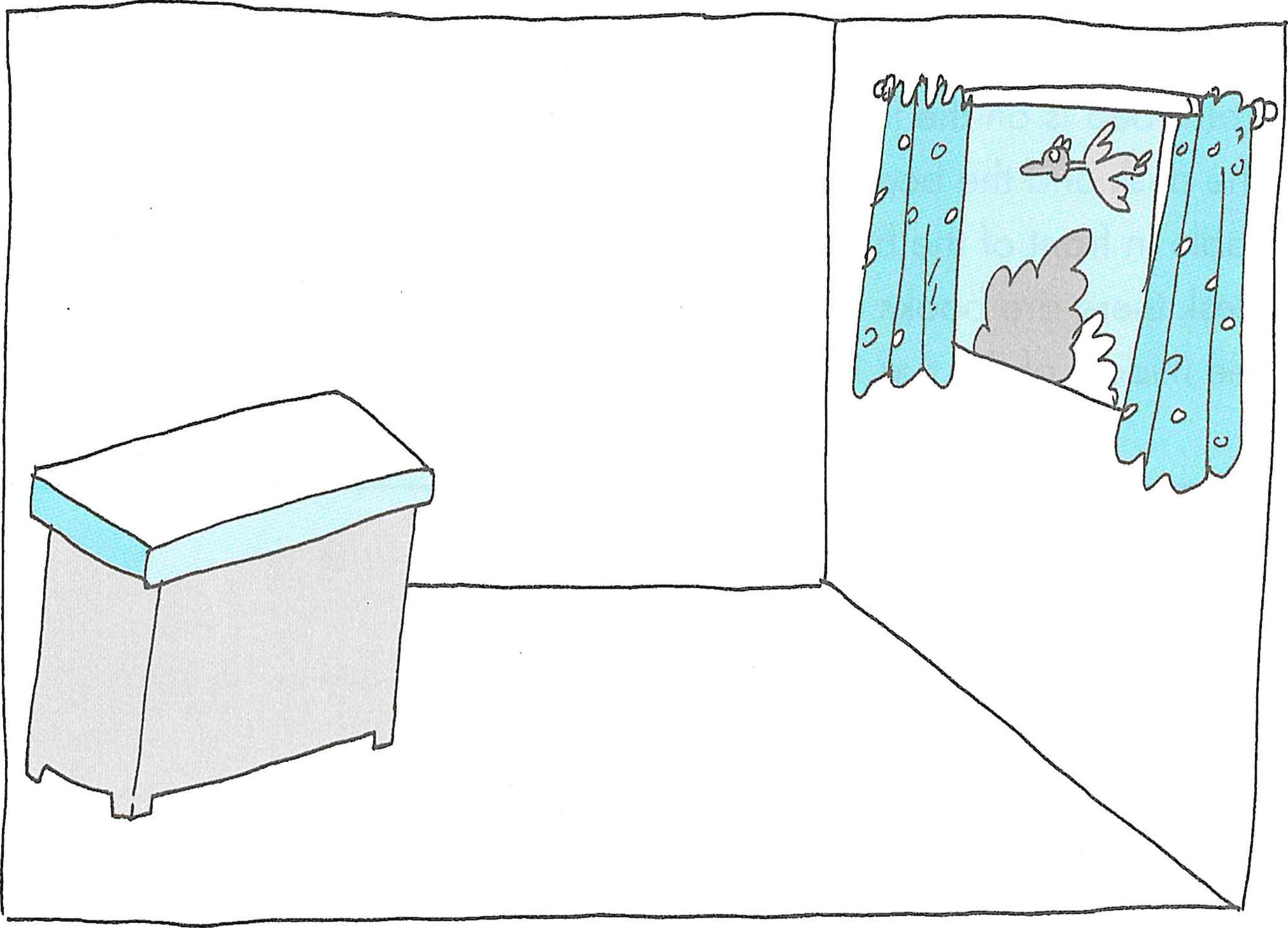
חדר ריק עם חלון ושולחן
a carpet on the floor
a computer on the desk.
a bed under the window
two cats on the bed
הכניסו עוד שני חפצים משלכם. כתבו אותם ואז ציירו אותם בחדר.
--
--
*52*
שימו לב!
בצד ימין - on the right
באמצע - in the middle
בצד שמאל - on the left
6 Read about Tali’s room and then draw it.
ציירו את חדרה של טלי לפי התיאור.
Tali’s bed is on the left. The desk is on the right. The TV is between the desk and the bed. Tali’s shoes are under the bed. There is a little table in front of the bed and a tall lamp behind the bed. On the desk there are books and notebooks. There is a rug on the floor. In the middle of the rug is Tali’s cat.
*53*
התבוננו בתמונה וענו על השאלות. השתמשו ב- in, on, behind, near, או in front of.
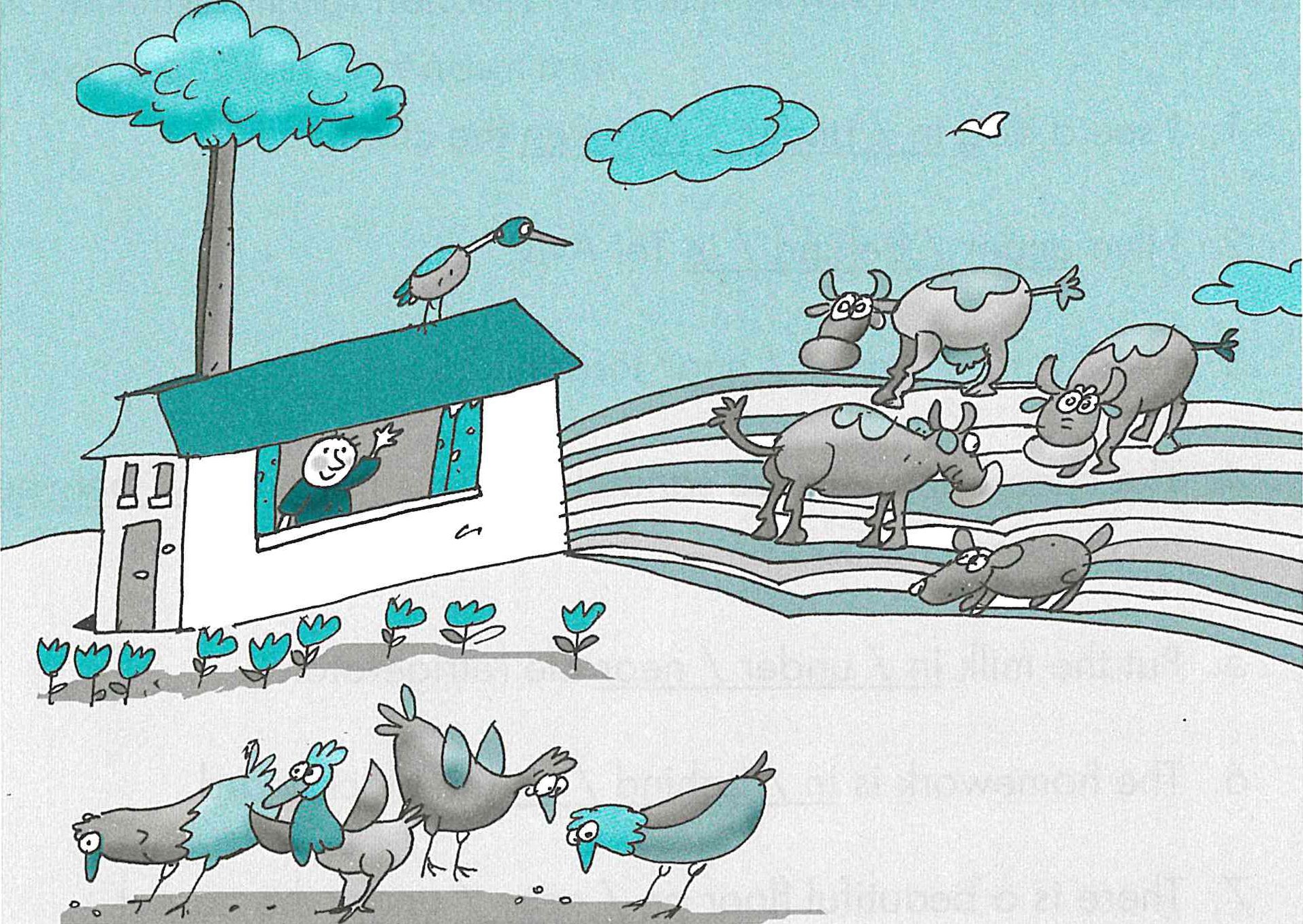
בית בתוך חווה, על האדמה יש 4 תרנגולים, בגבעה יש 3 פרות וכלב, על גג הבית ציפור, בתוך הבית יש ילד, מאחורי הבית עץ ולפניו פרחים
1. Where is the dog? It is near the cows.
2. Where is the bird?
--
3. Where are the cows?
--
4. Where is the boy?
--
5. Where are the hens (תרנגולות)?
--
6. Where are the flowers?
--
7. Where is the tree?
--
*54*
8. Test Yourself
Circle the correct answer. Use your teacher’s Answer Key to check your answers and give yourself 10 points for each correct one.
הקיפו את התשובה הנכונה. השתמשו בדף התשובות של המורה כדי לבדוק את תשובותיכם. תנו לעצמכם 10 נקודות על כל תשובה נכונה.
1. I see a dog in / under / between the chair.
2. I live under / behind / in Tel Aviv.
3. Israel is on / under / near Jordan.
4. The cheese in a cheese sandwich is in / in front of / between two pieces of bread.
5. Put the milk in / under / near the refrigerator.
6. The homework is in / behind / on the blackboard.
7. There is a beautiful floor on / near under the carpet.
8. Where are the keys? They are in / on / between the table.
9. The garden is behind / under / between the house.
10. My school is on / in / near my house.
My score:
--
/ 100
*55*
שם תואר היא מילה שמתארת שמות עצם.
זאת אומרת היא מתארת אנשים, חיות חפצים וכו'.
שמות תואר מספרים על:
- תכונות: big, small, happy, young
- צבעיים: red, yellow, black
- צורות: round
כמו שסיפרנו בפרק ההקדמה, בשמות התואר באנגלית אין הבדל בין יחיד ורבים ואין הבדל בין זכר ונקבה! באנגלית שם התואר אינו משתנה! סוף סוף מצאנו משהו שהוא יותר קל באנגלית!
לכן - טוב, טובה, טובים, טובות - good
מילה אחת באנגלית מתאימה לארבע מילים בעברית.
דוגמה:
ילד טוב - a good boy
ילדה טובה - a good girl
ילדים טובים - good boys
ילדות טובות - good girls
מה מקומו של שם התואר במשפט?
אפשר לשים שם תואר בשני מקומות:
1. לפני שם העצם
דוגמה:
Tom is a good boy
שמתם לב שזה יוצא הפוך מעברית? בעברית אנו אומרים קודם את שם העצם (ילד) ואחר כך את שם התואר (טוב). באנגלית אומרים קודם את שם התואר (good) אחר כך את שם העצם (boy).
ילד טוב - a good boy
זיכרו! אם שם העצם ביחיד, יש להציב לפניו an, a, או the.
דוגמה: ילד טוב - a good boy
2. במשפטים עם הפועל to be (am, is, are) אנו שמים את שם התואר אחר הפועל. אבל הוא עדיין מתאר את שם העצם!
דוגמה: תום גבוה - Tom is tall
טינה שמחה - Tina is happy
שימו לב! ישנם שמות תואר בעלי משמעות כפולה.
דוגמה:
זקן וגם ישן old - an old man, an old book
נמוך וגם קצר short - a short boy, a short movie
עני וגם מסכן poor - a poor family, poor you!
*56*
1. Match the adjectives in English and Hebrew. Use the word bank.
התאימו את שמות התואר באנגלית לשמות התואר בעברית (במחסן).
שימו לב! יש שמות תואר בעלי משמעות כפולה.
a.
שמח, חדש, נמוך, קצר, חולה, צר, מלא, צעיר, ריק, גבוה, מצחיק, ארוך, חזק, איטי, שמן, עשיר
1. long ארוך
2. strong
--
3. happy
--
4. tall
--
5. funny
--
6. fat
--
7. narrow
--
8. young
--
9. rich
--
10. slow
--
11. sick
--
12. new
--
13. full
--
14. empty
--
15. short
--
b.
עצוב, עני, מסוכן, יפה, מהיר, אמיץ, חשוב, זקן, ישן, מעניין, רזה, מסכן, רחב, מרגש, נחמד, זול, יקר
16. expensive
--
17. wide
--
18. beautiful
--
19. sad
--
20. poor
--
21. important
--
22. interesting
--
23. old
--
24. fast
--
25. thin
--
26. dangerous
--
27. exciting
--
28. cheap
--
29. brave
--
30. nice
--
*57*
2 Match the opposites. Choose words from the word bank.
התאימו בין ההפכים. בחרו מילים מן המחסן.
שימו לב! יש שם תואר בעל משמעות כפולה.
happy, mew, small, short, fast, narrow, poor, expensive, fat
1. old mew
2. big
--
3. wide
--
4. cheap
--
5. tall
--
6. thin
--
7. long
--
8. slow
--
9. rich
--
10. sad
--
3 Translate into English. Remember to put in a or an for singular nouns
תרגמו לאנגלית. אל תשכחו לשים a אוan לפני שמות עצם ביחיד.
1. אישה יפה a beautiful woman
2. ספר ישן
--
3. פרחים יפים
--
4. תמונה יקרה
--
5. מכונית מהירה
--
6. מבחנים חשובים
--
7. מחברות ריקות
--
8. בתים גדולים
--
9. איש עני
--
10. כסאות ישנים
--
11. חבר טוב
--
12. חברה טובה
--
*58*
4 Cross out the word in each group that doesn’t go with the adjective.
בכל קבוצה סמנו את שם העצם שלא מתאים לשם התואר.
1. rich: man, children, fish
2. narrow: party, table, rug
3. fast: cars, houses, airplanes
4. small: food, house, class
5. happy: girl, exam, mother
*59*
5 Word Order
Put the words in the correct order.
(Tip: the first word has a capital letter.)
כתבו את המילים בסדר הנכון. (רמז: המילה הראשונה מתחילה באות גדולה.)
1. a / This / is / good / book
This is a good book.
2. I / today / happy / am
--
3. beautiful / The / are / flowers
--
4. is /,Peter / tall / a / man
--
--
6. dog / black / sick / The / is
--
or
--
7. Dina / thin / is
--
8. These / new / houses / are
--
or
--
9. bag / is / This / empty / an
--
10. a / girl / She / is / young
*60*
Use adjectives from the word bank below.
השלימו את המשפטים לפי התמונות. השתמשו בשמות תואר ממחסן המילים.
old, new, fat, interesting, empty, dangerous, expensive, strong, happy, tall

איש ליד עץ גבוה
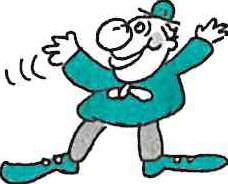
ליצן עם אף גדול
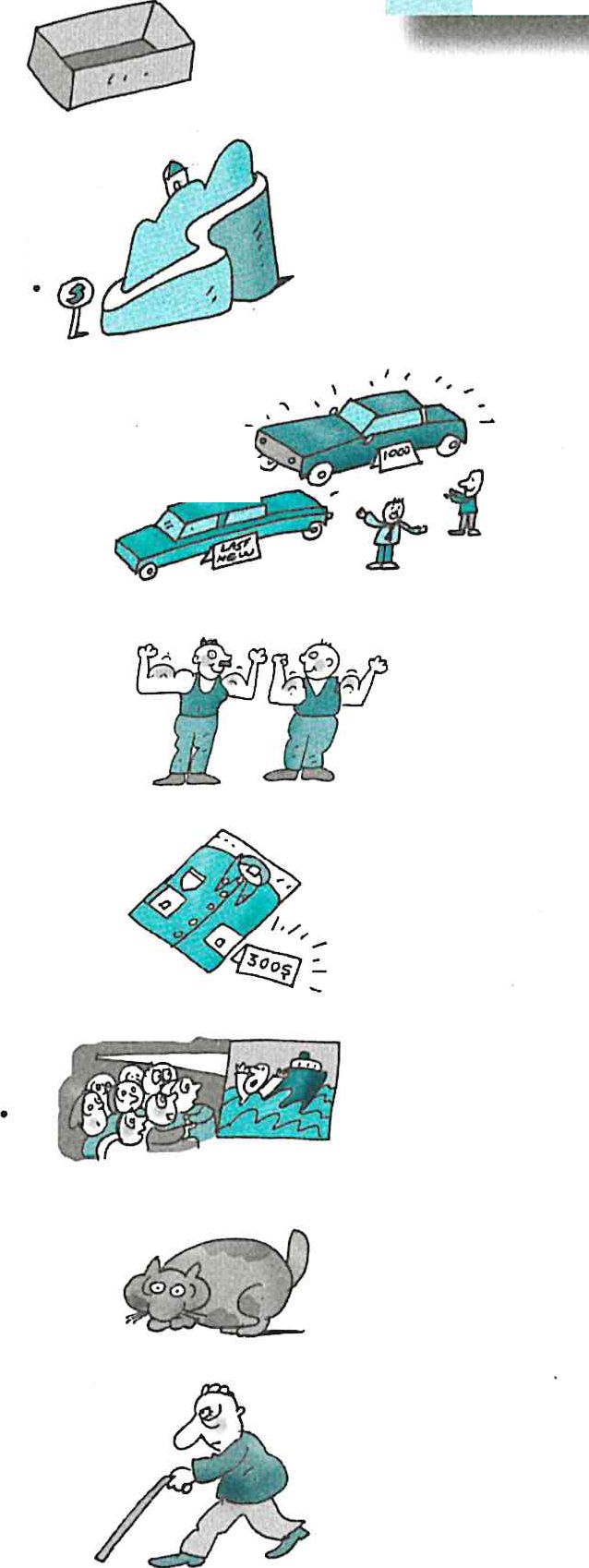
קופסא, כביש, אנשים ליד מכוניות, שני אנשים עם שרירים, חולצה חדשה, סרט בקולנוע, חתול, איש מבוגר
1. The tree is tall.
2. The clown is
--
.
3. The box is
--
.
4. This is a
--
road.
5. These are
--
cars.
6. The men are
--
.
7. This is an
--
shirt.
8. The movie is
--
.
9. This is a
--
cat!
10. He is an
--
man.
*61*
7 At the circus.
Circle the suitable adjectives.
הקיפו את שמות התואר המתאימים.
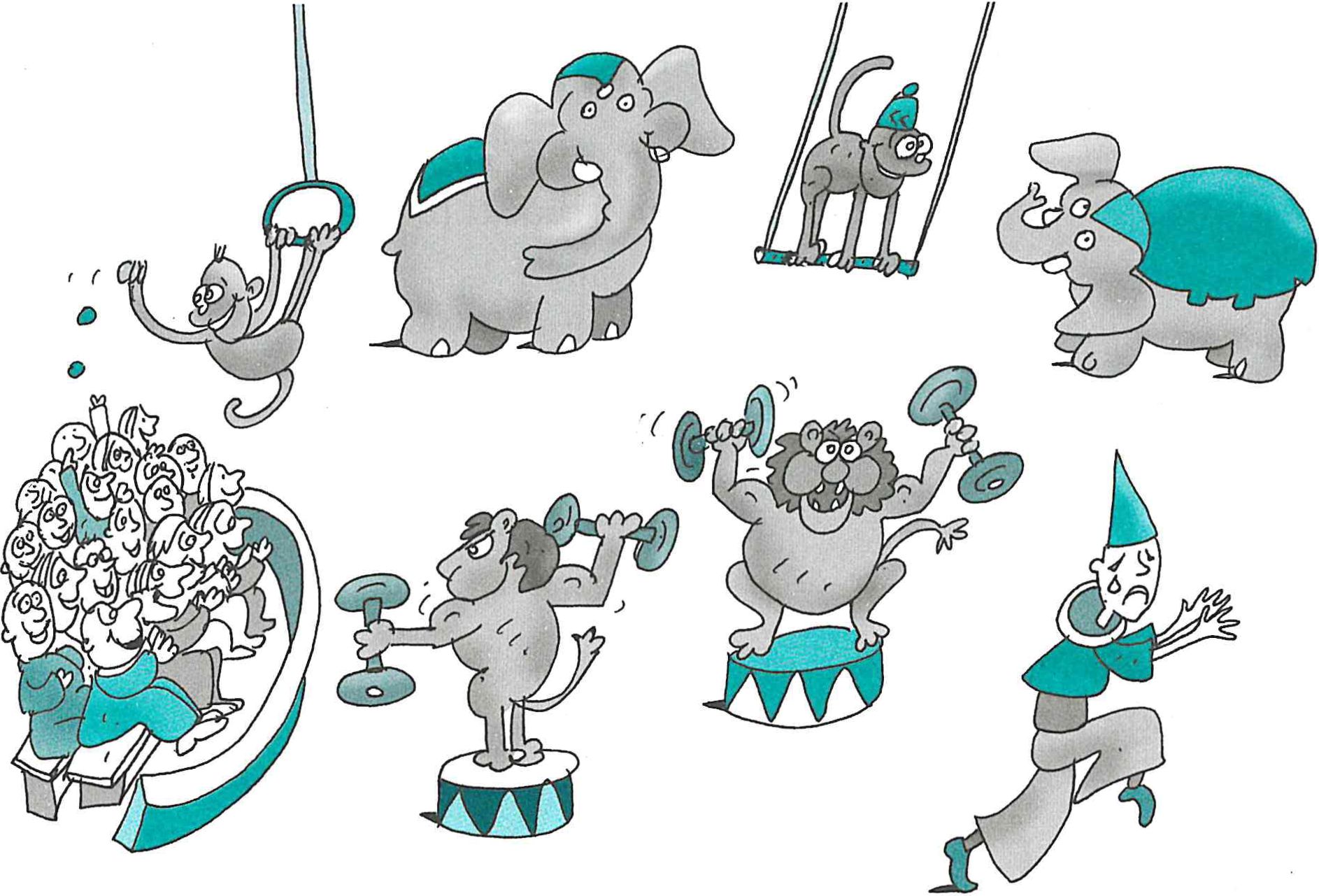
קרקס
My friends and I are at the circus. Everybody is (1) open / happy. The show (מופע) is very (2) empty / interesting. The lions are so (3) strong / narrow. The monkeys are really (4) important / funny. Look at the elephants. They are so (5) thin / fat! Now I see a clown. He has a (6) short / slow shirt and (7) tall / long trousers. The clown is (8) sad / happy. Why is he sad? I don’t know. Well, let’s watch the (9) exciting / wide show!
*62*
כך הופכים שם עצם מיחיד לרבים באנגלית.
בדרך כלל מוסיפים s לשם העצם.
Singular (one), Plural (two, three, four or more)
a boy ילד, boys ילדים
a book ספר, books ספרים
כאשר שם העצם ביחיד מסתיים באותיות o, x, sh, ch או ss מוסיפים לו es (כדי שנוכל לבטא את המילה ברבים ביתר קלות).
דוגמה:
a watch - watches
a class - classes
a tomato - tomatoes
a brush - brushes
a box - boxes
1 Change the nouns into the plural form.
הפכו את שמות העצם לצורת הרבים.
1. a pen - pens
2. a glass
--
3. a car
--
4. a match
--
5. a pupil
--
6. a potato
--
7. an address
--
8..a fax
--
כאשר שם העצם ביחיד מסתיים באות y ולחפניה יש אות ניקוד (a,e,i,o,u) אנו פשוט מוסיפים s.
דוגמה:
a monkey - monkeys
a boy - boys
אבל אם לפני ה-y יש אות עיצורית (אות רגילה לא אות ניקוד), מורידים את ה-y וכותבים ies.
דוגמה:
a baby - babies
a lady - ladies
*63*
2 Change the nouns into the plural form.
הפכו את שמות העצם לצורת הרבים.
1. a party parties
2. a day
--
3. a country
--
4. a factory
--
5. a key
--
6. a library
--
7. a valley
--
8. a fly
--
כאשר שם העצם ביחיד מסתיים באותיות f או fe הופכים אותן ל-ves .
דוגמה:
a wife - wives
a shelf - shelves
ישנם מספר שמות עצם יוצאי דופן בהם האות f לא משתנה.
דוגמה:
a roof - roofs
a dwarf - dwarfs
a cliff - cliffs
a chief - chiefs
a handkerchief - handkerchiefs
זיכרו! אין a או an לפני שם עצם ברבים כי a/an מסמל יחיד.
a bag תיק (אחד)
bags תיקים
3 Change the nouns into the singular form.
Remember to add a or an.
הפכו את שמות העצם לצורת היחיד. זיכרו להוסיף a או an.
1. tables - a table
2. books
--
3. ladies
--
4. toys
--
5. wives
--
6. windows
7. boxes
--
8. ears
--
9. matches
--
10. knives
--
*64*
4. Change the sentences into the plural form.
הפכו את המשפטים לצורת הרבים. זיכרו אין a או an לפני שם עצם ברבים.
1. She is a teacher. They are teachers.
2. He is a doctor.
--
3. She is a lady.
--
4. You are a witch.
--
5. I am a boy.
--
6. It is in the box.
--
7. She is a nurse.
--
5. Change the sentences into the plural form.
הפכו את המשפטים לצורת הרבים.
זיכרו! לשם תואר אין צורת רבים (המילה green לא משתנה ברבים.)
1. The leaf is green. The leaves are green.
2. The baby is cute.
--
3. The wall is white.
--
4. The cat is on the roof.
--
5. Here is a sharp knife.
--
6. I want a potato.
--
7. Put a tomato in the salad.
--
in the salad.
8. The wallet is on the table.
--
on the table.
*65*
שימו לב!
כאשר מצביעים על חפץ קרוב אלינו, משתמשים ב- This is.
דוגמה:
This is a good book.
כאשר מצביעים על חפץ הנמצא רחוק מאתנו, משתמשים ב- That is.
דוגמה:
That is a lemon tree.
צורות הרבים
This is - These are
That is - Those are
דוגמה:
These are good books
Those are lemon trees.
6 Change the sentences into the plural form.
הפכו את המשפטים הבאים לצורת הרבים.
1. This is a big car.
These are big cars
2. That is a nice sweater.
--
3. This is a beautiful baby.
--
4. That is a tennis ball.
--
5. This is a young dog.
--
*66*
יוצאי דופן Irregulars -
באנגלית ישנם גם שמות עצם שלא מקבלים s ברבים אלא משתנים בצורה אחרת.
Singular, Plural, Singular, Plural
a man, men, a foot, feet
a woman, women, a goose (אווז), geese
a mailman (דוור), mailmen, a fish, fish
a policeman, policemen, a sheep (כבשה), sheep
a policewoman, policewomen, a deer (צבי), deer
a tooth, teeth, a child, children
a mouse, mice
7 Fill in the missing words.
השלימו את המילים החסרות.
Singular, Plural
1. a deer, deer
2. a
--
, feet
3. a
--
, geese
4. a tooth,
--
5. a fish,
--
6. a
--
, sheep
7. a
--
, children
8. a
--
, fishermen
9. a mouse,
--
*67*
8 Change the nouns into the plural form.
Then write each one in the correct column in the table below.
הפכו את שמות העצם לצורת הרבים. כתבו כל אחד בטור הנכון בטבלה.
1. a girl girls
2. a story
--
3. an apple
--
4. a pen
--
5. a leaf
--
6. a car
--
7. a city
--
8. a dish
--
9. a bicycle
--
10. a lady
--
11. a fox
--
12. a tomato
--
13. a glass
--
14. a knife
--
15. a potato
--
16. a toy
--
17. a watch
--
18. a baby
--
19. a match
--
20. an elephant
--
-s, -es, -ies, -ves
girls,
--
,
--
,
--
--
,
--
,
--
,
--
*68*
9 Circle the correct word.
הקיפו את המילה הנכונה.
1. The glass / glasses is full.
2. The pencil / pencils is short.
3. He is a child / children.
4. We are a nurse / nurses.
5. These are a box / boxes.
6. The men is / are in the park.
7. The women is / are in the shop.
8. She is a policewoman / policewomen.
9. His tooth / teeth are yellow.
10. The mouse / mice is in the hole.
10 Change the sentences into the plural form.
הפכו את המשפטים הבאים לצורת הרבים. זכרו שם התואר אינו משתנה.
1. My foot is big.
My feet are big
2. The sheep is in the field.
--
in the field.
3. The fish is big.
--
4. The man is tall.
--
5. I am a woman.
--
6. He is a man.
--
7. Dan’s tooth is yellow.
--
8. This is a fat goose.
--
9. The policeman is here.
--
10. He is a mailman.
--
*69*
11 Change the sentences into the singular form.
הפכו את המשפטים הבאים לצורת היחיד.
1. The deer are beautiful. The deer is beautiful.
2. The geese are in the yard.
--
3. The children are happy.
--
4. The mice are grey.
--
5. The policewomen are busy.
--
12 Find the mistakes and correct them.
מצאו את השגיאות ותקנו אותן.
1. The notebooks is on the table.
The notebooks are on the table.
2. Here are two glass.
--
two
--
3. My mother is a busy women.
My mother
--
4. All the children is happy.
--
children
--
5. The storys are short.
--
are
--
6. They are a boys.
--
are
--
7. They are a children.
--
are
--
8. I want new computer.
--
computer.
9. Give me apple, please.
--
apple, please.
10. The leaf are green.
The leaf
--
11. These ladies is my teacher.
--
is
--
12. The boxs are empty.
--
are
--
13. The policeman are in the house.
--
are
--
*70*
13 Just for Fun.
How many plural nouns can you find in the word search?
כמה שמות עצם ברבים אתם יכולים למצוא בתפזורת?
(בספר תפזורת)
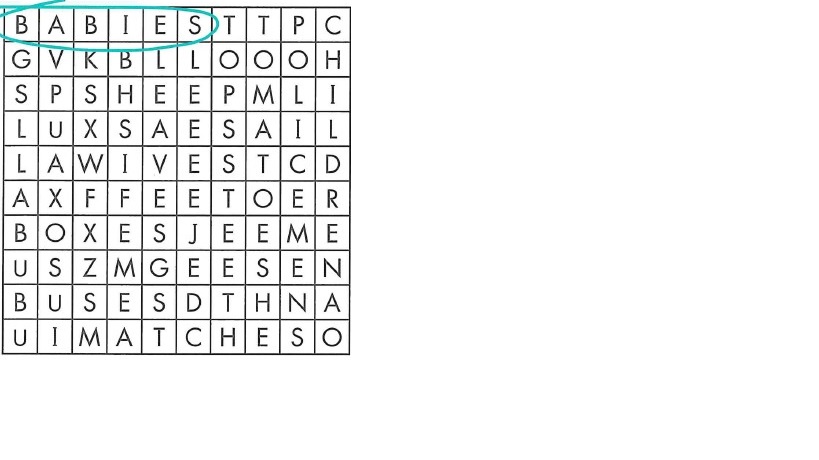
תפזורת
B A B I E S T T P C
G V K B L L O O O H
S P S H E E P M L I
L U X S A E S A I L
L A W I V E S T C D
A X F F E E T O E R
B O X E S J E E M E
U S Z M G E E S E N
B U S E S D T H N A
U I M A T C H E S O
1. babies
2.
--
3.
--
4.
--
5.
--
6.
--
7.
--
8.
--
9.
--
10.
--
11.
--
12.
--
13.
--
14.
--
15.
--
*71*
UNIT 8: THERE IS / THERE ARE
כאשר אנו רוצים לתאר מה נמצא ומה ישנו, נשתמש ב- There is או ב- There are.
דוגמה:
יש כלב בחצר There is a dog in the yard(יחיד)
ישנם תלמידים בכתה There are pupils in the classroom.(רבים)
מה ננבדל בין יחיד לרבים?
ביחיד משתמשים ב-is.
ברבים משתמשים ב-are.
לפני שם עצם ביחיד יבוא a או an.
לפני שם עצם ברבים אפשר להוסיף some (אך לא חייבים).
דוגמה:
There are (some) books on my chair.
לפני שם עצם שאי אפשר לספור אותו משתמשים ב- there is
אפשר גם להוסיף some.
דוגמה:
There is (some) milk in the bottle.
התאימו את המשפטים לתמונות.
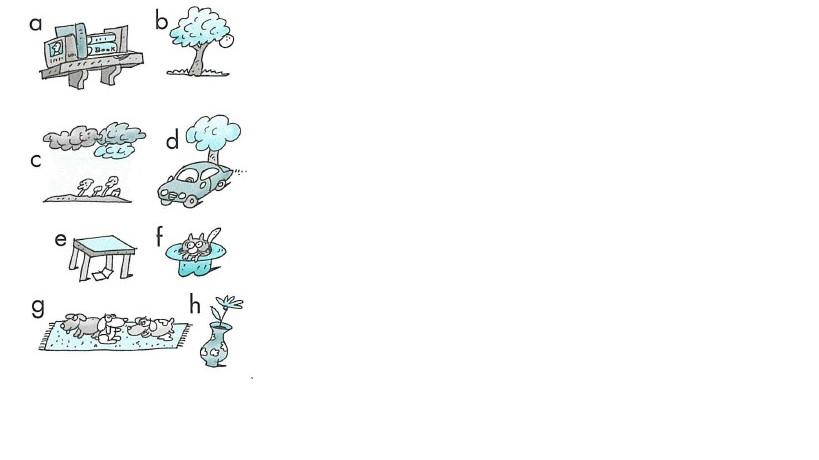
מדף עם ספרים, עץ, עננים, מכונית ליד עץ, שולחן, חול בתוך כובע, כלבים על שטיח, פרח בתוך אגרטל
d 1. There is a car near the tree.
--
2. There is a cat in the hat.
--
3. There are books on the shelf.
--
4. There are some clouds in the sky.
--
5. There is an orange on the tree.
--
6. There is a note under the table.
--
7. There are puppies on the rug.
--
8. There is a flower in the vase.
a.
b.
c.
d.
e.
f.
g.
*72*
2 Fill in There is or There are.
השלימו את המשפטים בעזרת There isאו There are.
1. There is one pupil in the classroom.
2.
--
some pencils on the table.
3.
--
a shoe on the floor.
4.
--
ten pupils in the schoolyard.
5.
--
an open window on the first floor.
6.
--
some cups on the table.
7.
--
a cat on the sofa.
8.
--
three cars on the road.
9.
--
a fish in the water.
10.
--
many children in the class.
11.
--
an egg on the plate.
12.
--
two girls near the blackboard.
13.
--
an onion in the salad.
14.
--
a ball under the table.
15.
--
ten men on the bus.
*73*
3 Rewrite these sentences. Begin with There are.
כתבו מחדש את המשפטים. התחילו ב-There are.
1. There is a pen under the book.
There are (some) pens under the book.
2. There is a fly on the window.
--
--
4. There is a cake on the table.
--
5. There is an umbrella near the door.
--
6. There is a book in the bag.
--
7. There is a woman in the room.
--
8. There is a monkey on the tree.
--
9. There is an elephant in the zoo.
--
10. There is a pony in the park.
--
11. There is a fish in the net (רשת).
--
*74*
4 Word Order
Put the words into the correct order.
סדרו את המילים בסדר הנכון. באנגלית תמיד כותבים "מה" לפני שכותבים "איפה".
There is a monkey (what?) on the tree (where?).
1. some / pupils / There / classroom / are / in / the
There are some pupils in the classroom.
2. funny / is / a / There / monkey / on the tree
--
3. a lot of / on the beach / sand / There / is
--
--
5. There / surprise / in the box / is / a
--
6. in the garden / are / beautiful / There / flowers / some
--
7. clothes / in the shop window / new / There / are
--
8. no one / at home / There / is
--
*75*
Use There is or There are and the word bank
תארו את התמונה. השתמשו ב- There are, There is ומחסן המילים.
cookies, boys and girls, balloons, glasses, clowns, a cake, lemonade
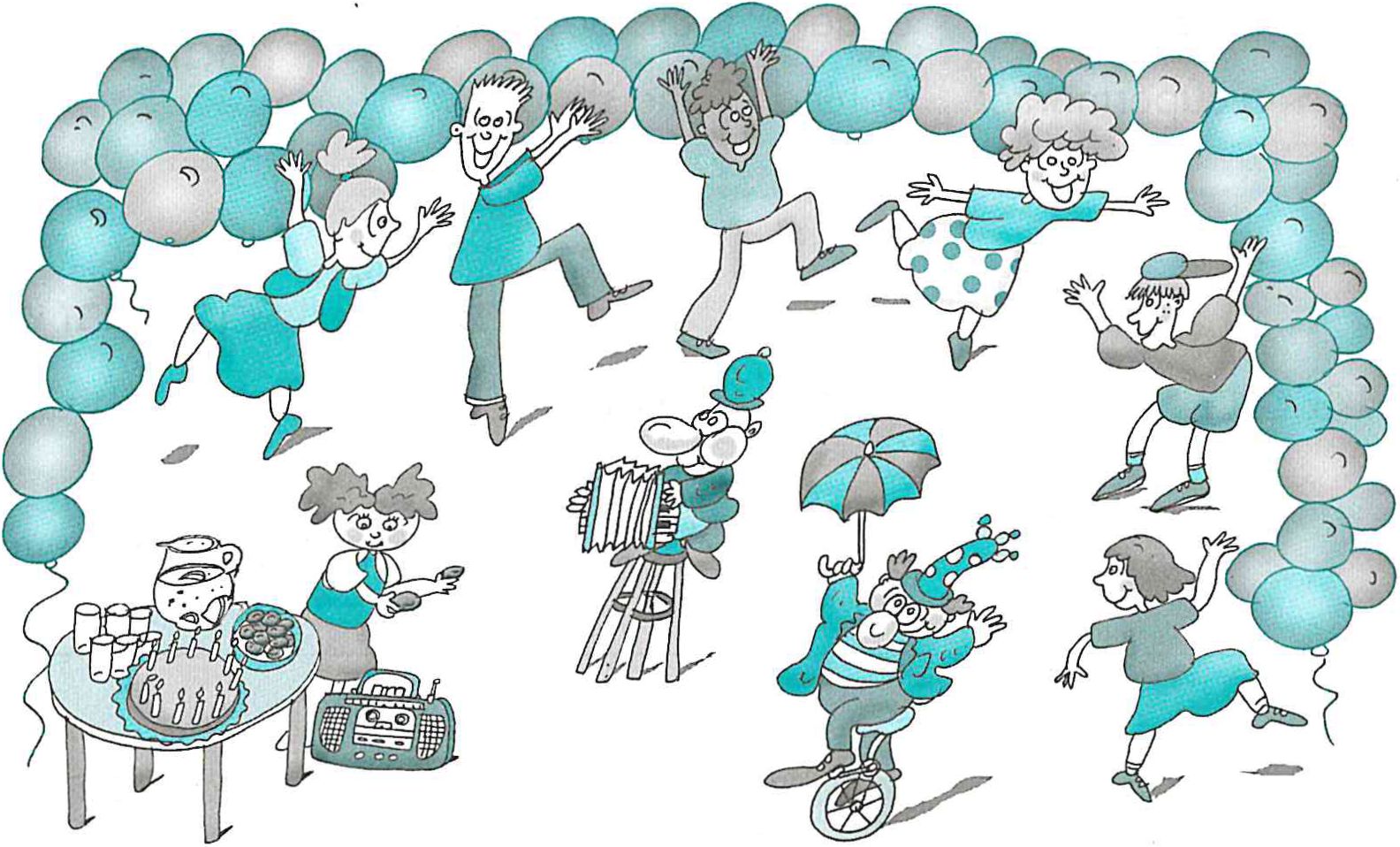
מסיבת יום הולדת
Today is Idan’s birthday. He is having a birthday party.
All his friends are here.
1. There are some boys and girls in the room. They are happy.
2.
--
in the room. They are very funny.
3.
--
on the ceiling and on the walls.
4.
--
on the table with candles (נרות) on it.
5.
--
on the table too. They are sweet.
6.
--
in the jug (כד) on the table.
7.
--
near the lemonade.
*76*
6 a. Translate these sentences. Use the table to help you.
תרגמו את המשפטים בעזרת הטבלה.
ב- in,
על - on,
מתחת - under,
ליד - near
There is, a dog, a pen, a fly, a cat, a supermarket, on, in, near, under, behind, the bank., the bed., the drawer (מגירה)., the boy’s head., the door.
1. יש זבוב על ראשו של הילד
There is a fly on the boy’s head
2. יש סופרמרקט ליד הבנק.
--
3. יש חתול מאחורי הדלת.
--
4. יש כלב מתחת למיטה.
--
5. יש עט במגירה.
--
*77*
b. Now translate these sentences. Use the table below to help you.
תרגמו את המשפטים בעזרת הטבלה.
1. ישנם כמה ילדם וילדות בכיתה
There are some boys and girls in the classroom.
2. יש תמונות בתיק שלי.
--
3. ישנם תפוחים בסל.
--
4. יש תפוזים על העץ.
--
5. ישנם כמה סופרמרקטים בשכונה שלנו.
--
*78*
QUESTIONS שאלות
כאשר רוצים לשאול שאלה עם there is או there are, הופכים את סדר המילים.
דוגמה:
There is a mouse in the house
Is there a mouse in the house?
אחרי שאלה באה בדרך כלל תשובה קצרה.
דוגמה:
Is there a book on the table?
No, there isn't. או Yes, there is.
NEGATIVE שלילה
במשפט שלילה מוסיפים not (או הקיצור n’t) אחרי הפועל.
דוגמה:
There isn’t a mouse in the house. שלילה
some הופך ל-any גם בשאלה וגם בשלילה.
דוגמה:
There are some books on the table. חיוב
Are there any books on the table? שאלה
There aren’t any books on the table. שלילה
7 Ask questions and answer them. Use short answers.
השלימו את השאלות. הוסיפו תשובות קצרות.

חתול על שטיח
1. Is there a cat on the carpet?
Yes, there is.

ציפור על עץ
2.
--
a bird on the tree?
--
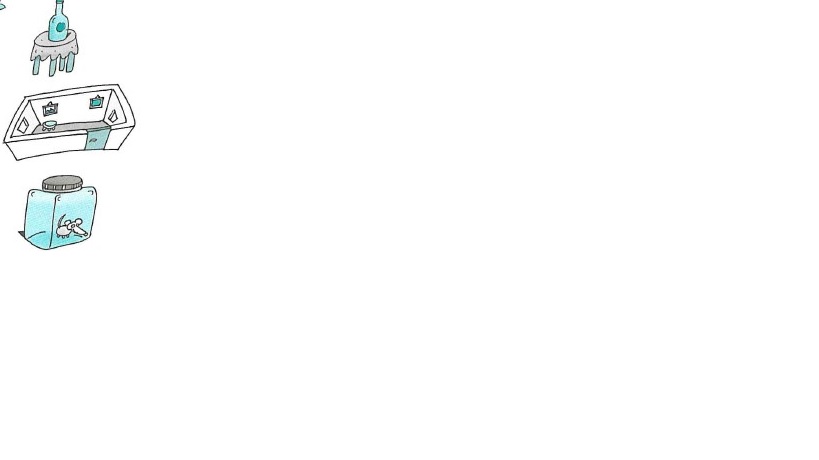
בקבוק על השולחן, תמונות על הקיר. עכבר בתוך צנצנת עוגיות ריקה.
3.
--
a bottle on the table?
--
4.
--
any pictures in the room?
--
5.
--
any cookies in the jar?
--
*79*
תארו את התמונה. כתבו שלושה משפטי חיוב ושלושה משפטי שלילה. בחרו מילים ממחסן המילים.
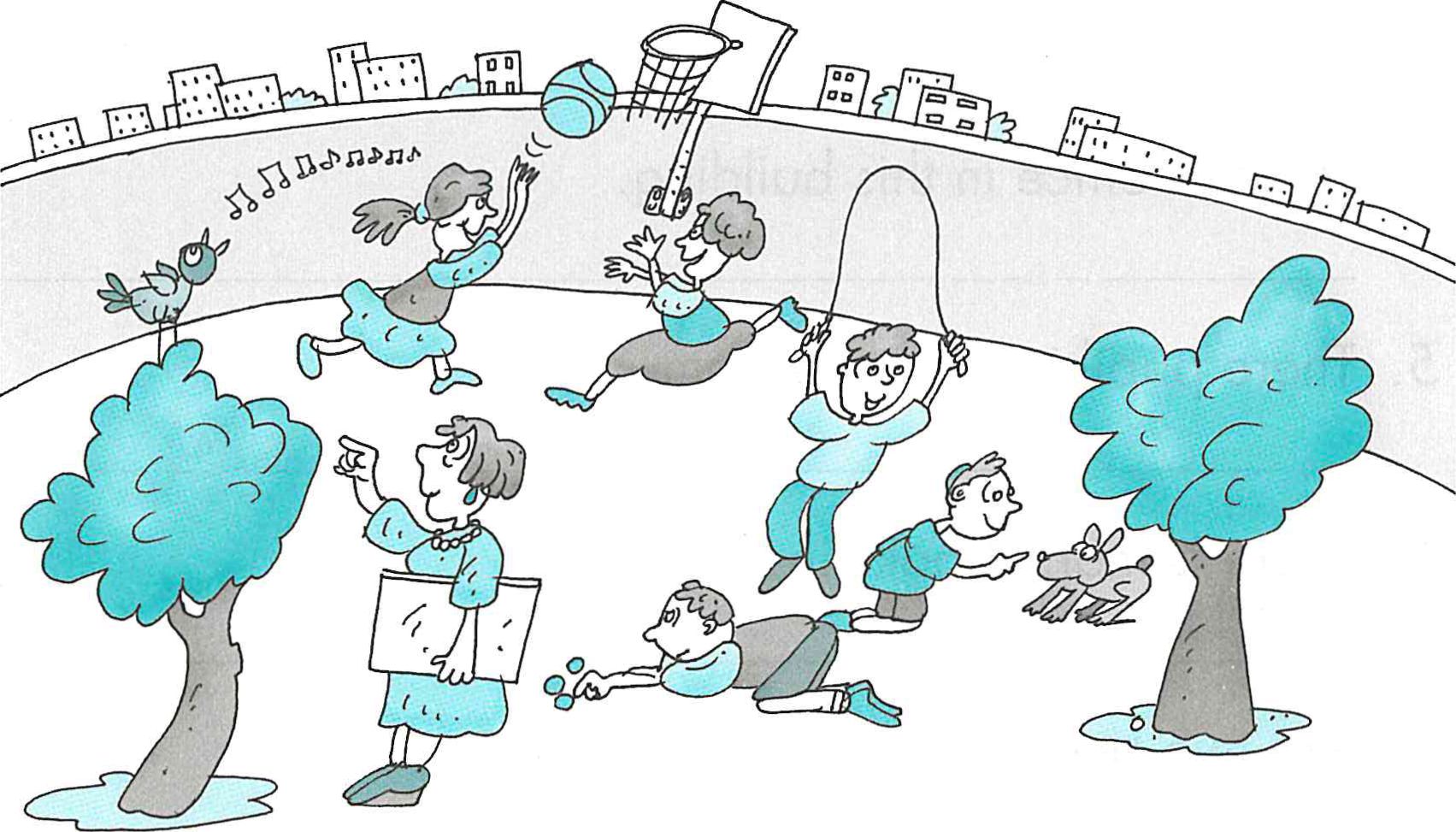
ילדים משחקים בחצר
a house, three boys, a man, a teacher, two trees, cats, flowers, a basketball, two girls, a dog, a car, a bird, a football
Positive sentences
1. There are two trees in the yard (חצר).
2.
--
on one tree.
3.
--
in the yard.
4.
--
in the yard.
Negative sentences
1. There aren’t any cats in the yard.
2.
--
in the yard.
3.
--
in the yard.
4.
--
in the yard.
*80*
9 Find the mistakes and correct them.
מצאו ותקנו את השגיאות במשפטים.
1. There is two donkeys in the yard.
There are two donkeys In the yard.
2. There is some coins in my pocket.
--
3. There are a banana on the plate.
--
4. There is office in this building.
--
5. There pupil in the classroom.
--
6. There is many books in my bag.
--
7. Are two beds in the room?
--
8. There is seven days in a week.
--
9. There not any flower in the vase.
--
--
11. There is a window in the room?
--
*81*
UNIT 9: REVIEW
1 Rewrite this passage. Use capital letters in the correct places.
כתבו מחדש את הקטע. שימו אותיות גדולות במקומות הנכונים.
my name is gili. i am 10 years old. i live in a moshav. there are cows, hens and donkeys in my moshav. dada is my dog. she’s a sweet dog. every saturday i take dada to my grandmother. grandmother lili loves dada. she gives her cookies.
My name is Gili.
--
--
2 Add a or the.
הוסיפו a או the.
1. I am a teacher.
2. There is
--
bike near the wall.
3.
--
man with the hat is my father.
5. Where is
--
key to this door?
6. Wow,
--
water is cold.
*82*
7.
--
sky is blue.
8. There is
--
white house near the bank.
9. Listen to
--
song on the radio. It’s so beautiful!
10. I love dogs. I want
--
little dog!
3 Add a or an.
הוסיפו a או an.
1. There is an orange tree in my yard.
2. This is
--
big school.
3. I see
--
apple on the tree.
4. There is
--
olive on the pizza.
5. This is
--
easy exercise.
6. They have
--
new baby.
7. I am
--
good pupil.
8. Nira is
--
nice girl.
10. Buy me
--
ice-cream cone (גביע גלידה), please!
4 Rewrite the sentences again. Use pronouns instead of the underlined words.
כתבו מחדש את המשפטים. השתמשו בשמות הגוף במקום המילים המסומנות.
1. Sarah is young.
She is young.
2. The children are at home.
--
3. The table is outside.
--
4. Bananas are yellow.
--
5. Tom and I are here.
--
6. My brother is two years old.
--
*83*
5 Complete the sentences with am, is or are.
השלימו את המשפטים בעזרת am, is או are.
1. We are late today.
2. I
--
not at school now.
3. Rona
--
not angry with you.
4. The frog
--
in the water.
5. There
--
two policemen near the car.
6. There
--
some toys on the floor.
7. You
--
my friends.
8. I
--
tall and thin.
9. Robin
--
my cousin.
10. The children
--
in the yard.
6 Complete the sentences with the negative form of am, is or are.
Use the short forms.
השלימו את המשפטים עם צורת השלילה של am, is או are השתמשו בצורות המקוצרות.
1. This is a rabbit.
It isn’t a dog!
or
It’s not a dog.
2. Anat is tall.
She
--
short.
or
She
--
short.
3. We are in Tel Aviv today.
We
--
in Jerusalem.
or
We
--
in Jerusalem.
4. You are sad.
You
--
happy.
or
You
--
happy.
5. I am at the mall (קניון) now.
I
--
at home.
*84*
6. The test is easy.
It
--
difficult.
or
It
--
difficult.
7. Sarit is my cousin.
She
--
my aunt.
or
She
--
my aunt.
8. Gadi is good in English.
He
--
as good in Arabic.
or
He
--
as good in Arabic.
9. It’s cold today.
It
--
warm at all.
or
It
--
warm at all.
10. We are thirsty.
We
--
hungry.
or
We
--
hungry.
7 Write the correct questions for the following answers.
חברו שאלות לתשובות הבאות.
1. Are you the new secretary?
Yes, I am the new secretary.
2.
--
Yes, Mr. Gadot is here.
3.
--
No, dinner isn’t ready. Please wait five minutes.
4.
--
No, I’m not at home now.
5.
--
Yes, Ben is a good pupil.
6.
Yes, Holon is a nice city.
*85*
8 Change these sentences into the plural.
הפכו את המשפטים לרבים.
1. This is a small house.
These are small houses.
2. That is a big glass.
--
3. There is a tomato in the salad.
--
in the salad.
4. He is a nice boy.
--
5. The book is on the shelf.
--
6. The black cat is under the chair.
--
7. The baby is in the bed.
--
8. There is a mouse in the kitchen.
--
in the kitchen.
9. The man with the knife is a butcher (קצב).
--
10. Is there a policeman in the school?
--
in the school?
*86*
9 Word Order
Put the words into the correct order.
כתבו את המילים בסדר הנכון. שימו לב לסימני שאלה.
1. a kiosk / at the corner / There / is
There is a kiosk at the corner.
2. tomatoes / red / There are / in the box / some
--
3. an airplane / in the sky / Look! / There is
--
4. many / in this class / There are / children / not
--
5. Are there / in the Dead Sea / fish /?
--
6. milk / in the fridge / Is there /?
--
--
8. in Eilat / dolphins / There are
--
9. in the jungle / Are / gorillas / there / ?
--
10. There aren’t / in this building / any / offices
--
*87*
UNIT 10: HAVE / HAS
באנגלית כאשר מספרים על דברים שיש למישהו משתמשים בפעלים have ו- has.
have, has
I have יש לי, You have יש לך, יש לכם, יש לכן, We have יש לנו, They have יש להם, יש להן, He has יש לו, She has יש לה, It has יש לו (לבעל חיים ולדומם)
באנגלית מתחילים עם שם האדם או שם הגוף ואז בא הפועל have או has.
דוגמה:
I have a computer.
Adi has a computer.
בעברית אפשר להתחיל עם המילה "יש" ואז לומר למי, או ההיפך.
תמיד משתמשים ב-"ל".
דוגמה: יש לעדי מחשב. או, לעדי יש מחשב.
באנגלית לא משתמשים ב-.to
דוגמה:
Adi has a computer.
זו טעות להגיד:
To Adi has a computer.
כך נראה מבנה המשפט עם has, have.
Subject נושא, Verb פועל, המשך המשפט
I, You, We, They, have, a test tomorrow., time., cookies., four legs.
He, She, It, has, a test tomorrow., time., cookies., four legs.
זיכרו!
באנגלית משתמשים בשם הגוף it לדומם או לבעל חיים שאינו מוכר לנו.
דוגמה:
Look at that ant. It has 10 legs.
Look at that building. It has 100 floors (קומות).
*88*
1 Put the words into the correct subject box.
שבצו את המילים במחסן במקום הנכון.
David, Dan and I, the dogs, Sarit, Avi, pupils, the dog, the computer, you and I, My parents
Subject, Verb, Rest of Sentence
1. Dan and I, have, white teeth.
2.
--
, have, white teeth.
3.
--
, have, white teeth.
4.
--
, have, white teeth.
5.
--
, have, white teeth.
Subject, Verb, Rest of Sentence
1. David, has, a virus
2.
--
, has, a virus.
3.
--
, has, a virus.
4.
--
, has, a virus.
5.
--
, has, a virus.
שימו לב!
Dan and I, you and I - we
the dogs, pupils, my parents - they
Sarit = she
Avi = he
the dog, the computer - it
*89*
2 Circle the correct answer.
הקיפו בעיגול את התשובה הנכונה.
1. Avi have / has :a red ball.
2. The monkey have / has a long tail.
3. We have /-has a big house.
4. Your sister have / has blue eyes.
5. I have /-has brown eyes.
6. The chair have /-has three legs.
7. Our neighbors have / has three kids.
9. My computer have / has a big screen.
10. Mrs. Tal have /-has blonde hair.
11. I have / has three cats.
12. This chair have / has only one leg.
13. I have / has a lot of homework today.
14. The Cohens have / has a new car.
15. We have / has a big family.
16. The dog have / has a very long tail.
17. You have / has a hole in your jeans.
*90*
3. Complete these sentences with have or has.
השלימו את המשפטים בעזרת have או has.
1. I have a birthday party today.
2. Some animals
--
four legs.
3. Birds
--
two legs.
4. That old man
--
a red bag.
5. That flower
--
a long stem.
6. Gad and I
--
a lot of homework.
7. My sister
--
long hair.
8. My cat
--
green eyes.
9. This car
--
only two doors.
10. My baby sisters
--
a lot of toys.
11. My brother
--
a new computer game.
12. The pupils
--
three tests every week.
13. Mr. Golan
--
a long nose.
14. I
--
a present for you!
15. The policeman
--
a blue shirt.
*91*
מה יש לכל אחד? הסתכלו בתמונה על מנת להשלים את שמות האנשים.
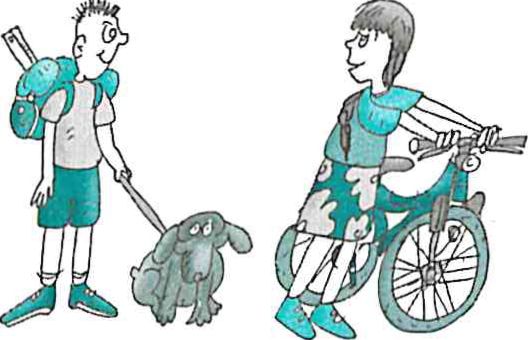
ילד עם תיק על הגב וכלב, ילדה ליד אופניים.
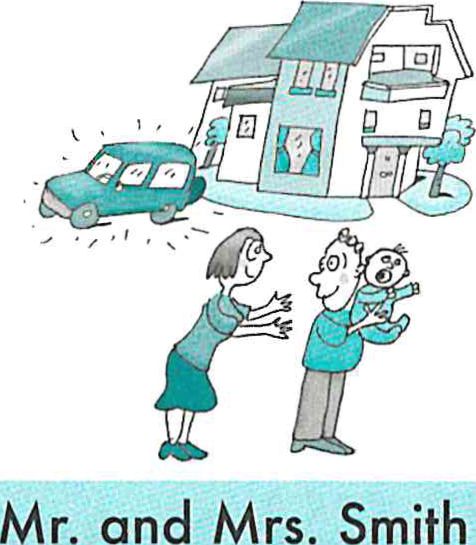
מר וגברת סמית עם התינוק שלהם ליד הבית, שם חונה גם המכונית שלהם
John, Mary, Mr. and Mrs. Smith
1. Mr. and Mrs. Smith have a big house.
2.
--
has a dog.
3.
--
have a new car.
4.
--
has a bicycle.
5.
--
has short hair.
6.
--
have a baby.
7.
--
has a big schoolbag.
8.
--
has a beautiful skirt.
9.
--
has long hair.
התבוננו בתמונה על מנת להשלים את המשפטים. השתמשו ב- have או has.
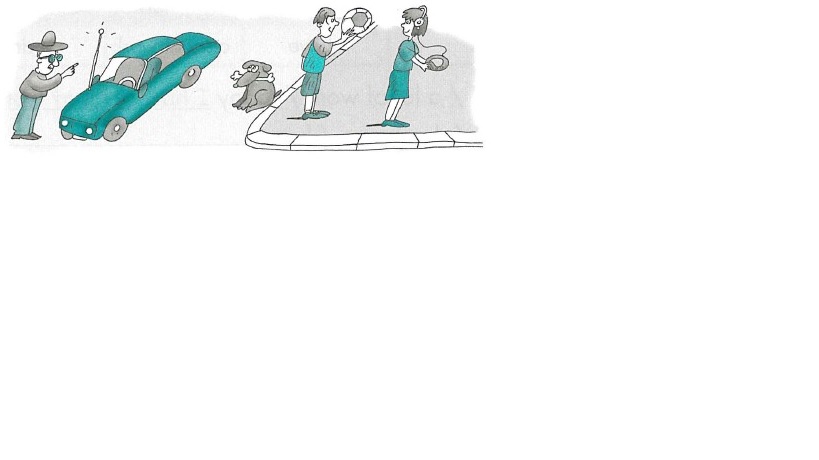
ילד שומעת מוזיקה על המדרכה, ילד משחק בכדור על המדרכה, כלב עם עצם בפה על הכביש, איש שמצביע על מכונית בכביש
1. The man has big sunglasses.
2.
--
--
a big hat.
3.
--
--
a football in his hand.
4.
--
--
a discman in her hand.
5.
--
--
a bone in its mouth.
6.
--
--
an antenna.
*92*
6. What is the next sentence? Match A and B.
התאימו A ל-B.
A
1. Ori is a bus driver. f
2. This is a lovely cat.
--
3. Dikla is twelve years old today.
--
4. Mr. Zohat is a doctor.
--
5. Dafna is a singer.
--
6. I am busy.
--
7. Mother is sick.
--
9. Bar is in her room.
--
B
a. It has beautiful eyes.
b. She has many fans.
c. She has a cold.
d. I have a test tomorrow.
e. She has lots of presents.
f. He has a green bus.
g. He has a white coat.
h. She has homework to do.
i. It has two tigers in it.
7 Word Order
Put the words into the correct order.
כתבו את המילים בסדר הנכון.
זיכרו את מבנה המשפט
who?, have or has, what?, המשך המשפט
I, have, a lot of work, today.
1. have / I / a lot of work / today
I have a lot of work today.
2. my dog / long ears / has
--
3. you / beautiful children / have
--
4. has / Yamit / great shoes
--
5. new neighbors / have / we
--
6. I / good news / have / for you
--
7. have / I / an idea
--
8. I / a good book / for you / have
--
*93*
8 a. Translate these sentences into English.
Use the table to help you.
תרגמו את המשפטים הבאים לאנגלית בעזרת הטבלה.
I, You, We, Dan, My dog, Edna, has, have, a lot of homework today., a good appetite., a lot of English books., a big car., money for a new computer., a big bone., new shoes., good ideas., a lot of questions today.
1. לעדנה יש נעלים חדשות.
Edna has new shoes
2. לכלב שלי יש תיאבון טוב.
--
3. יש לי הרבה שיעורי בית היום.
--
4. לדן יש מכונית גדולה.
--
5. יש לנו הרבה ספרי אנגלית.
--
6. לכלב שלי יש עצם גדולה.
--
7. יש לך רעיונות טובים.
--
8. יש לנו כסף למחשב חדש.
--
9. יש לך הרבה שאלות היום.
--
*94*
b. Translate these sentences into English.
Use the table to help you.
תרגמו את המשפטים הבאים לאנגלית בעזרת הטבלה.
Mother and I, My cat, Ron, I, My father, Dana, The Cohens, has have, a white tail., a new computer., time today., a big house., black hair., three brothers., pets at home.
1. לאבי יש שלושה אחים.
My father has three brothers
2. למשפחת כהן יש בית גדול.
--
3. לאמא ולי יש שיער שחור.
--
4. למשפחת כהן יש חיות מחמד בבית.
--
5. לחתולה שלי יש זנב לבן.
--
6. לרון יש מחשב חדש.
--
7. יש לי זמן היום.
--
8. לדנה יש בית גדול.
--
*95*
9 Read each pair of sentences. Circle the correct sentence.
קיראו כל זוג משפטים. הקיפו בעיגול את המשפט הנכון.
1. a. I am eleven years old.
b. I have eleven years old.
2. This is my first trip to France.
b. This has my first trip to France.
3. a. The kids are noisy.
b. The kids have noisy.
4. a. You are good marks in Math.
b: You have good marks in Math.
5. a. Look! She is so tall!
b: Look! She has so tall!
6. a. Listen, I am something nice to tell you.
b. Listen, I have something nice to tell you.
7. a. Where is your key?
b. Where has your key?
8. a. Tom is a lot to do.
b: Tom has a lot to do.
9. a. There has a good program on TV tonight.
b. There is a good program on TV tonight.
10. a. Fish is no hair.
b. Fish have no hair.
*96*
10 Find the mistakes and correct them. One sentence is correct.
מצאו ותקנו את השגיאות. משפט אחד נכון לחלוטין.
1. Michael have some goldfish.
Michael has some goldfish.
2. My bicycle is a flat tire.
--
3. My sister is two cats and a dog.
--
4. Sharon has very tall.
--
5. Beth have a new car.
--
6. Have three children in our family.
--
or
--
7. All dogs has four legs.
--
8. Sarit have many friends.
--
9. There have a new movie at the cinema tonight.
--
10. There has a supermarket at the corner of the street.
--
11. My sisters has a big room.
--
or
--
12. Gil and Erez has guitars.
--
*97*
13. Mr. Smith have a black car.
--
14. You has beautiful eyes.
--
15. The dogs has long tails.
--
16. The house has large windows.
--
17. I has a test today.
--
18. To Limor has a baby sister.
--
11 Test Yourself
Circle the correct answer. Use your teacher’s Answer Key to check your answers and give yourself 10 points for each correct one.
הקיפו את התשובה הנכונה. השתמשו בדף התשובות של המורה כדי לבדוק את תשובותיכם. תנו לעמצכם 10 נקודות על כל תשובה נכונה.
1. We have / has trees in our garden.
2. My uncle have / has a truck.
3. These cats have / has green eyes.
4. Miri have / has three pets at home.
5. Our neighbor have / has a blue car.
6. I am / have ten years old.
7. There are / have lemons on that tree.
8. You are / have a nice voice. You sing beautifully.
9. My brother is / has a soldier in the army.
10. The pupils are / have in the yard now.
My score:
--
/100
*98*
UNIT 11: POSSESSIVE
לעיתים קרובות אנו מספרים על דברים ששיכים לנו.
באנגלית יש כמה דרכים לתאר קשר של שייכות.
1. בעזרת הפועל have/has
דוגמה:
Ron has a dog.
2. בעזרת ‘s השייכות (פסיק עליון פלוס s)
דוגמה:
Ron’s dog
3. בעזרת תארי שייכות Possessive Adjectives
דוגמה:
his dog, my cat, your book
‘s השייכות ליחיד
כאשר רוצים לומר שמשהו שייך לאדם אחד, מוסיפים ‘s בסוף ה"אדם" (שם האדם או שם עצם שמציין אותו).
דוגמה:
הספר של רון Ron’s book
הספר של הילד The boy’s book
כך ננהג גם אם המשמו אינו חפץ.
דוגמה:
האבא של רון Ron’s father
הרעיון של רון Ron’s idea
שימו לב להבדלים בין אנגלית לעברית.
- באנגלית מתחילים עם בעל החפץ ואחריו בא החפץ ששייך לו או לה.
דוגמה:
Sivan’s computer, Her computer
- בעברית מתחילים תמיד בחפץ המשויך ואחריו בא בעל החפץ. תמיד משתמשים ב"של".
דוגמה: המחשב של סיון
- באנגלית בדרך כלל לא משתמשים ב-of.
דוגמה:
Sivan’s computer
ולא
The computer of Sivan.
*99*
1 Match the English to the Hebrew.
התאימו את הביטוי באנגלית לפירושו בעברית.
1. Dan’s dog
2. the boy’s schoolbag
3. the people’s money
4. Sima’s friends
5. the doctor’s clinic
6. the teacher’s car
a. המכונית של המורה
b. הכסף של האנשים
c. החברים של סימה
d. הילקוט של הילד
e. הכלב של דן
f. המרפאה של הרופא
s’ השייכות לרבים
כאשר רוצים לומר שמשהו שייך ליותר מאדם אחד, מוסיפים לבעלים רק פסיק עליון ‘ אחרי s של הרבים.
דוגמה:
האבא של הבנים - The boys’ father
אם אין s של הרבים מוסיפים ‘s (קודם פסיק עליון אחר כך s).
דוגמה:
האבא של הילדים - The children’s father
2 Translate these expressions into English. Use the word bank.
תרגמו את הביטויים לאנגלית. השתמשו במחסן המילים.
Sima, hair, the children, ball, the farmer, horse, the teacher, jacket, the girls, game, the pupils, tests, the teachers, room, the cat, eyes, Ben, pencil, father, watch
1. הסוס של האיכר the farmer’s horse
2. העיניים של החתול
--
3. המשחק של הבנות
--
*100*
4. העיפרון של בן
--
5. החדר של המורים
--
6. הכדור של הילדים
--
7. השיער של סימה
--
8. הז'קט של המורה
--
9. המבחנים של התלמידים
--
10. השעון של אבא
--
POSSESSIVE ADJECTIVES תארי שייכות
כדאי ללמוד את הרשימה הזו בעל פה.
my - שלי
your -שלך, שלך, שלכם, שלכן
his - שלו
her -שלה
its -שלו, שלה (בעלי חיים או דומם)
our -שלנו
their -שלהם, שלהן
שימו לב! גם פה מתחילים עם בעל החפץ (תאור השייכות) ואחריו בא החפץ ששייך לו או לה.
דוגמה:הבית שלי My house
its לא קיים בעברית. באנגלית משתמשים בו במקום his או her כאשר בעל החפץ אינו אדם - כלומר מסקום בעל חיים או דומם.
שימו לב! שאין בו פסיק עליון!!
דוגמה:
The bicycle’s tire - its tire
The cat’s tail - its tail
כאשר בעל חיים מוכר לנו, משתמשים ב- his או her.
דוגמה:
Blackie’s tail - his tail
Fifi’s tail - her tail
*101*
3 Match A and B.
התאימו בין A ל-B.
A
1. I c
2. she
--
3. we
--
4. he
--
5. it
--
6. you
--
7. they
--
B
a. their
b. its
c. my
d. his
e. your
f. our
g. her
4 Match A and B.
התאימו בין A ל-B.
1. The children’s ball c
2. The woman’s feet
--
3. The elephant’s trunk
--
4. My father’s car
--
5. The tiger’s eyes
--
6. The pupils’ notebooks
--
B
a. his car
b. their notebooks
c. their ball
d. her feet
e. its eyes
f. its trunk
*102*
5 Complete the sentences. Use my, your, his, her, or its.
השלימו את המשפטים. השתמשו ב- my, your, his, her, או its.
1. I have a new car. My new car is white.
2. You have a good teacher.
--
teacher likes children.
3. Julia has a hat.
--
hat is red.
4. This car has a good engine (מנוע).
--
engine is strong.
5. Ben has a horse.
--
horse is brown.
6. That cat has beautiful eyes.
--
eyes are green.
7. I have long hair.
--
hair is long.
6 Complete the sentences. Use my, your, his, her, its, our or their.
השלימו את המשפטים. השתמשו ב- my, your, his, her, או its, our, או their.
1. We have a TV. Our TV is new.
2. Keren has two sisters.
--
sisters are over there.
3. The children have a new ball.
--
ball is black and white.
4. Look at that computer!
--
screen is very big.
5. These girls have new T-shirts.
--
T-shirts are pretty.
6. Dalia has glasses.
--
glasses are new.
7. You have a test next week.
--
test is on Monday.
8. We have a new house.
--
house is nice.
9. I have a dog.
--
dog is very funny.
10. Nir has new shoes.
--
shoes are blue and white.
11. We have a big school.
--
school has fifty rooms.
12. Yoram has a sister.
--
sister is nice.
*103*
7 Match A and B. Then fill in the missing possessive adjective.
התאימו בין A ל-B. הוסיפו תארי שייכות.
A
1. David has a twin sister. e
2. Are these your glasses?
--
3. Look at that dog!
--
4. Jack has many friends.
--
5. My parents have a car.
--
B
a.
--
friends like him very much.
b. No,
--
glasses are over there.
c.
--
car is blue.
d.
--
tail is funny.
e.
--
name is Rona.
8 Test Yourself
These are not good English sentences. Rewrite them using ‘s or ‘. Use your teacher’s Answer Key to check your answers and give yourself 10 points for each correct one.
כתבו מחדש את המשפטים בעזרת ‘s או ‘ לפי הכללים שלמדתם.
השתמשו בדף התשובות של המורה כדי לבדוק את תשובותיכם.
תנו לעצמכם 10 נקודות על כל תשובה נכונה.
1. This is the room of Uri. This is
--
2. These are the shoes of Betty. These are
--
3. I see the car of my parents. I see
--
4. Look at the dog of the boys. Look at
--
5. The tail of the dog is long.
--
is long.
6. The classroom of the children is big.
--
is big.
7. The dresses of the girls are nice.
--
are nice.
8. The nose of the baby is cute (חמוד).
--
is cute.
9. The voice (קול) of the singer is good.
--
is good.
10. Look at the shirts of the pupils. Look at
--
My score:
--
/100
*104*
UNIT 12: PRESENT SIMPLE
Present Simple הוא זמן שמתאר פעולות שחוזרות על עצמן.
- פעולות יומיומיות, כמו לאכול, ללכת לבית הספר וכו'
דוגמה:
I go to school every day.
- הרגלים אישיים ומנהגים כליים
דוגמה:
I always drink cocoa in the morning.
We light candles on Friday night.
- עובדות ואמיתות טבע
דוגמה:
It rains in the winter.
Time Expressions
אלו הם ביטויי זמן שרומזים על Present Simple. ביטויים אלה באים לפני הפועל.
דוגמה:
I always listen to my parents.
always - תמיד
usually - בדרך כלל
every day - כל יום
often - לעיתים קרובות
sometimes - לפעמים
seldom - לעיתים רחוקות
never - אף פעם, לעולם לא
ביטויי זמן יותר ארוכים באים בסוף המשפט או ממש בתחילתו.
דוגמה:
I play basketball once a week
once a week - פעם בשבוע
twice a week - פעמיים בשבוע
three times a day - שלוש פעמים ביום
*105*
POSITIVE צורת החיוב
לפועל ב- Present Simpleיש שתי צורות בחיוב.
הצורה הראשונה היא Verb 1 - הצורה הבסיסית של הפועל.
אחרי כינויי הגוף I, you, we, they משתמשים ב- Verb 1ללא תוספות.
Subject, Verb 1
I, You, We, They, live, read, speak, brush
דוגמה:
I brush my teeth in the morning.
You live in Tel Aviv.
You and your friends live in Tel Aviv.
We speak English.
My sister and I speak Spanish too.
They read a newspaper every day.
My parents read books too.
1 Match A and B.
התאימו בין A ל-B.
A
1. We love to watch TV. c
2. Mr. and Mrs. Gordon live here.
--
3. The kids go to school everyday.
--
4. I love to drink cocoa.
--
5. We get up early.
--
6. I like computer games.
--
B
a. They have a big flat.
b. We get up at five o'clock.
c. We watch movies and sports.
d. I drink it every morning.
e. I play on my computer every day.
f. They go to school by bus.
*106*
2. Complete the sentences. Use verbs from the verb bank.
השלימו את המשפטים בעזרת פעלים ממחסן הפעלים.
buy, live, wear, eat, sleep, eat, speak, live, have
1. I live in Hadera.
2. We
--
a lovely cat.
3. You
--
English well.
4. Policemen
--
uniforms.
5. Monkeys
--
bananas.
6. Bears
--
in the winter.
7. Fish
--
in water.
8. We
--
matza at Passover (פסח).
9. I sometimes
--
flowers for my mother.
3 Translate these sentences into English. Use the table to help you.
תרגמו את המשפטים לעברית בעזרת הטבלה.
I, Lemon trees, We, You, My grandparents, Amir and Benny, grow, talk, live, understand, ride, speak, Hebrew and Arabic., in Jerusalem., me., their bikes every day., fast in the summer., on the phone every day.
1. אנחנו משוחחים בטלפון כל יום.
We talk on the phone every day.
2. סבא וסבתא שלי גרים בירושלים.
--
*107*
3. עצי לימון צומחים מהר בקיץ.
--
4. אמיר ובני רוכבים על האופניים שלהם כל יום.
--
5. אני מדבר עברית וערבית.
--
6. אתם מבינים אותי.
--
POSITIVE צורת החיוב
זוכרים שלפועל ב- Present Simple יש שתי צורות?
הצורה השנייה היא Verb 1 פלוס s - הצורה הבסיסית של הפועל בתוספת s.
אחרי כינויי הגוף he, she, it משתמשים ב- Verb 1 פלוס s.
Subject, Verb 1 פלוס s
He, She, It, lives, reads, speaks
דוגמה:
He lives in Jerusalem.
She speaks English and Hebrew.
It (the dog) sleeps in the garden.
שימו לב להבדל בין שתי הצורות.
Verb 1, Verb 1 פלוס s
I swim every day., He swims every day.
I play computer games., She plays computer games.
I live in a city., The tiger (It) lives in the jungle.
זיכרו! הפועל have משתנה ל- has בגופים he/she/it.
דוגמה:
I have a bicycle.
He has a bicycle too.
*108*
4 Circle the correct answer.
הקיפו בעיגול את התשובה הנכונה.
1. I live / lives in Bat Yam.
2. We meet / meets every morning.
3. The sun rise / rises every morning.
4. She always come / comes home at 1:00.
5. This dog like / likes milk.
6. My friends play / plays in the yard.
7. Doctors help / helps sick people.
8. Nadav play / plays the guitar.
9. We always have / has parties on Purim.
5 Read the first sentence and complete the second sentence.
Use the same verb.
קיראו את המשפט הראשון והשלימו את המשפט השני בעזרת אותו פועל.
1. I like music. Dan likes music too.
2. We read books. Omri
--
books too.
3. We eat apples with honey on Rosh Hashana. Idan
--
apples with honey every afternoon.
4. I swim in the pool. My uncle
--
in the sea.
5. I have blue eyes. Einat
--
green eyes.
6. You usually drink milk in the morning. The baby
--
milk four times a day.
7. I ride my bike to school. Noam
--
his bike to school too.
*109*
8. My neighbors have three dogs. My cousin
--
three dogs and two cats!
9. We buy meat at the supermarket. Aunt Edna
--
meat in the market.
10. I eat lunch at two o'clock. My father
--
lunch at three o'clock.
6 Complete the sentences. Use the verbs in brackets.
השלימו את המשפטים בעזרת הפעלים בסגריים.
1. Bears love honey. (love)
2. Dolphins
--
children. (like)
3. Penguins
--
in cold places. (live)
4. Susan never
--
the guitar. (play)
5. Yael
--
delicious cookies (עוגיות טעימות). (bake)
6. My cousin sometimes
--
me letters. (write)
7. Billy
--
two sisters. (have)
8. This classroom
--
ten tables. (have)
9. That little boy always
--
behind a tree. (hide)
10. We sometimes
--
in the evening. (meet)
*110*
SPELLING כללי איות
זוכרים את הצורה השנייה של ה-Present Simple?
he, she, it - verb 1 פלוס s
כאשר הפועל מסתיים באותיות z, o, x, sh, ch, s מוסיפים es במקום s לפועל.
s, ch, sh, x, o, z, פלוס es
דוגמה:
I brush my hair in the morning.
He brushes his hair in the morning.
You go to school every day.
Dan goes to school every day.
7 Add the correct verb form for he, she, it. Choose s or es.
הוסיפו את הצורה הנכונה שמתאימה ל-he, she, it. בחרו s או es.
I, you, we, they, he, she, it
1. do, does
2. kiss,
--
3. watch,
--
4. jump,
--
5. mix,
--
6. catch,
--
7. stand,
--
8. dress,
--
9. dance,
--
10. wash,
--
*111*
SPELLING כללי איות
זוכרים את הצורה השנייה של ה-Present Simple?
he, she, it פלוס verb 1
כאשר הפועל מסתיים ב-y ולפניה אות עיצורית (רגילה לא ניקוד), מורידים את ה-y ובמקומה כותבים ies.
עיצור פלוס y, ies
דוגמה:
I study English.
He studies Arabic.
אם לפני ה-y יש אות ניקוד (a, e, i, o, u) אנו פשוט מוסיפים s.
ay, ey, iyt, oy, uy, פלוס s
דוגמה:
I play tennis.
Dana plays tennis.
למדנו את כללי האיות הללו בהקשר ליחיד - רבים זוכרים?
8 Add the correct verb form for he, she, it. Choose s, es, or ies.
הוסיפו את הצורה הנכונה שמתאימה ל-he, she, it. בחרו s, es או ies.
I, you, we, they, he, she, it
1. buy, buys
2. cut,
--
3. clean,
--
4. wash,
--
5. finish,
--
6. go,
--
7. do,
--
8. cry,
--
9. try,
--
*112*
I, you, we, they, he, she, it
10. see,
--
11. teach,
--
12. fix,
--
13. sing,
--
14. stay,
--
15. play,
--
16. fly,
--
The verb to be (am, are, is) in the Present Simple
תזכורת! באנגלית משתמשים בפועל to be לתיאור מישהו או משהו.
דוגמה:
I go to school.
I am ten years old.
We play here.
We are here every day.
He works in a hospital.
He is a doctor.
9 Translate these sentences into English. Use the table to help you
תרגמו את המשפטים לעברית בעזרת הטבלה.
He, Mali, She, You, Oren, I, are, teaches, is, play, am, likes, a good teacher., English., tall., a singer., music., a good friend., basketball.
1. מלי מורה טובה.
Mali is a good teacher.
2. היא מלמדת אנגלית.
--
*113*
3. אתה חבר טוב.
--
4. אורן זמר.
--
5. הוא אוהב מוסיקה.
--
6. אני גבוה.
--
7. אני משחק כדורסל.
--
10 Complete the paragraph with the verbs in brackets.
השלימו את הפיסקה בעזרת הפעלים בסוגריים.
Orit is my best friend. She (1) lives (live) in France. She (2)
--
(be) ten years old. She (3)
--
(go) to a school near her house. She (4)
--
(study) English five days a week. She is at school until 4 o’clock.
She (5)
--
(say) Paris (6)
--
(be) a very beautiful city but she (7)
--
(miss) Israel.
Orit (8)
--
(come) to Israel every summer with her family. She (9)
--
(visit) her grandparents and fiends. She (10)
--
(want) to stay in Israel.
*114*
NEGATIVE צורת השלילה
with I, you, we, they
באנגלית כאשר מתארים פעולות שגרתיות, הרגלים ומנהגים שאנו לא עושים, משתמשים בפעלי עזר don’t, doesn’t.
אחרי I, you, we, they משתמשים ב- don’tואחריו הפועל העיקרי בצורת .verb 1
Subject נושא המשפט, פועל עזר, verb 1 הפועל העיקרי בצורת, המשך המשפט
I, You, We, They, don’t, live, in England.
גם עם הפועל have, כדי לספר על דברים שאין לנו משתמשים בצורה don’t have.
דוגמה:
I have - יש לי
I don’t have - אין לי
You have - יש לך
You don’t have - אין לך
We have - יש לנו
We don’t have - אין לנו
They have - יש להם
They don’t have - אין להם
11 Match A and B. Make your own sentences. Write the complete sentences on the next page. (There is more than one correct answer for each animal.)
התאימו בין A ל-B. כתבו את המשפטים השלמים בעמוד הבא. ישנן כמה אפשרויות לכל חיה.
A
1. Tigers
2. Ants
3. Horses
4. Crocodiles
5. Cows
6. Cats
B
a. don’t live at home.
b. don’t swim.
c. don’t give milk.
d. don’t live in zoos.
e. don’t fly.
f. don’t have long tails.
*115*
1. Tigers don’t swim.
or
Tigers don’t fly.
2.
--
3.
--
4.
--
5.
--
6.
--
12 Rewrite the sentences. Use the words in brackets and the negative form of the verbs.
כתבו מחדש את המשפטים. השתמשו במילים בסוגריים ובצורת השלילה של הפעלים.
1. I have brown hair. (red) I don’t have red hair.
2. We speak Hebrew. (Chinese)
--
3. I have a bike. (car)
--
4. My friends play Monopoly. (chess)
--
5. Cows give milk. (water)
--
6. My neighbors have a cat. (dog)
--
7. We sing songs in English. (Japanese)
--
8. My parents go to a movie once a month. (every day)
--
9. In Israel it rains in the winter. (summer)
--
10. My brother and I have a computer in our room. (TV)
--
*116*
13 Translate the sentences into English. Use the table to help you.
תרגמו את המשפטים לאנגלית בעזרת הטבלה.
I, We, My friends, Teachers, Your pupils, don’t, have, teach, do, clean, ride, go, my bike, homework, kids, a test, their rooms, to a party, every day., every week., in the afternoon., in the summer.
1. אני לא רוכב על האופניים שלי כל יום.
I don’t ride my bike every day.
2. התלמידים שלך לא מכינים שיעורי בית כל יום.
--
3. מורים לא מלמדים ילדים בקיץ.
--
4. אין לנו מבחן כל שבוע.
--
5. החברים שלי לא מנקים את החדרים שלהם כל יום.
--
6. אני לא מכין שיעורי בית אחה"צ.
--
7. אנחנו לא הולכים למסיבה כל שבוע.
--
*117*
NEGATIVE צורת השלילה
with he, she, it
אחרי he, she, it משתמשים ב- doesn’tואחריו הפועל העיקרי בצורת verb 1. (does "גנב" את ה-s מהפעלים ב- he, she, it).
שימו לב! בשלילה, לפועל העיקרי אין s.
Subject נושא המשפט, פועל עזר, verb 1 הפועל העיקרי בצורת, המשך המשפט
He, She, It, doesn’t, live, in England.
14 Match A and B. Write the complete sentences below.
התאימו בין A ל-B. כתבו את המשפטים השלמים למטה.
A
1. The TV c
2. My baby brother
--
3. This dog
--
4. The moon
--
5. The sun
--
B
a. doesn’t shine at night.
b. doesn’t shine in the afternoon.
c. doesn’t work. Please fix it.
d. doesn’t like dog food.
e. doesn’t cry.
1. The TV doesn’t work. Please fix it.
2.
--
3.
--
4.
--
5.
--
*118*
15 Circle the correct answer.
הקיפו בעיגול את התשובה הנכונה.
1. I don’t / doesn’t speak Japanese.
2. Tom don’t / doesn’t have a sister.
3. We don’t / doesn’t have a party every week.
4. Sima don’t / doesn’t ride a bike to school.
5. Mr. Green don’t / doesn’t work.
6. The kids don’t / doesn’t make noise.
7. You don’t / doesn’t like trips.
8. Snakes don’t / doesn’t have legs.
9. The sun don’t / doesn’t shine at night.
10. I don’t / doesn’t run quickly.
16 Complete the sentences. Use the negative form of the verb.
השלימו את המשפטים. השתמשו בצורת השלילה של הפועל.
1. Idan drinks coffee. He doesn’t drink tea
2. This dolphin lives in the sea. It
--
in a pool (בריכה).
3. Dan speaks English. He
--
German.
4. My father reads magazines. He
--
books.
5. Shelly plays basketball. She
--
football.
6. My mother drives our car. She
--
a taxi.
7. Sam eats vegetables. He
--
meat.
8. A fisherman catches fish. He
--
birds.
9. My doctor helps sick people. He
--
sick animals
10. That nurse works in a clinic. She
--
in a hospital (בית חולים).
11. Ziva walks four kilometers every day. She
--
forty kilometers!
*119*
17 Complete the sentences.
Use the negative form of the Present Simple.
השלימו את המשפטים. השתמשו בצורת השלילה של ה- . .Present Simple
1. I don’t like soda. (not like)
2. Adi
--
in the morning. (not run)
3. Uzi
--
a car. (not drive)
4. The Cohen family
--
here now. (not live)
5. We
--
a test today. (not have)
6. Father
--
the dishes after breakfast. (not wash)
7. Frogs
--
meat. (not eat)
8. Babies
--
to school. (not go)
9. Boaz
--
well. (not sing)
10. Golan
--
hats. (not wear)
11. My parents
--
at night. (not work)
12. Miri
--
melon. (not like)
*120*
YES / NO QUESTIONS שאלות כן / לא
with I, you, we, they
באנגלית כאשר שואלים שאלה ב- Present Simpleמתחילים עם פועל העזר Do או Does.
אחרי I, you, we, they משתמשים ב-Do. אחרין בא כינוי הגוף ואחריו הפועל העיקרי בצורת Verb 1.
זהו מבנה השאלה:
פועל עזר, Subject נושא המשפט, verb 1 הפועל העיקרי בצורת, המשך המשפט
Do, I, you, we, they, live, have, in England?, time?
דוגמה:
Do you live in England?
Do you have time?
כשאנו נשאלים שאלות כן / לא, אנו יכולים לענות בקצרה.
Do you like coffee? Yes, I do., No, I don’t.
Do you eat meat? Yes, we do., No, we don’t.
18 Translate the questions into English. Use the table to help you.
תרגמו את השאלות. השתמשו בטבלה.
Do, you, they, we, I, the children, have keys, always make noise, wear uniforms (תלבושת אחידה) in this school, live in Tel Aviv, look alright (בסדר), ?
*121*
1. האם אתה גר בתל אביב?
--
2. האם יש לנו מפתחות?
--
3. האם אני נראה בסדר?
--
4. האם הם לובשים תלבושת אחידה בבית ספר הזה?
--
5. האם הילדים תמיד עושים רעש?
--
19 Answer questions about yourself.
Choose Yes, I do or No, I don’t.
ענו על השאלות לגביכם. השתמשו ב- Yes, I do או No, I don’t.
1. Do you live i n Israel? Yes, I do.
2. Do you have sisters and brothers?
--
3. Do you play in the afternoon?
--
4. Do you have a cat?
--
5. Do you watch TV every day?
--
6. Do you like pop music?
--
7. Do you have a hobby?
--
*122*
8. Do you go to school on Fridays?
--
9. Do you wear jeans to school?
--
10. Do you eat fish?
--
11. Do you read books?
--
12. Do you cook every day?
--
13. Do you fly a helicopter?
--
YES / NO QUESTIONS שאלות כן / לא
with he, she, it
כאשר שואלים לגבי he, she, it, משתמשים ב-Does.
אחרין בא הנושא ואחריו הפועל העיקרי בצורת Verb 1 (בלי s).
זהו מבנה השאלה:
פועל עזר, Subject נושא המשפט, verb 1 הפועל העיקרי בצורת, המשך המשפט
Does, he, she, it, speak, read, English?
דוגמה:
Does Gil speak English?
Does he read English too?
שימו לב!
בשאלות אין לפועל העיקרי s. (does "גנב" אותו).
כשאנו נשאלים שאלות כן / לא, אנו יכולים לענות בקצרה.
דוגמה:
Does he speak English? Yes, he does., No, he doesn’t.
Does the school have a pool? Yes, it does., No, it doesn’t.
*123*
20 Put these words next to the correct helping verb.
שבצו את המילים במקום הנכון. מי מהנושאים יקבל Do ומי יקבל Does?
he, the zebra, my friends, Shira, milk, boys and girls, you, Mr. Kaplan, we, the students, TV, mother, Anat and Dina, the stars
Do. my friends …?
Do
--
…?
Do
--
…?
Do
--
…?
Do
--
…?
Do
--
…?
Do
--
…?
Does
--
…?
Does
--
…?
Does
--
…?
Does
--
…?
Does
--
…?
Does
--
…?
Does
--
…?
*124*
21 Match the answer to the question.
התאימו את התשובה לשאלה.
A
1. Do lions live in igloos? c
2. Does your school have a swimming pool (בריכת שחיה)?
--
3. Does a good pupil do homework?
--
4. Do clowns have funny clothes?
--
B
a. Yes, they do.
b. Yes, he / she does.
c. No, they don’t.
d. No, it doesn’t.
22 Circle the correct answer.
הקיפו בעיגול את התשובה הנכונה.
1. Do / Does you work in an office (משרד)?
2. Do / Does he have blue eyes?
3. Do / Does teachers write on the blackboard?
4. Do / Does a dog understand people?
5. Do / Does your friends help you?
6. Do / Does your grandma have white hair?
7. Do / Does elephants eat meat?
8. Do / Does a bird fly?
9. Do / Does you like funny movies?
10. Do / Does Peter have many books?
*125*
23 Complete the questions. Use Do or Does.
השלימו את השאלות. השתמשו ב- Do או Does.
1. Do you buy bread every day?
2.
--
your neighbors like you?
3.
--
a turtle have a house on its back?
4.
--
policemen wear uniforms?
5.
--
Aviv run every night?
6.
--
Mr. Levy work here?
7.
--
cats run after (רודפים אחרי) mice?
8.
--
this teacher teach French?
9.
--
it rain here in the summer?
10.
--
Efrat have blond hair?
11.
--
we have homework for tomorrow?
12.
--
your friends play with you?
*126*
24 Word Order
Put the words into the correct order for Yes / No questions.
Add Do or Does at the beginning of each question.
סדרו את המילים לשאלות כן / לא. הוסיפו Do או Does בתחילת כל שאלה.
1. you / live / in a city /?
Do you live in a city?
2. you / chocolate / love / ?
--
3. Avi / a bike / have /?
--
4. Sarit / to your school / go / too /?
--
5. they / in their garden / have / flowers /?
--
6. you / with your left hand / write /?
--
7. Dror / glasses / wear / ?
--
8. they / eat / fruit / on Tu'Bishvat /?
--
9. clowns / in circuses / work /?
--
10. you / lunch / at one o'clock / eat /?
--
*127*
25 Complete the dialogue. Use the questions in the box.
השלימו את הדו-שיח. היעזרו במחסן השאלות.
Do you want to meet my friends?
How are you?
Do you like this school?
Where do you come from?
Do you have many friends?
Asaf is talking to Erez, the new pupil in his class.
Asaf: Hi, Erez.
--
Erez: I’m OK, thanks.
Asaf:
--
Erez: I come from Nahariya.
Asaf:
--
Erez: Yes, I like this school. The teachers are nice to me.
Asaf:
--
Erez: No, I don’t have many friends.
Asaf:
--
Erez: Of course I’d like to meet them.
Asaf: So come to my house at five o'clock and I will introduce you to my friends. They are very nice.
Erez: Thanks, Asaf. That’s very kind of you.
*128*
26 Complete the story. Use the verbs in brackets.
השלימו את הפעלים בסיפור בעזרת הפעלים שבסוגריים.
Ravit
Ravit is ten years old. She (1) has (have) two little brothers - Ami and Ben. Ravit’s parents (2)
--
(work) very hard. They (3)
--
(come) home late every evening. In the morning Mother (4)
--
(take) Ami and Ben to their kindergarten. At one-thirty, Ravit (5)
--
(bring) them back home.
She (6)
--
(feed ) them. Then they (7)
--
(watch) TV and Ravit (8)
--
(do) her homework. In the afternoon she (9)
--
(play) with them. Sometimes she (10)
--
(go) to the park with them. She (11)
--
(not have) time for her friends.
And what about you?
(12)
--
you also (13)
--
(take care of your brothers or sisters?
(14)
--
you also (15)
--
(have) no time for your friends in the afternoon?
*129*
UNIT 13: PREPOSITIONS OF TIME
מילות יחס שקשורות לזמן מספרות מתי מתרחשים הדברים.
כאשר מספרים באיזה יום קורה משהו משתמשים במילת היחס on.
דוגמה:
We have an English lesson on Sunday.
On: Sunday, Monday, Tuesday, Wednesday, Thursday, Friday, Saturday
כאשר משהו חוזר על עצמו כל פעם באותו יום, מוסיפים לשם היום s.
דוגמה: אנו לומדים אנגלית בימי ראשון
We study English on Sundays.
The Days of the Week ימות השבוע
Sunday - יום ראשון
Monday - יום שני
Tuesday - יום שלישי
Wednesday - יום רביעי
Thursday - יום חמישי
Friday - יום שישי
Saturday - יום שבת
זכרו! שמות הימים מתחילים באות גדולה.
*130*
at: ten, twelve-thirty, half past ten, six fifteen, noon, seven, midnight, nine o'clock
דוגמה: המסיבה בשמונה
The party is at eight.
הסרט נגמר בעשר וחצי
The movie ends at ten-thirty.
שימו לב!
כאשר רוצים לציין גם שעה וגם יום, משתמשים ב-at וגם ב-on.
דוגמה:
המסיבה בשמונה ביום שישי.
The party is at eight on Friday.
TALKING ABOUT THE TIME
איך מדברים על השעה?
כאשר מציינים שעה עגולה, אפשר להגיד רק המספר או אפשר להוסיף o’clock. (ביטוי זה לא קיים בעברית.)
דוגמה: השעה עשר
It’s ten.
או
It’s ten o'clock.
אם השעה לא עגולה, אפשר פשוט לציין את הספרות.
דוגמה:
ten twenty-five -10:25
ten fifteen - 10:15
ויש גם דרך נוספת.
השעה עשר ורבע
It’s a quarter past ten.
השעה עשר וחצי
It’s half past ten.
השעה רבע לעשר
It’s a quarter to ten.
*131*
כאשר מספרים באיזה חודש, באיזה עונה או באיזה שנה משהו קורה, משתמשים במילת היחס in.
in: January, March, the winter, May, 2006, 1995, the summer, August
דוגמה:
I was born in 1995.
My birthday is in January.
We go to the sea in the summer.
The Months of the Year - חודשי השנה
January - ינואר
February - פברואר
March - מרץ
April - אפריל
May - מאי
June - יוני
July - יולי
August - אוגוסט
September - ספטמבר
October - אוקטובר
November - נובמבר
December - דצמבר
זכרו! שמות החודשים מתחילים באות גדולה.
*132*
THE YEAR - השנה
שימו לב כיצד אומרים שנים באנגלית.
על מנת שיהיה קל יותר, מחלקים את השנה לשני חלקים:
דוגמה:
nineteen sixty seven - 1967
אומרים 19 ואז 67.
fourteen ninety two - 1492
אומרים 14 ואז 92
לגבי שנות 2000, לא נהוג לחלק.
דוגמה:
two thousand - 2000
two thousand and five - 2005
DATES - תאריכים
כאשר מציינים את התאריך בחודש (יום מסוים), משתמשים במילת היחס on (כמו עם ימות השבוע). המספרים הופכים למספרים סידוריים (ordinal numbers).
דוגמה:יום ההולדת שלי הוא ב- 15 בינואר.
My birthday is on the 15th of January.
כאשר כותבים תאריך משתמשים בצורה מקוצרת של מספרים אלה.
the first, the 1st, הראשון
the second, the 2nd, השני
the third, the 3rd, השלישי
the fourth, the 4th, הרביעי
the fifth, the 5th, התמישי
מכאן ואילך עד 20 כולם מקבלים th.
the twenty first, the 21st, העשרים ואחד
the twenty second, the 22nd, העשרים ושתיים
the twenty third, the 23rd, השערים ושלוש
שימו לב לביטויים אלה:
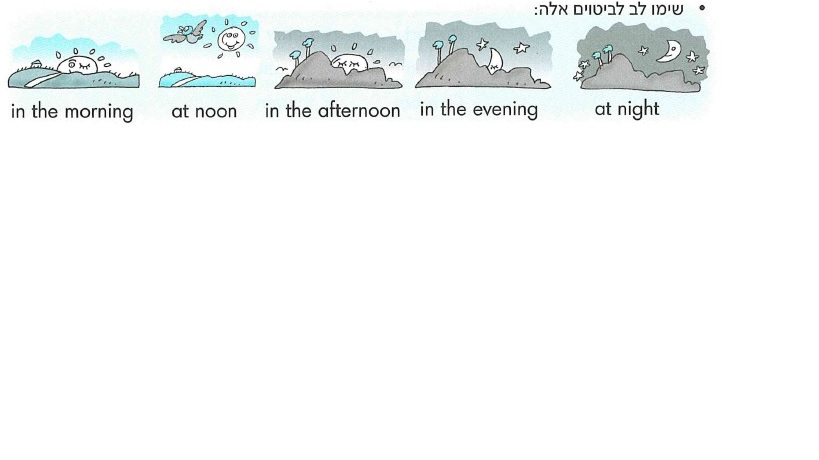
שמש וירח לאורך שעות היום
in the morning, at noon, in the afternoon, in the evening, at night
זיכרו!
לימים - on
לחודשים, שנים - in
לשעות - at
לתאריך (יום) - חודש - on
*133*
1 Put the time expressions into the correct boxes
כתבו כל ביטוי זמן במשבצת הנכונה.
the afternoon, 6 o’clock, the 1st of September, Monday, noon, the evening, night, May, 2006, 2:45, the morning, Sunday, July, the 10th of March, ten
in, on, at
the afternoon,
--
,
--
--
,
--
,
--
--
,
--
,
--
2 Circle the correct answer.
הקיפו בעיגול את התשובה הנכונה.
1. I get up in / on / at seven every morning.
2. The meeting is in / on / at Saturday.
3. There is a football game in / on /`at 5 o’clock.
4. In / On,/ At Tuesdays I go to my music lesson.
5. In / On / At 1492 Columbus discovered America.
6. There is a good movie on TV in / on / at 7:30.
7. Our class trip is in / on / at May.
8. The Olympic games are in on / at 2010.
*134*
9. We always meet in / on / at the afternoon.
10. I drink cocoa in / on / at the morning.
11. Let’s meet in / on / at 12 o’clock today.
12. My English test is in / on / at the 10th of April.
13. I was born in / on / at 1963.
14. The summer holiday is in / on / at July and August.
15. School begins in / on / at 8 o’clock.
16. Let’s meet in / on / at the evening.
17. We have lunch exactly in / on / at 12 o’clock.
18. We have a party in / on / at eight in / on / at Thursday night.
19. It rains a lot in / on / at the winter.
20. Sarah has tennis lessons in / on / at Sundays and Wednesdays.
3 Match the numbers to the words.
התאימו בין הספרות למילים
1. 1948 d
2. 1878
--
3. 1395
--
4. 2010
--
5. 1784
--
6. 1965
--
7. 2006
--
8. 1999
--
a. two thousand and six
b. eighteen seventy-eight
c. seventeen eighty-four
d. nineteen forty-eight
e. nineteen ninety-nine
f. two thousand and ten
g. thirteen ninety-five
h. nineteen sixty-five
*135*
4 Complete each sentence with the correct preposition. Use in, on, or at.
השלימו את המשפטים בעזראת מילת היחס המתאימה. השתמשו ב- in, on או at.
1. The movie is at 8 o’clock.
2. My driving test is
--
the 13th of January.
3. Is the test
--
Sunday or
--
Monday?
4. My dad’s birthday party is
--
Friday
--
ten o'clock.
5. I was born
--
1995.
6. I usually have a sandwich
--
noon.
7. She doesn’t go out
--
night.
8. They like to play with their friends
--
the afternoon.
5 a. Translate these sentences. Use the table to help you.
תרגמו את המשפטים הבאים בעזרת הטבלה.
My brother's birthday is, My parents go to sleep, I have Judo, It’s hot, Passover is, on, in, at, midnight., Monday afternoon., the first of May., the summer., April this year.
1. לאחי יש יום הולדת בראשון למאי.
My brother’s birthday is on the first of May.
2. ההורים שלי הולכים לישון בחצות.
--
3. יש לי ג'ודו ביום שני אחר הצהרים.
--
4. חם בקיץ.
--
5. פסח חל בחודש אפריל השנה.
--
*136*
b. Translate these sentences. Use the table to help you.
תרגמו את המשפטים הבאים בעזרת הטבלה.
We, My sister, The end-of-year party, The first day of school, The show, is, have, was born, in the evening., in 1985., a meeting on Wednesday at 6:00., on the first of September., on the 30th of June.
1. יש לנו פגישה ביום רביעי בשעה שש.
--
2. מסיבת סוף השנה היא ב-30 ליוני.
--
3. היום הראשון ללימודים הוא ב-1 לספטמבר.
--
4. המופע הוא בערב.
--
5. אחותי נולדה ב-1985.
--
6 Find the mistakes and correct them.
מצאו ותקנו את השגיאות במשפטים.
1. I get up on 7 o’clock every morning.
I get up at 7 o’clock every morning.
2. The wedding (חתונה) is in the 7th of March.
--
3. My birthday is in Sunday.
--
4. Please come in 8 o’clock.
--
5. At 2000 I was five years old.
--
*137*
6. We meet in Wednesdays.
--
7. He was born on 1963.
--
7 TEST YOURSELF
Fill in the correct prepositions in the conversations.
Use your teacher’s Answer Key to check your answers and give yourself 10 points for each correct one.
השלימו את השיחה בעזרת מילת היחס המתאימה. השתמשו בדף התשובות של המורה כדי לבדוק את תשובותיכם. תנו לעצמכם 10 נקודות על כל תשובה נכונה.
1. What time is the test tomorrow?
It’s
--
nine o’clock.
2. What time do you get up
--
the morning?
I usually get up
--
7 o’clock.
3. When is your birthday?
It’s
--
April.
What date?
It’s
--
the 10th of April.
4. When is our summer vacation (חופשה)?
It’s
--
July and August.
5. Do you like to play football?
Yes, I play
--
Mondays and Thursdays.
6. How old is your father?
I think he was born
--
1975.
7. Do you like to sleep
--
the afternoon?
No, but I sleep ten hours
--
night.
My score:
--
/ 100
*138*
UNIT 14: PRESENT PROGRESSIVE
באנגלית כאשר אנו רוצים לתאר משהו זמני, שקורה עכשיו, ברגע זה, בשבוע זה, בחודש זה, או בשנה זו, משתמשים ב-.Present Progressive
דוגמה:
I am reading right now.
Time Expressions
אלו הם כמה מביטויי הזמן שרומזים על ה-:Present Progressive
this morning - הבוקר
this week - השבוע
this month - החודש
this year - השנה
now - עכשיו
at this moment - ברגע זה
today - היום
tonight - הלילה, הערב
דוגמה:
We are learning English this year.
כאשר משפט מתחיל במילים Look! או Listen! ברור שמתיחסים למשהו שקורה עכשיו. לכן גם במקרים אלו משתמשים ב-.Present Progressive
דוגמה:
Listen! That bird is singing.
כיצד מורכב הפועל ב-?Present Progressive
הפועל מורכב משני חלקים:
1. פועל עזר ממשפחת to be (am, is ,( are
2. הפועל העיקרי בתוספת ing.
נסו לדמות את ה- am, is, are מצד אחד, ואת ה- ingמצד שני כשתי משקולות והפועל העיקרי באמצע.
לא יהיה איזון אם נשכח את אחת המשקולות!
דוגמה:
I am listening.
הנה לדוגמה הפועל drink בגופים השונים.
I, am drinking, now.
He / She / It, is drinking, now.
You / We / They, are drinking, now.
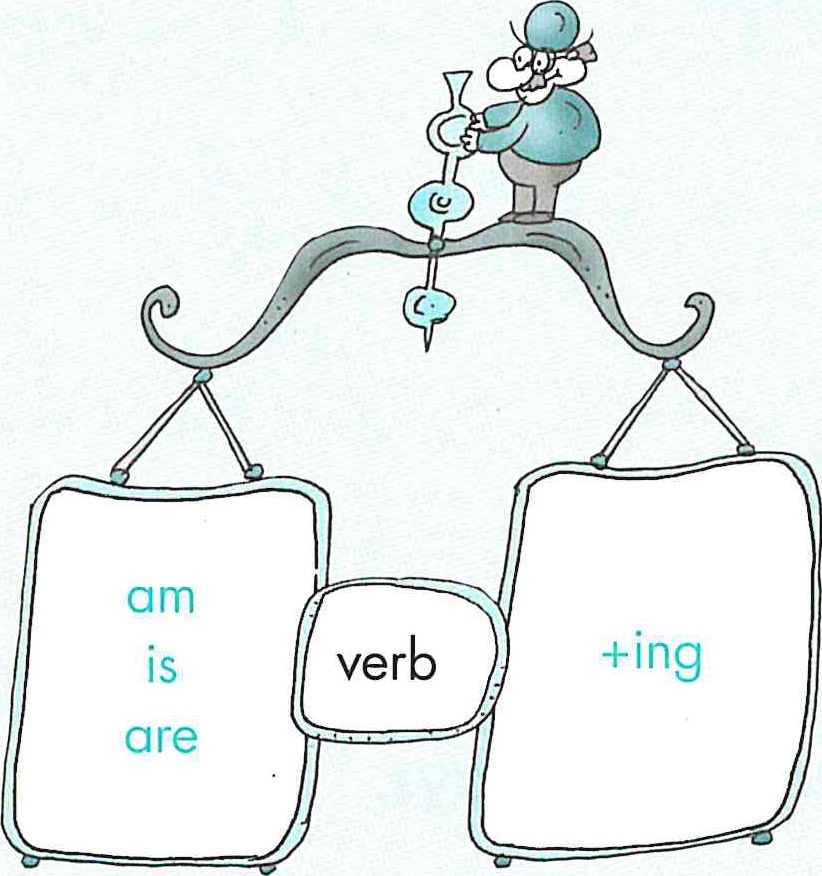
מאזניים עם איש עליהם שבצד אחד כתוב am\ is\ are. בצד השני כתוב +ing ובעמצע verb
*139*
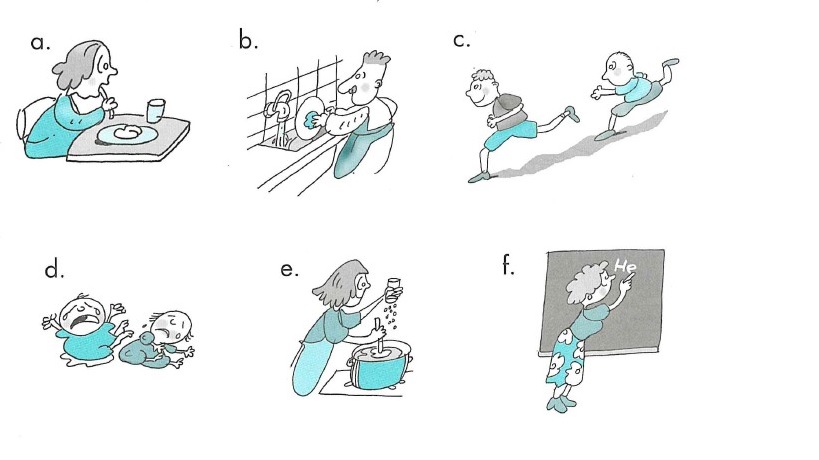
אישה אוכלת, איש שוטף כלים, שני ילדים רצים, שני ילדים בוכים, אישה מוזגת שתיה, אישה כותבת על הלוח
a.
b.
c.
d.
e.
f.
1. The boys are running. c
2. The girl is eating.
--
3. The babies are crying.
--
4. The woman is cooking.
--
5. The teacher is writing on the blackboard.
--
6. The man is washing dishes.
--
*140*
2 It’s ten o’clock. What is happening in the classroom?
Circle the correct sentences.
מה קורה בכיתה? הקיפו בעיגול את המשפטים המתארים את התמונה.
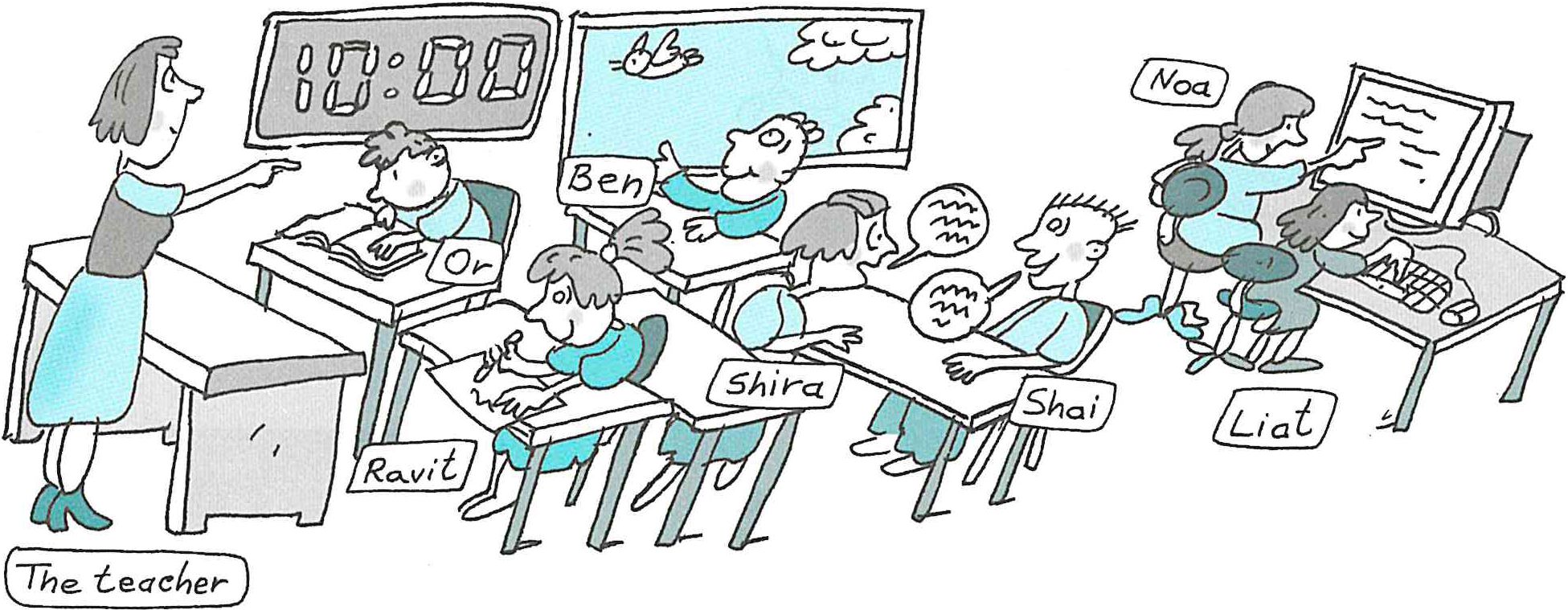
כיתת לימוד
1. a. The teacher is standing.
b. The teacher is sitting.
2. a. The pupils are standing.
b. The pupils are sitting.
3. a. Or is writing.
b. Or is reading.
4. a. Ravit is writing.
b. Ravit is reading.
5. a. Ben is looking at a bird.
b. Ben is tying his shoe.
6. a. Noa and Liat are working at their desks (שולחנות כתיבה).
b. Noa and Liat are working at the computer.
7. a. Shira and Shai are reading.
b. Shira and Shai are talking.
*141*
SPELLING RULES כללי איות
איך מציתים את ה-verb פלוס ing.
לרוב הפעלים פשוט מוסיפים ing.
דוגמה:
work פלוס ing - working
כאשר הפועל מסתיים ב-e משמיטים את ה-e האחרונה ומוסיפים ing.
דוגמה:
dance פלוס ing - dancing
drive פלוס ing - driving
כאשר הפועל מסתיים בצורה הבאה - אות עיצורית, אות ניקוד ובסוף שוב אות עיצורית, כופלים את האות האחרונה ואז מוסיפים ing.
כדי לזכור מבנה זה נקרא לו "סנדוויץ" - "ענע" (עיצור, ניקוד, עיצור)
תזכורת
אות ניקוד - a, e, i, o, u
אות עיצורית - אות רגילה, לא אות ניקוד
דוגמה:
s (עיצור) i (ניקוד) t (עיצור)
sit - sitting
stop - stopping
אבל שימו לב!
אם לפני האות האחרונה יש שתי אותיות ניקוד לא כופלים את האות האחרונה.
דוגמה:
eat - eating
sleep - sleeping
אם הפםועל מסתיים באותיות x, y, w, לא כופלים את האות האחרונה.
דוגמה:
mix - mixing
play - playing
row - rowing
כאשר הפועל מסתיים באותיות ie הופכים אותן ל-y ומוסיפים ing.
דוגמה:
die - dying
lie - lying
tie - tying
זכרו!
no change, drop the e, double the last letter, change ie to y
בלי שינוי, e משמיטים את ה-, מכפילים את האות האחרונה, y ל-ie הופכים
work פלוס ing, dance פלוס ing, sit פלוס ing, lie פלוס ing
working, dancing, sitting, lying
*142*
3 Put each verb into the correct flower pot, according to the spelling rules.
כתבו כל פועל בעציץ המתאים לפי כללי האיות.
crying, jumping, lying, smiling, putting, sweeping, going, riding, running, making, growing, fixing, writing, winning, dying, cleaning, stopping, coming, sitting, washing, loving, baking, tying
no change: crying,
--
,
--
drop the e:
--
,
--
double the last letter:
--
,
--
change the ie to y:
--
,
--
*143*
Use verbs from the verb bank.
התבוננו בתמונות והשלימו את המשפטים בעזרת פעלים מתוך מחסן הפעלים.
is sitting, is crying, is raining, are eating, is shining, are watching, is eating, are dancing, is singing, is reading
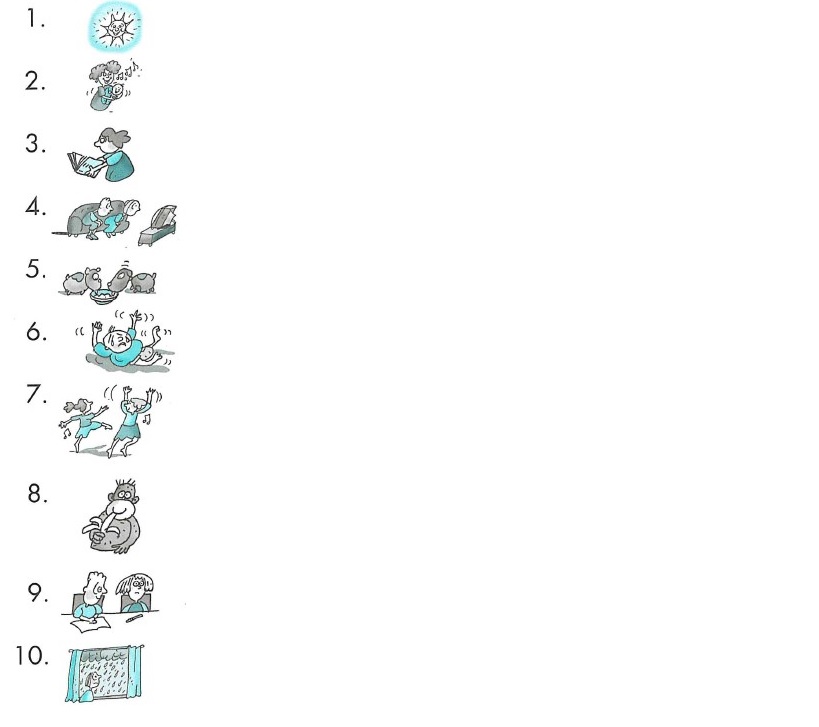
בספר 10 ציורים
1. Look! The sun is shining now.
2. The mother
--
to the baby.
3. Anat
--
an interesting book.
4. My parents
--
TV this afternoon.
5. Look! The puppies
--
.
6. Listen! The baby
--
. Is he hungry?
7. What are the girls doing? They
--
in the schoolyard.
8. What’s the monkey doing? It
--
a banana.
9. Today Doron
--
next to Hila.
10. It
--
today. I don’t want to go out.
*144*
5 a. Complete these sentences.
Use the correct form of the Present Progressive.
Choose am, is or are and remember the spelling rules.
השלימו את המשפטים. השתמשו בצורה הנכונה של ה- Present Progressive. בחרו am, is או are וזכרו את כללי האיות.
1. I am drinking coffee now. (drink)
2. We
--
TV at the moment. (watch)
3. I
--
for a test now. (study)
4. Your dog
--
in the yard! (run)
5. My parents
--
to a movie right now. (go)
6. The teacher
--
at our tests. (look)
7. You
--
a very nice sweater today. (wear)
8. My mother on the phone now. (talk)
9. My friends
--
to my house today. (come)
10. Today father
--
the house. (clean)
11. My sister and I
--
the cat to the vet (וטרינר) now. (take)
12. You and your friends
--
a lot of noise.(make) Please be quiet.
13. I
--
a good book this week. (read)
14. My brothers
--
lessons this year. (take)
*145*
b. Complete these sentences.
Use the correct form of the Present Progressive. Choose am, is or are and remember the spelling rules.
השלימו את המשפטים. השתמשו בצורה הנכונה של ה- Present Progressive. בחרו am, is או are וזכרו את כללי האיות.
1. The pupils are speaking English now. (speak)
2. I
--
a vase for my mother. (make)
3. Tom
--
the flowers in the vase. (put)
4. Listen! The bus
--
! (come)
5. Look! The balloon
--
away. (fly)
6. The lesson
--
now. Be quiet! (begin)
7. You
--
very well, Betty! (work)
8. The workers
--
a new building in our street. (build)
9. I
--
some tomatoes for the spaghetti. (cut) Is that OK, Mom?
10. The driver
--
the bus! (stop) What’s the problem?
11. That’s not true. You
--
to me. (lie)
12. Where is your mother? She's at the supermarket. She
--
for food. (shop)
*146*
השעה שמונה בערב. משפחת שמיר בבית. מה עושה כל אחד מבני המשפחה? התבוננו בתמונה והשלימו את המשפטים בעזרת מחסן הפעלים.
sit, run, read, do, talk, watch, play, work
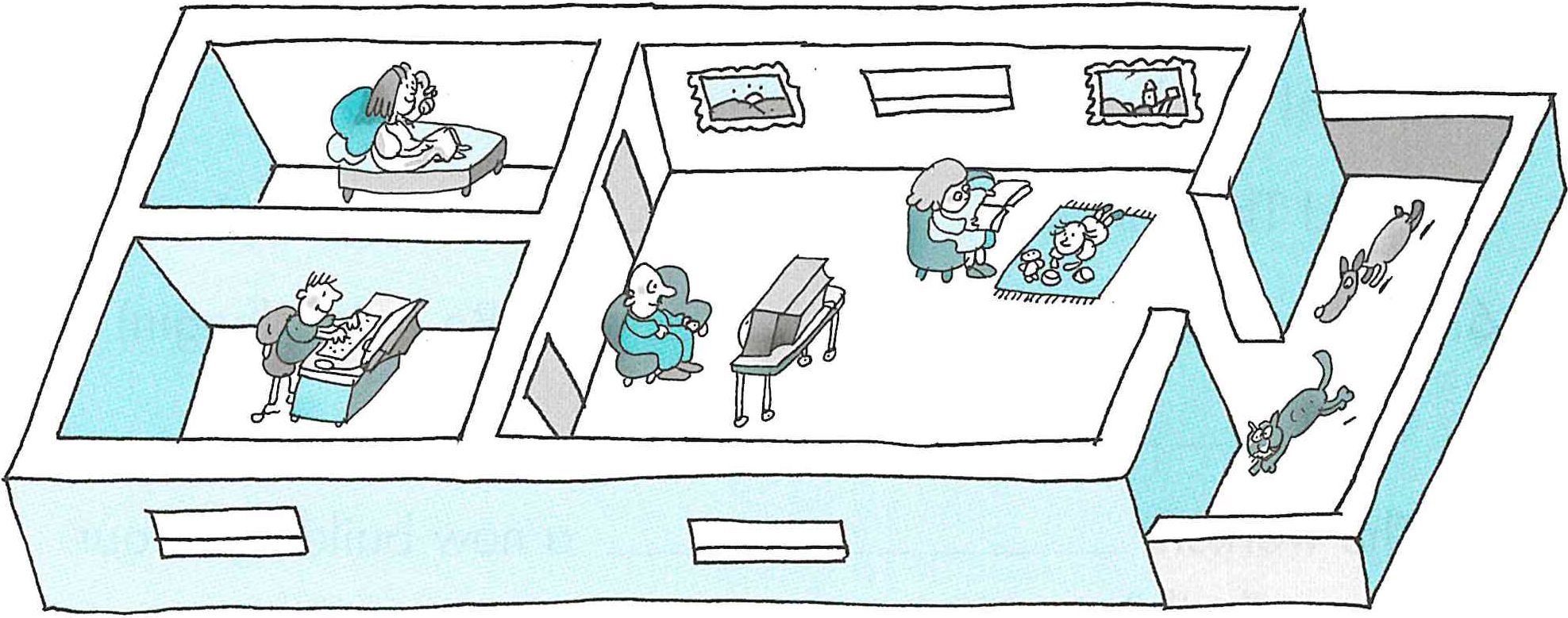
בית ובו כלב רודף אחרי חתול בחצר, איש צופה בטלויזיה בסלון, אישה קוראת ספר ולידה תינוק משחק על השטיח גם בסלון, ילדה מדברת בטלפון בחדר ובחדר אחר ילד מכין שיעורי בית
It’s eight o'clock in the evening. The Shamir family is at home. Mr. Shamir (1) is watching TV in the living room. Mrs. Shamir is in the living room too. She (2)
--
on a chair and she (3)
--
a book. Little Orna is on the carpet. She (4)
--
with her toys. Yaniv is in his room. He (5)
--
on the computer. He (6)
--
his homework. Dafna is in her room. She (7)
--
on the phone with her friend Orit. Poncho, the dog, (8)
--
after Zizi, the cat, in the yard. Good night to the Shamir family!
*147*
WORD ORDER סדר מילים
with the Present Progressive
איך בנוי משפט ב-?Present Progressive
צורת החיוב - Positive
משפט צורת החיוב בנוי בצורה הבאה:
1. נושא המשפט (מישהו או משהו עליהם המשפט מספר)
2. פועל עזר to be
3. הפועל העיקרי פלוס ing
4. מושא (שעונה על השאלה "את מי" או "את מה", "למי", "עם מי" וכו')
5. ביטוי זמן
נושא המשפט, פועל עזר, ing הפועל העיקרי פלוס , מושא, ביטוי זמן
Subject, to be, verb plus ing, object, time expression
I, am, reading, a book, now.
She, is, taking, tennis, this year.
7 Word Order
Put the words into the correct order.
סדרו את המילים בסדר הנכון.
זכרו! בתחילת המשפט אות גדולה, בסוף המשפט נקודה.
1. are learning / English / you / now
You are learning English now.
2. this week / my neighbors / a party / are having
--
3. is eating / lunch (ארוחת צהרים) / Peter / now
--
4. the kids / at the moment / football / are playing
--
*148*
5. Nili / now / is doing / her homework
--
6. Look! / is climbing / the tree / the monkey
--
7. Listen! / is ringing / the phone
--
8. today / am wearing / a sweater / I
--
9. is learning / our class / Arabic / this year
--
10. is baking / a cake / today / my mother
--
11. an exercise (תרגיל) / I / now / am doing
--
12. sentences / we / today / are writing
--
*149*
WORD ORDER סדר מילים
with the Present Progressive
צורת השלילה Negative
כאשר אנו אומרים מה לא קורה עכשיו אנו משתמשים בצורת השלילה.
אנו פשוט מוסיפים not אחרי הפועל עזר to be (am, is, are) ואחריו הפועל העיקרי בתוספת ing.
נושא המשפט, פועל עזר, not, ingהפועל העיקרי פלוס , המשך המשפט
Subject, to be, not, verb plus ing,
--
I, am, not, reading, now.
דוגמה:
I am not running now. אני לא רץ עכשיו
It is not raining today. לא יורד גשם היום
We are not playing tennis today. אנחנו לא משחקים טניס היום
You are not going to school today. אתה לא הולך לבית ספר היום
אפשר להשתמש בצורות מקוצרות (כמו שכבר למדנו לגבי הפועל .(to be
שימו לב! אפשר לבחור בין שתי צורות מקוצרות, חוץ מאשר עם I.
I am not running - I’m not running
He is not running - He isn’t running or He’s not running
She is not reading - She isn’t reading or She’s not reading
It is not raining - It isn’t raining or It’s not raining
We are not playing - We aren’t playing or We’re not playing
You are not running - You aren’t running or You’re not running
They are not listening - They aren’t listening or They’re not listening
*150*
8 Write these sentences with short forms. If there are two forms, write both.
כתבו את המשפטים עם צורות מקוצרות. אם יש שתי צורות כתבו את שתיהן.
1. She is not swimming now.
She isn’t swimming now.
She’s not swimming now.
2. I am not reading a magazine now.
--
3. You are not listening to me!
--
--
4. They are not looking at me.
--
--
5. I am not talking on the phone now.
--
6. We are not going on a picnic today.
--
--
7. The sun is not shining now.
--
--
8. He is not playing on the computer now.
--
--
*151*
9 Match A and B.
התאימו בין A ל-B.
A
1. I am sitting in the living room. f
2. Aunt Lili is coming from France.
--
3. The men are working.
--
4. Miri is cleaning her room.
--
5. The teachers are standing in the classrooms.
--
6. Boaz is watching a movie.
--
B
a. They aren’t standing in the yard.
b. She isn’t cleaning the kitchen.
c. They aren’t resting.
d. She isn’t coming from England.
e. He isn’t watching sports on TV.
f. I am not sitting in the kitchen.
10 Complete the sentences with the negative form of the Present Progressive. Use the long form and one of the short forms. Use the verbs in the brackets.
השלימו את המשפטים בצורת השלילה של ה- Present Progressive. כתבו צורות מלאות וגם אחת הצורות המקוצרות. השתמשו בפעלים בסוגריים.
1. He is not crying (not cry).
He isn’t crying or He’s not crying (not cry).
2. Sarit is eating now. She
--
(not do) homework.
Sarit is eating now. She
--
(not do) homework.
*152*
3. The birds are flying in the sky.
They
--
(not sit) in the tree.
They
--
(not sit) in the tree.
4. The man is wearing short pants (מכנסיים קצרים).
He
--
(not wear) jeans.
He
--
(not wear) jeans.
5. Mother is driving the car.
Father
--
(not drive) the car today.
Father
--
(not drive) the car today.
11 Write a negative sentence. Use a short form.
Use the words in brackets.
כתבו משפט שלילה. השתמשו במילים שבסוגריים. השתמשו באחת מן הצורות המקוצרות.
1. We are playing chess now. (Monopoly)
We aren’t playing Monopoly.
We’re not playing Monopoly.
2. I am going to school now. (the park)
--
3. We are studying for the English test now. (history)
--
4. George is riding a bike. (horse)
--
5. I am painting the wall. (table)
--
*153*
6. Susan is playing the accordion. (guitar)
--
7. The kids are running in the yard. (living room)
--
8. Hila is drinking water now. (milk)
--
9. My dog is eating meat now. (vegetables)
--
10. The sun is shining now. (moon)
--
YES/NO QUESTIONS שאלות כן / לא
with the Present Progressive
כאשר רוצים לדעת אם פעולה מסוימת מתרחשת עכשיו או לא, שואלים שאלת כן / לא ב-Present Progressive.
באנגלית מתחילים את השאלה בפועל עזר to be (am, is, are) בהתאם לנושא. אחריו בא הנושא ואחריו הפועל העיקרי בתוספת ing.
הנה סדר המילים בשאלת כן / לא ב- Present Progressive.
to be פעל עזר, Subject נושא המשפט, Verb פלוס ing הפועל העיקרי, המשך המשפט
Am, I, sitting, now?
Are, you, we, they, sitting, now?
Is, he, she, it, sitting, now?
דוגמה:
Am I sitting here? האם אני יושב פה
Are you going? האם אתה הולך
Is he crying? האם הוא בוכה
*154*
שימו לב!
תמיד מתחילים את השאלה ב-.to be
- מתחילים ב- am כאשר הנושא הוא I.
- מתחילים ב- Is כאשר הנושא הוא he, she, it או כל שם עצם ביחיד.
דוגמה:
Is John working now?
Is the girl working now?
Is the computer working now?
מתחילים ב- Are כאשר הנושא הוא you, we וגם כאשר הנושא הוא They או כל שם עצם ברבים.
דוגמה:
Are you working now?
Are the boys working now?
Are the computers working now?
12 Circle the correct answer.
הקיפו את התשובה הנכונה.
1. Am / Is / Are you listening to me?
2. Am / Is / Are he making noise?
3. Am / Is / Are Doreen coming to the party?
5. Am / Is / Are mother cooking in the kitchen?
6. Am / Is / Are I bothering (מפריע) you?
7. Am / Is / Are the puppy jumping on the sofa?
8. Am / Is / Are Mr. Kenan working today?
9. Am / Is / Are your parents coming to our party?
10. Am / Is / Are the lion sleeping under the tree?
11. Am / Is / Are the teacher reading a story now?
*155*
13. Fill in the missing helping verb. Use Am, Is or Are.
הוסיפו את פועל העזר החסר. השתמשו ב- Am, Is, Are.
זכרו להתחיל את השאלה באות גדולה.
1. Are you waiting for me?
2.
--
Eyal going home now?
3.
--
your parents working today?
4.
--
the donkey standing in the yard now?
5.
--
Mrs. Gefen staying here this week?
6.
--
your brother coming with us?
7.
--
the computer working now?
8.
--
you sitting in your room now?
9.
--
the woman running to the bus stop?
10.
--
Dani and Or talking to you now?
14 Word Order
Put the words into the correct order to make questions.
כתבו את המילים בסדר הנכון לשאלות כן / לא.
1. the kids / Are / now / playing
Are the kids playing now?
2. that woman / Is / crying
--
3. a banana / you / eating / Are
--
4. now / Tom / Is / swimming
--
5. working / Is / the TV / today
--
6. Is / a song now / singing / she
--
7. the moon / shining / now / Is
--
8. Are / coming / you / with me now
--
9. the guitar / playing / Peter / Is
--
10. now / Are / dancing / the girls
--
*156*
15 Orly is sick. She is at home. She is talking to her friend Dalit on the telephone. Dalit is at the circus. Read Dalit’s answers and then fill in Orly’s questions. Use the question bank.
אורלי חולה. היא בבית. היא מדברת בטלפון עם דלית שנמצאת בקרקס. קראו את תשובותיה של דלית והשלימו את שאלותיה של אורלי. השתמשו במחסן השאלות.
Are you at the circus now?
Are the elephants dancing?
Are the monkeys jumping too?
Are there lions in the arena (זירה)?
Are the lions lying down?
Orly: Hi Dalit. Are you at the circus now?
Dalit: Yes, I am. It’s wonderful!
Orly:
--
Dalit: Yes, there are lions in the arena.
Orly:
--
Dalit: No, they aren’t lying down. They are jumping through fire rings (טבעות אש). It’s exciting. Now they are leaving. Some monkeys are coming in.
*157*
Orly:
--
Dalit: No, they aren’t jumping. They are riding bicycles. And here are the elephants!
Orly:
--
Dalit: Yes, they are dancing. How did you guess?
Orly: I love circus shows. I always go to the circus when it comes to town. Thanks for calling, Dalit. I feel I am at the circus with you!
*158*
UNIT 15: WH QUESTIONS
אתם זוכרים? אנחנו שואלים שאלות Wh כאשר אנו רוצים לדעת מידע על פעולה - מה, מתי, למה, איפה, איך או מי. באנגלית קוראים להם Wh questions כיוון שהן מתחילות באותיות Wh (פרט ל-.(how
הנה מילות השארלה שבאות בתחילת שאלות Wh:
how - איך
what - מה
who - מי
when - מתי
how much - כמה
where - איפה
how many - כמה
why - למה
שימו לב לשאלות המיחדות האלו!
- כמה how many (כשאפשר לספור)
דוגמה:
כמה ילדים נמצאים פה?
How many children are there here?
- כמה how much (כשאי אפשר לספור)
דוגמה:
כמה סוכר אתה רוצה בתה שלך?
How much sugar do you want in your tea?
- מה השעה
What time is it?
- איזה צבע זה
What color is this?
איך בונים שאלת Wh? שאלת Wh היא כמו שאלת yes/no (ראה פרק 4) עם תוספת של מילת השאלה בהתחלה.
Wh Questions with TO BE
Wh word, Verb, Subject, The rest of the sentence
Whמילת , פועל, נושא, המשך המשפט
--
, Is, the book, on the table?
Where, is, the book,
--
--
, Am, I, pupil?
What, am, I?,
--
--
, Are, your parents, here?
Why, are, your parents, here?
דוגמה:
Positive: The book is on the table
Yes/No Question: Is the book on the table?
Wh Question: Where is the book?
*159*
1 Circle the correct Wh word.
הקיפו בעיגול את מילת השאלה המתאימה.
1. What / Why / Where are your friends? Outside, in the yard.
2. When / How / Why is the baby in bed so early? Because he is sick.
3. How / Why / Where is the weather today? Warm and sunny.
4. What / When / Why is the exam? On Monday.
5. Why / Where / How are my glasses? On your head.
6. When / Where / How are you today? I'm fine, thank you.
7. When / What / How time is it now? It's 5:00.
8. Why / What / Where are the dogs outside? Because they are going for a walk.
9. Why / How / When are you home every day? At about 5:00 p.m.
10. Where / How / What is green and long? A cucumber.
11. How much / How many / Why are the oranges? Two shekels a kilo.
12. How much / How many / Where pupils are there in your class? 40.
13. What / Why / When are there no children in the yard? Because it’s late at night.
14. Why / When / What, is yellow and in the sky? The sun.
15. What / When / Where color is your shirt? Green.
*160*
2 Translate these sentences into English. Use the table below.
תרגמו את המשפטים לאנגלית בעזרת הטבלה למטה.
Where, When, Who, is, the teachers’ room?, your English teacher?, the game?, the supermarket?,
--
How much, How, Why, What, is, are, the tomatoes, you, the water, there, the teacher, in your bag?, in the pool today?, today?, angry?, sad?
1. איפה הסופרמרקט?
Where is the supermarket?
2. למה אתה עצוב?
--
3. מי המורה לאנגלית שלך?
--
4. איך המים בבריכה היום?
--
5. למה המורה כועסת?
--
6. איפה נמצא חדר המורים?
--
7. כמה עולות העגבניות היוום?
--
8. מתי המשחק?
--
9. מה יש לך בתיק?
--
*161*
3 Complete the sentences with the correct Wh word.
Use What, Why, Where, Who, When, How, How much, or How many.
השלימו את המשפטים בעזרת מילות השאלה המתאימות.
1. What is your name? My name is Ruth.
2.
--
is the car park? It’s under the building.
3.
--
bananas are there? There are five bananas in the basket.
4.
--
is the capital of England? London.
5.
--
are you sad today? Because of the test.
6.
--
is at the door? It's my friend.
7.
--
boys are there in your class? 20.
8.
--
is the test? In an hour.
9.
--
is in those boxes over there? New TV sets.
10.
--
is the basketball game tonight? At 8:00.
11.
--
are you from? Australia.
12.
--
are you today? I'm fine, thank you.
13.
--
are you so happy today? Because it's my birthday.
14.
--
is your Math teacher? Mr. Marks.
15.
--
are the windows shut? Because it’s cold.
16.
--
is the new book? On the shelf over there.
17.
--
is a bus ticket (כרטיס אוטובוס)? Five shekels.
*162*
Wh Questions with PRESENT PROGRESSIVE
גם במשפטים עם Present Progressive שאלת wh דומה לשאלת כן / לא (yes/no question) שכבר למדנו בפרק 14. אנחנו פשוט מציבים את מילת ה- wh בתחילת שאלת כן / לא.
מתחילים עם מילת Wh, אחריה בא הפועל עזר to be (am, is, are) ואחריו בא נושא המשפט, ואחריו בא הפועל העיקרי בתוספת ing.
Wh word, to be, Subject, verb פלוס ing,
--
Wh מילת, פועל עזר, נושא המשפט, הפועל העיקרי, המשך המשפט
--
, Is, Tom, going, to school now?
Where, is, Tom, going?,
--
--
, Are, the kids, playing, football?
What, are, the kids, playing?,
--
דוגמה:
Positive: Tom is going to school now. The kids are playing.
Yes/No Question: Is Tom going to school now? Are the kids playing?
Wh Question: Where is Tom going now? What are the kids playing?
4 Match A and B.
התאימו את התשובות לשאלות.
A
1. Where are you going? d.
2. What are you doing?
--
3. Why is Doreen crying?
--
4. When is the teacher coming?
--
5. What is the dog eating?
--
6. When are you leaving?
--
7. How many books are you taking?
--
B
a. We are leaving now.
b. Look! She is coming now.
c. It's eating meat.
d. I’m going to my friend Uri's house.
e. I’m taking three.
f. Because she is sad about her sick cat.
g. I am listening to music.
*163*
5 Complete the questions. Use the verbs in brackets.
השתמשו בפעלים שבסוגריים כדי להשלים את השאלות.
1. What are the kids doing? (do)
2. What
--
you
--
? (write)
3. What
--
you
--
? (read)
4. Where
--
the movie
--
? (play)
5. Where
--
she
--
? (go)
6. Why
--
you
--
? (shout)
7. When
--
Tom
--
? (go)
8. What
--
the boys
--
? (do)
9. Who
--
you
--
? (call)
10. Why
--
the dog
--
? (bark (נובח))
11. How many movies
--
they
--
?(take)
התבוננו בתמונות והשלימו את שאלות ה-.Wh

ילדות שוחות בבריכה
1. Where are the girls swimming?
The girls are swimming in a pool.
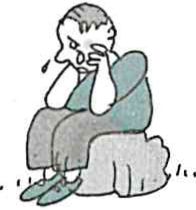
איש יושב ובוכה
2. Why
--
He is crying because he is sad.
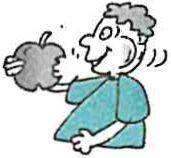
ילד אוכל תפוח גדול
3. What
--
Sam is eating an apple.

תינוק בתוך לול
4., Where
--
The baby is sleeping in his bed.
*164*
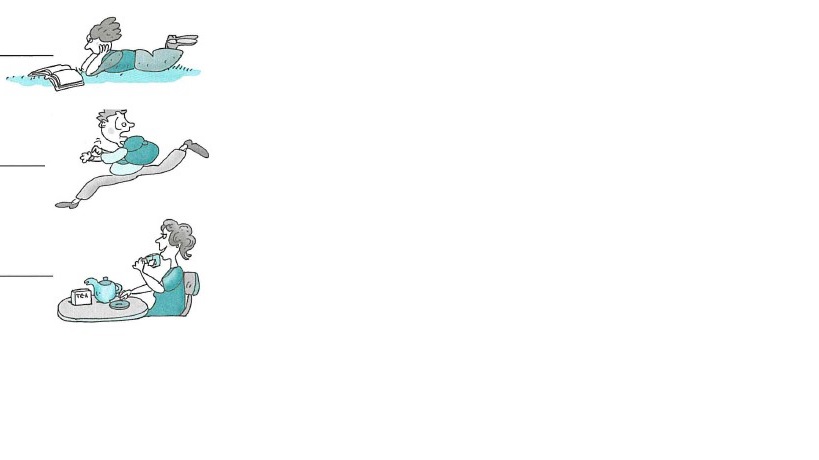
ילדה שוכבת וקוראת ספר. ילד רץ. אישה שותה תה.
5. What
--
Ronit is reading a book.
6. Why
--
I am running because I’m late for school!
7. What
--
Barbara is drinking tea.
Wh Questions with PRESENT SIMPLE
גם במשפטים עם Present Simpleשאלת wh דומה לשאלת כן / לא (yes/no question) שכבר למדנו בפרק 12. אנחנו פשוט מציבים את מילת ה-wh בתחילת משפט שאלה כן / לא.
מתחילים עם מילת wh, אחריה יבואו הפועל עזר do או does (בהתאם לשם הגוף), נושא המשפט, הפועל בצורתו הבסיסית (verb 1) ובסוף המשך המשפט.
Wh מילת, פועל עזר, נושא, הפועל העיקרי, המשך המשפט
Wh word,
--
, Subject, Verb 1,
--
--
, Do, they, live, in Haifa?
Where, do, they, live?
--
, Does, Tom, live, in Jerusalem?
Where, does, Tom, live?
דוגמה:
Positive: They live in Haifa., Tom lives in Jerusalem.
Yes/No Question: Do they live in Haifa?, Does Tom live in Jerusalem?
Wh Question: Where do they live?, Where does Tom live?
*165*
7 Complete the questions with the correct Wh word.
השלימו את השאלות בעזרת מילת ה- Whהנכונה.
1. Where does your dog sleep at night? Under my bed.
2.
--
does your father work? In a bank.
3.
--
does she always smile? She's a happy person.
4.
--
do you come home from school? At 2:00 o'clock.
5.
--
do your sisters do in the evening? Watch TV.
6.
--
do you usually go on vacation (חופשה)? To Eilat.
7.
--
does Anat wake up in the morning? At 7:00.
8.
--
do you drink in the morning? A cup of tea.
9.
--
does the library open? At 10:00 every day.
10.
--
does your father drive? He's a very careful (זהיר) driver.
11.
--
do you always come late? I live far away.
8 Put the words into the correct order to make Wh questions.
Remember to use capital letters.
כתבו את המילים בסדר הנכון בשאלות Wh. זכרו להשתמש באותיות גדולות בתחילת המשפטים.
1. live / Dan / does / where
Where does Dan live?
2. you / do / every afternoon / what / do
--
3. birds / sing / do / why
--
4. the doctor / how / talk / does / to you
--
5. begin / does / the party / when
--
*166*
6. your mother / does / buy / what / in the supermarket
--
7. shine / the sun / does / when
--
8. glasses of milk / how many / every day / you / do / drink
--
9. how much / a bus ticket / does / cost
--
10. buy / where / you / your books / do
--
9 Golan has a new pen pal on the Internet.
Complete their questions. Use the question bank.
לגולן יש חבר חדש איתו הוא מתכתב באינטרנט. השלימו את השאלות שלו. היעזרו במחסן השאלות.
What color belt do you have?
What’s your name?
What do you do in your spare time? (בזמנך החופשי)
How old are you?
Where do you live?
And what’s your name?
Golan: Hi! (1) What’s your name?
Yaniv: My name's Yaniv. (2)
--
Golan: I’m Golan. (3)
--
Yaniv: I’m 10 years old.
*167*
Golan: Me too. (4)
--
Yaniv: I live in Ramat HaGolan. And you?
Golan: I live in Sderot. (5)
--
Yaniv: I like to play on the computer. Do you like playing on the computer too?
Golan: Yes, I do, but I don’t have much time. I go to Judo practice three times a week.
Yaniv: (6)
--
Golan: I have a black belt.
Yaniv: Wow! Good for you! I have to go now. Bye!
Golan: Bye. Let’s talk tomorrow.
Yaniv: OK.
*168*
UNIT 16: FINAL REVIEW
1 Fill in the blanks with a, an or the.
השלימו את המשפטים עם a, an, או the.
1. Tom is a good pupil.
2. There are two birds on that tree.
--
black bird is a raven (עורב).
3. I need
--
new pair of gym shoes (נעלי התעמלות).
4.
--
woman who lives in that house is from Canada.
5. Look! There is
--
old dog in the middle of the road.
6. I have
--
new bicycle. Do you want to see it?
7. I have two dresses.
--
red dress is new.
--
blue dress is old.
8. Where is
--
key to your house?
9. We need
--
ambulance. There is
--
sick child in
--
school.
10.
--
man with the big hat is my father. He is
--
astronaut.
*169*
Complete the sentences. Use a, an or some.
השלימו את המשפטים. השתמשו ב-a, an, או some.
This is my room. There is (1) a bed in my room. The bed is near the wall. There is (2)
--
shelf on the wall. There are (3)
--
books on the shelf. There is (4)
--
desk near the window. There are (5)
--
notebooks on the desk. There is (6)
--
paper in the drawer. There is (7)
--
umbrella in (8)
--
box near the table. My clothes are in the closet. There is (9)
--
CD player near my bed. There are (10)
--
CDs on it.
I like my room!
3 Fill in the missing pronoun. Use I, you, he, she, we or they.
Use capital letters where necessary.
השלימו את שמות הגוף הנכונים. השתמשו ב- I you he she weאו they.
השתמשו באותיות גדולות במקומות הנכונים.
Tali, Efrat, Koby and Eitan live in Sderot. (1) They are friends. (2)
--
are 11 years old. (3)
--
go to Avivim School. Koby says, “(4)
--
are good friends. (5)
--
are together all the time.”
Efrat is a beautiful girl. (6)
--
has long black hair. Tali is beautiful too, but (7)
--
has blond hair. Koby is short. (8)
--
is only one and a half meters tall. Eitan is a tall boy. (9)
--
is one meter 70 centimeters tall.
Eitan says, “One day (10)
--
will be a basketball player.” Efrat and Tali say, “Yes, (11)
--
will be a basketball player and (12)
--
will come to see you play.”
*170*
4 Read this passage. Then complete the questions and answer them.
קראו את הקטע הבא. השלימו את השאלות וענו עליהן.
Tom and Kate
Tom and Kate are brother and sister. They live in Australia. They live on a big farm. On their farm they have sheep, hens, ducks, cows and horses. Tom and Kate have horses. Star is the name of Tom’s horse, and Wind is the name of Kate’s horse. Tom and Kate ride their horses every day.
Because their farm is far from town (רחוק מכל עיר), they don’t have many friends and neighbors.
But they have a computer and they use the Internet. They have a lot of pals on the Internet.
Tom and Kate don’t go to school either! They study with the help of television and the Internet. They also have a teacher. She comes to their house every Monday and helps them with their lessons.
Tom and Kate have homework and tests, just like the kids in the city, but their daily (יום יומי) life is different.
1. Question: Where do Tom and Kate live?
Answer: They live on a farm in Australia.
2. Question: Do
--
animals on their farm?
Answer:
--
*171*
3. Question:
--
the name of Tom’s horse?
Answer:
--
4. Question: Who
--
“Wind”?
Answer:
--
5. Question: Why don't
--
many friends?
Answer:
--
6. Question: Do
--
a computer?
Answer:
--
7. Question:
--
to school?
Answer:
--
8. Question: How
--
study?
Answer:
--
9. Question: When
--
the teacher
--
to their house?
Answer:
--
5 Complete the sentences with am, is, are, have or has.
השלימו את המשפטים בעזרת am, is, are, have או has.
1. My uncle Avi is a truck driver. He
--
a big truck. He
--
very busy.
2. That little girl
--
so happy today. She
--
a new doll!
3. We
--
many books in our library. Some books
--
in Hebrew, and some
--
in English.
*172*
5. I
--
not well today. I
--
a cold.
6. My brother looks exactly like me. We both
--
blue eyes and brown hair.
7. Our car
--
two doors. It
--
(not) four doors.
8. We
--
a new house. There
--
five rooms in it. It
--
a very beautiful house.
9. I
--
a good friend. Her name
--
Rachel.
10. We
--
so happy to see you! We
--
so much to talk about.
11. The movie
--
about a brother and sister. They
--
a little dog.
13. Tina
--
the best dancer in the group.
14. I
--
(not) an earache (כאב אזניים). I
--
a stomach-ache (כאב בטן).
15. The flowers
--
in the vase, but there
--
no water in the vase.
16. Paul
--
(not) a car. He
--
a bike.
17. I
--
excited. Today my birthday.
18. I
--
good news. We
--
going on a picnic today!
19. I
--
a dog. I
--
(not) a cat.
20. Aviva is only ten years old. She
--
(not) eleven.
*173*
6 Fill in the correct preposition. Choose from the list.
השלימו את המשפטים בעזרת מילות היחס שברשימה.
between, behind, in front of, in, on, under, near
1. Remez School is on Remez Street.
2. Why are you sitting so far away? Please sit
--
me!
3. Look at the hat
--
the boy’s head.
4. There are some vegetables
--
the refrigerator (מקרר). Let’s make a salad!
5. My shoes are not on the bed. They are
--
the bed.
6. Do you live
--
your school or far from it?
7. At school I sit
--
Tami and Rami. Tami is on my left and Rami is on my right.
8. The little boy is afraid. He is hiding
--
the door.
9. Every morning the teacher stands
--
the class and says “Good morning, class”.
10. Ron is first. Aviv is second. Aviv is standing
--
Ron.
11. My cat sleeps
--
the sofa
--
the living room.
12. You are standing
--
the TV. Please move. I can’t see anything.
13. Don’t put your legs
--
the table, please.
14. Is there a supermarket
--
here? I want to buy some food.
15. Put the flowers
--
the vase
--
the table.
16. We have a big garden behind the house and a small garden
--
the house.
*174*
17. Where is my notebook? Maybe it’s
--
all those books on your table?
18. Noa lives at 10 Allenby Street and Shai lives at 14 Allenby Street. I live at 12 Allenby,
--
Noa and Shai.
7 Change the sentences into plural.
הפכו את המשפטים לרבים.
1. This is a special computer program.
These are special computer programs.
2. This is a new sweater.
--
3. There is a beautiful house on our street.
--
on our street.
4. There is a fox over there.
--
5. I see a man at the bus-stop.
--
at the bus-stop.
6. There is a woman in the shop.
--
7. Put your pen down!
--
8. Where is my shoe?
--
9. Tom has a new fish.
--
*175*
10. The child is playing in the yard.
--
in the yard.
11. The lady is looking for you.
--
12. There is a potato and a tomato on the plate.
--
on the plate.
13. Tom’s sheep is eating grass.
--
14. I see a little gray mouse.
--
15. The knife is very sharp.
--
8 Fill in the correct possessive pronoun. Use my, your, his, her, its, our, or their.
Remember capital letters where needed.
השלימו את המשפטים עם תארי שייכות הנכונים. זכרו לכתוב אותיות גדולות היכן שנחוץ.
1. I have a new friend. His name is Dvir.
2. We both have schoolbags.
--
schoolbag is red and
--
schoolbag is green.
3. This is Tom and this is
--
brother Sa’ar.
4. We have a garden. We like
--
garden.
5. The kids are playing with
--
new toys. They are very happy.
6. Look at the tiger!
--
eyes are yellow!
7. My neighbors have a son.
--
son is my best friend.
*176*
8. Kelly has long hair.
--
hair is shiny.
9. Dan and Ron, please put
--
bags on the floor.
10. Look! The elephant is washing
--
back (גב).
9 Fill in the missing prepositions. Use in, on or at.
השלימו את המשפטים בעזרת מילות היחס in, on אוat .
תזכורת:
ימים ותאריכים - on
שעות - at
חודשים ושנים - in
1. I have a guitar lesson on Monday at six o'clock.
2. Gina’s birthday is
--
May.
3. Our party is
--
the fifth of July.
4.
--
the morning I have a glass of orange juice.
5. It’s so hot
--
noon.
6.
--
night the stars shine.
7. I was born
--
1995.
8. The lesson starts
--
nine o'clock.
9. Do you have an English lesson
--
Sundays?
10.
--
midnight Cinderella goes back home!
11. I usually do my homework
--
the afternoon.
12. The party isn’t
--
the 1st of July. It’s
--
the 4th.
*177*
10 Complete the paragraph with the correct form of the verbs in the Present Simple.
השלימו את הקטע בעזרת פעלים בצורה הנכונה של ה-Present Simple.
Ben wants (1. want) to be a football player. He
--
(2. come) home from school at two o'clock every day. First he
--
(3. have) lunch. Then he
--
(4. do) his homework. He
--
(5. not sleep) in the afternoon. At five o'clock he
--
(6. go) to football practice (אימון) with his friends. They
--
(7. run) and
--
(8. kick) the ball and
--
(9. have) a good time. When Ben
--
(10. get back (חוזר)) home, he usually
--
(11. watch) football games. He
--
(12. try) to learn new things about football all the time.
*178*
11. Complete the paragraph with the correct form of the verbs in the Present Progressive.
השלימו את הקטע בעזרת פעלים בצורה הנכונה של ה-Present Progressive.
Happy Birthday Mother!
Today is my mother’s birthday. She isn’t at home now. She is working (1. work) today. We
--
(2. make) a surprise birthday party for her.
Father
--
(3. make) some salads in the kitchen. Uri
--
(4. set) the table. He
--
(5. put) a yellow tablecloth (מפת שולחן) on the table.
Iris
--
(6. bring) a vase for the flowers. I
--
(7. bake) a cake. It’s in the oven. Mmm... it smells good!
Even Rex, our dog
--
(8. do) something. He
--
(9. run) around the house and he
--
(10. bark). Does he know it’s Mother's birthday?
Well, everything is ready now.
We
--
(11 wait) for Mother to get home from work.
Happy Birthday Mom!
*179*
12 These are not good English sentence. Rewrite them. Use ‘s or ‘ according to the rules you learned.
שפרו את המשפטים בעזרת ‘s או ‘ לפי הכללים שלמדתם.
1. This is the son of Sarit.
This is Sarit’s son.
2. Look at the toys of the baby.
--
3. Show me the notebook of Rami.
--
4. The shirts of the boys are green.
--
5. I like the rooms of the children.
--
6. These are the shoes of my mother.
--
7. Where are the sweaters of the men?
--
8. Is this the room of your sons?
--
9. I like the songs of that group.
--
10. I want to sit in the seat of the driver.
--
11. The office of my doctor is near my house.
--
12. The daughter of our teacher is in our school.
--
*180*
FINAL TEST
Test Yourself
Circle the correct answer. Use your teacher’s Answer Key to check your answers and give yourself 2 points for each correct one.
בחנו את עצמכם. הקיפו את התשובה הנכונה. השתמשו בדף התשובות של המורה כדי לבדוק את תשובותיכם. תנו לעצמכם 2 נקודות על כל תשובה נכונה.
Good luck!
1. My name is
--
and I am ten years old.
a. oren
b. oREN
c. Oren
2.
--
is the capital of
--
a. Jerusalem, Israel
b. Jerusalem, Israel
c. jerusalem, israel
3. My brother
--
brown eyes and black hair.
a. is
b. have
c. has
4. The baby
--
in bed now.
a. are
b. has
c. is
5. Let’s meet
--
five o'clock.
a. at
b. on
c. in
6. My birthday is
--
April the first.
a. at
b. in
c. on
7. This is Miri.
--
is my best friend.
a. He
b. She
c. Her
*181*
8.I
--
one brother and one sister.
a. has
b. am
c. have
9. I have a new pen.
--
is black.
a. He
b. She
c. It
10. We live in Holon.
--
house is in the center of town.
a. We
b. Our
c. Their
11. We always
--
to the news.
a. listen
b. listens
c. are listening
12. Please wash your hands.
--
are dirty.
a. They
b. Their
c. It
13. There are twenty
--
in the room.
a. man
b. men
c. child
14. The
--
are in the classroom now.
a. pupil
b. pupil’s
c. pupils
15.
--
is that book? Is it expensive?
a. How many
b. Who
c. How much
16. Be quiet! My sister
--
a. sleeps
b. is sleeping
c. sleeping
17.
--
a TV set in the living room.
a. There is
b. There are
c. Have
18.
--
ice cream in the refrigerator.
a. There are
b. Has
c. There is
*182*
19.
--
teachers in my school are nice.
a. The
b. A
c. An
20. I see
--
beautiful bird on the tree.
a. a
b. an
c. is
21.
--
birthday is in
--
a. My, September
b. My, september
c. my, September
22.
--
you at home now?
a. Do
b. Are
c. Does
23.
--
Dan study Arabic?
a. Does
b. Do
c. Is
24. You
--
my best friend.
a. has
b. be
c. are
25. I
--
have a brother.
a. am not
b. don’t
c. doesn’t
26. Look at those houses.
--
very big.
a. They
b. It’s
c. They’re
27. The kids
--
in the pool right now.
a. swim
b. swims
c. are swimming
28. I always
--
to sleep early at night.
a. go
b. goes
c. am going
29. Is this
--
book?
a. you
b. your
c. it
*183*
30. The yard is
--
the school.
a. on
b. behind
c. between
31. Tom doesn’t
--
English.
a. speak
b. speaks
c. speaking
32. We
--
live on the same street.
a. aren’t
b. doesn’t
c. don’t
33. There is
--
old tree in my garden.
a. a
b. an
c. the
a. The
b. A
c. An
35.
--
are you crying?
a. Who
b. Why
c. What
36. What time
--
now?
a. it is
b. is
c. is it
37.
--
do you live?'
a. Where
b. What time
c. When
38. What
--
?
a. your name is
b. is your name
c. your name
39. Dana has a dog.
--
name is Sugar.
a. Her dog’s
b. Her dogs’
c. She
40. That
--
hair is very long.
a. girl
b. girl’s
c. girls'
*184*
41. Look at this table.
--
legs are very short.
a. It’s
b. His
c. Its
42. They have a nice school.
--
school is big.
a. There
b. Their
c. Our
43. Sivan
--
two sisters.
a. is
b. has
c. have
44. The sports teacher
--
our class every Monday.
a. teaches
b. teach
c. is teaching
45. Vegetables
--
good for you.
a. is
b. does
c. are
46. This test
--
very easy.
a. are
b. is
c. am
47. My school
--
near my house.
a. isn’t
b. aren’t
c. doesn’t
48. That
--
hat is funny.
a. men’s
b. man’s
c. man
49.
--
you happy today?
a. Am
b. Are
c. Do
50. We don't go to school
--
Saturday.
a. on
b. at
c. in
End